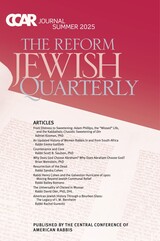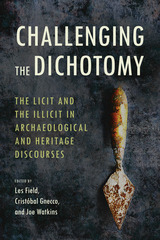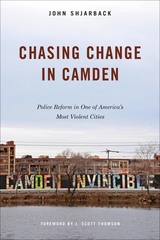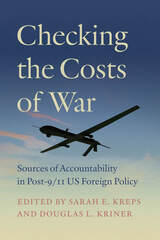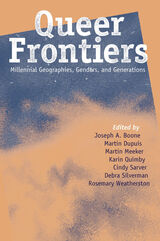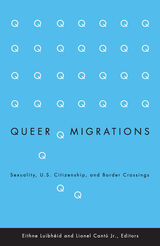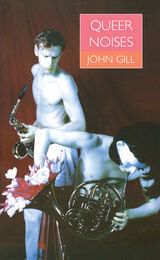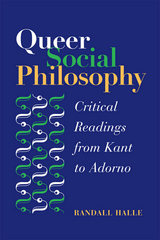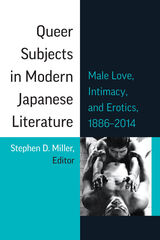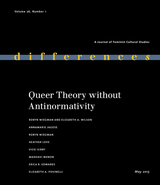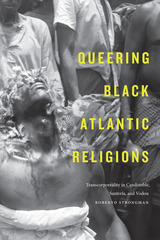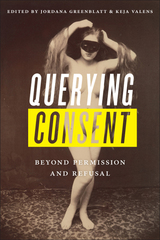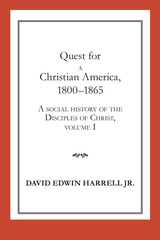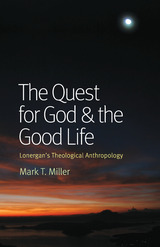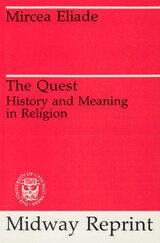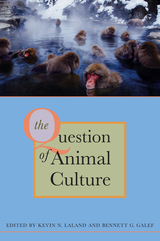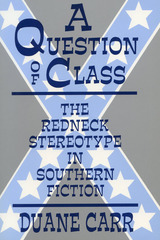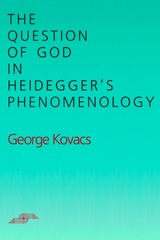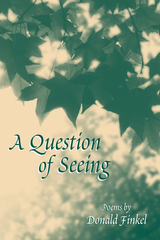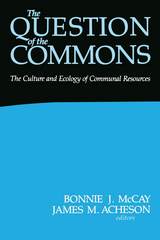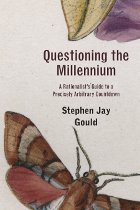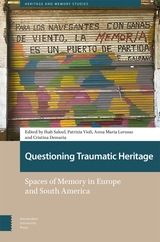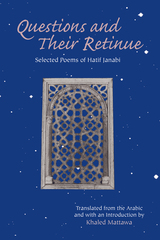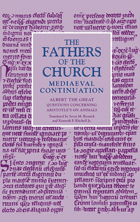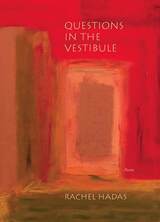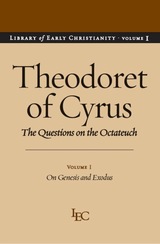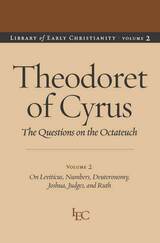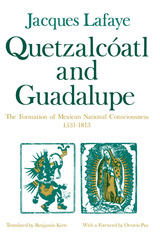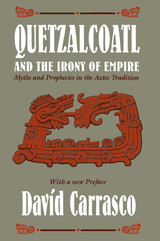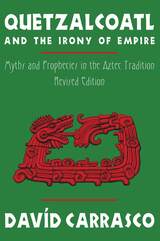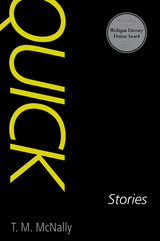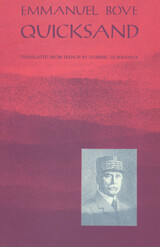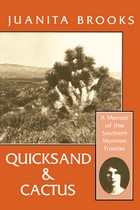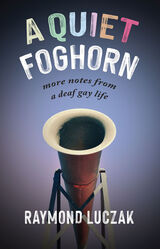 Queer Comrades: Gay Identity and Tongzhi Activism in Postcolonial China
Hongwei Bao
National University of Singapore Press, 2018 A quantum leap in scholarship on queer China, offering keen insights on the PRC’s socialist legacy. This very timely, well-written and insightful exploration of gay identity and queer activism in the People’s Republic of China today is more than a study of ‘queer China’ through the lens of male homosexuality; it also examines identity, power and governmentality in contemporary China, as shaped by China’s historical conditions and contemporary situations. The book offers in-depth analysis of recent queer history and contemporary cultural texts plus a queer Marxist analysis of sexual identity and social movements in contemporary China, where ideological negotiations between socialism and neoliberalism are constantly played out in the formation of public cultures and intimate spheres. In doing so, it critically assesses the role of Marxism and China’s socialist legacies in shaping sexual identity, queer popular culture and political activism. Although the first of its kind from a cultural studies perspective, this interdisciplinary study speaks to scholars working in disparate fields including anthropology, sociology, media studies, film studies, political theory, and Asian Studies.
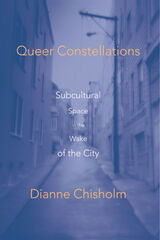 Queer Constellations: Subcultural Space In The Wake Of The City
Dianne Chisholm
University of Minnesota Press, 2004 Discovers parallels between modern gay and lesbian views of urban life and Benjamin’s Paris, “the capital of the nineteenth century” Queer Constellations investigates the dreams and catastrophes of recent urban history viewed through new queer narratives of inner-city life. The “gay village,” “gay mecca,” “gai Paris,” the “lesbian flaneur,” the “lesbian bohème”—these and other urban phantasmagoria feature paradoxically in this volume as figures of revolutionary utopia and commodity spectacle, as fossilized archetypes of social transformation and ruins of haunting cultural potential. Dianne Chisholm introduces readers to new practices of walking, seeing, citing, and remembering the city in works by Neil Bartlett, Samuel R. Delany, Robert Glück, Alan Hollinghurst, Gary Indiana, Eileen Myles, Sarah Schulman, Gail Scott, Edmund White, and David Wojnarowicz. Reading these authors with reference to the history, sociology, geography, and philosophy of space, particularly to the everyday avant-garde production and practice of urban space, Chisholm reveals how—and how effectively—queer narrative documentary resembles and reassembles Walter Benjamin’s constellations of Paris, “capital of the nineteenth century.” Considering experimental queer writing in critical conjunction with Benjamin’s city writing, the book shows how a queer perspective on inner-city reality exposes contradictions otherwise obscured by mythic narratives of progress.If Benjamin regards the Paris arcade as a microcosm of high capitalism, wherein the (un)making of industrial society is perceived retrospectively, in contemporary queer narrative we see the sexually charged and commodity-entranced space of the gay bathhouse as a microcosm of late capitalism and as an exemplary site for excavating the contradictions of mass sex. In Chisholm’s book we discover how, looking back on the ruins of queer mecca, queer authors return to Benjamin to advance his “dialectics of seeing;” how they cruise the paradoxes of market capital, blasting a queer era out of the homogeneous course of history.
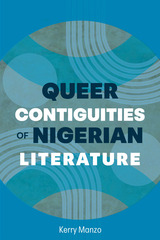 Queer Contiguities of Nigerian Literature
Kerry Manzo
Michigan State University Press, 2026 Queer Contiguities of Nigerian Literature explores how normative ideas of sex and gender have shaped the development of Nigerian literature. Tracing this influence from the rise of mid-twentieth-century modernist writing to the contemporary appearance of LGBTQIA literature, Kerry Manzo presents a new framework for understanding Nigerian literature, one in which sexuality and gender—or more specifically, their containment through national discourses of heteronormativity in colonial and postcolonial Nigeria—are central to its problematics and poetics. Drawing on interdisciplinary research and archival materials, including institutional records, personal letters, small publications, and other ephemera, Manzo illuminates the historical and material conditions that have placed limitations on the literary representation of women and sexual minorities and shaped the national masculine tradition of letters.
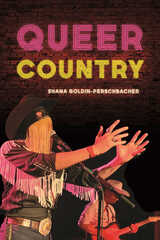 Queer Country
Shana Goldin-Perschbacher
University of Illinois Press, 2022 - A Variety Best Music Book of 2022
- A No Depression Most Memorable Music Book of 2022
- A Library Journal Best Arts and Humanities Book of 2022
- A Pitchfork Best Music Book of 2022
- A Boot Best Music Book of 2022
- A Ticketmaster Best Music Book of 2022
- A Happy Magazine Best Music Book of 2022
- Woody Guthrie First Book Award winner
- Awarded a Certificate of Merit in the 2023 ARSC Awards for Excellence in Historical Recorded Sound Research in the category Best Historical Research in Country, Folk, Roots, or World Music.
Though frequently ignored by the music mainstream, queer and transgender country and Americana artists have made essential contributions as musicians, performers, songwriters, and producers. Queer Country blends ethnographic research with analysis and history to provide the first in-depth study of these artists and their work. Shana Goldin-Perschbacher delves into the careers of well-known lesbian artists like k.d. lang and Amy Ray and examines the unlikely success of singer-songwriter Patrick Haggerty, who found fame forty years after releasing the first out gay country album. She also focuses on later figures like nonbinary transgender musician Rae Spoon and renowned drag queen country artist Trixie Mattel; and on recent breakthrough artists like Orville Peck, Amythyst Kiah, and chart-topping Grammy-winning phenomenon Lil Nas X. Many of these musicians place gender and sexuality front and center even as it complicates their careers. But their ongoing efforts have widened the circle of country/Americana by cultivating new audiences eager to connect with the artists’ expansive music and personal identities. Detailed and one-of-a-kind, Queer Country reinterprets country and Americana music through the lives and work of artists forced to the margins of the genre's history.
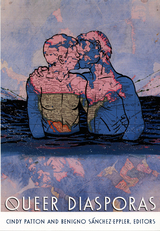 Queer Diasporas
Cindy Patton and Benigno Sánchez-Eppler, eds.
Duke University Press, 2000 Queer Diasporas presents essays that explore how sexuality and sexual identity change when individuals, ideologies, and media move across literal and figurative boundaries. Speaking from a diverse range of ethnic, racial, and national sites, the contributors to this volume illustrate how queer identity in particular is affected in ways that are as varied and nuanced as the cultural, social, and physical environments themselves.
Incorporating literary analysis, ethnographic research, and theories of diaspora, migration, and transnationalism, the essays in this volume address an impressive range of topics, from the divergent medical and epidemiological understandings of the AIDS pandemic to 1950s lesbian pulp fiction. While one chapter focuses on the appropriation of religious ceremony by gay Filipino immigrants in New York City, another investigates the implicit connection between Jewishness and homosexuality in the work of Freud. The gendering of domestic roles in food preparation and consumption in Japanese society gives way to a discussion of Cuban and Jamaican homoeroticism as seen in the works of Reinaldo Arenas and Claude McKay. Chilean author D’Halmar’s orientalization of Spain as queer space and the hybrid nature of queer ‘zine culture in Quebec are the subject of others. The collection concludes with a monologue by “Walid,” a young gay Arab living in the occupied territory, whose sexual and national identities change according to his sexual and social needs.
Illuminating the complex nature of queerness in the postmodern world, Queer Diasporas contributes to the advancement of gay and lesbian studies. It will be important to those working in cultural, literary, and postcolonial studies.
Contributors. Michele Aina Barale, Daniel Boyarin, Sandra Buckley, Rhonda Cobham, Amir Sumaka’i Fink, Marcie Frank, Martin F. Manalansan IV, Sylvia Molloy, Cindy Patton, Jacob Press, Jennifer Robertson, Benigno Sánchez-Eppler
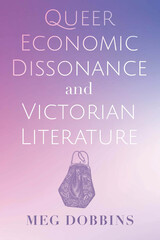 Queer Economic Dissonance and Victorian Literature
Meg Dobbins
Ohio State University Press, 2022 In nineteenth-century Britain, the word queer was associated not only with same-sex desire but also with irregular forms of financial association and trust. Queer Economic Dissonance and Victorian Literature centers this forgotten facet of queer by recovering an alternative economic narrative of the Victorian period: one of economic excess, waste, debt, and downward mobility. Drawing on insights from intersectional queer theory and economic literary criticism, as well as astute readings of works by Charles Dickens, Charlotte Brontë, Mary Seacole, George Eliot, and Oscar Wilde, Meg Dobbins argues that eccentric economic figures like Black entrepreneurs, childless widows, and working-class benefactors represent sites of queerness––forms of economic desire, identity, strategy, or relation that become sites of friction within the developing social and institutional norms of nineteenth-century capitalism. Dobbins argues that Victorian authors document the everyday economic struggles of those cast aside, left behind, and fundamentally transfigured by modern capitalism. Rather than rejecting capitalist ideology, these authors queer socioeconomic norms, shedding light on the provocative ways Victorians made capitalism livable, and even pleasurable. In this way, Queer Economic Dissonance rearticulates the link between erotic and economic forms of dissonance in capitalist society.
 Queer Emergent: Scandalous Stories from the Twilight of AIDS in Peru
Justin Perez
Duke University Press, 2025 In Queer Emergent, Justin Perez explores how advances in HIV prevention work alongside broader economic and political shifts in global health to shape queer subjectivities. Drawing on ethnographic research among gay and transgender communities in urban Amazonian Peru, Perez describes how queer social worlds emerge through scandalous storytelling—a practice of exaggerating and embellishing stories about everyday life that transgresses social norms and hierarchies. Perez shows that through such storytelling, gay and transgender communities contested the assumptions of global HIV prevention’s shift from the provision of costly antiretrovirals to the mitigation of social conditions like discrimination and stigma. He argues that the global ambition to “End AIDS” by 2030 is not just a technical project oriented at ending the epidemic, but also a project of sexual subjectification and ongoing social transformation. By taking seriously the scandalous stories that gay and transgender Peruvians circulated as they responded to new forms of HIV prevention, Perez reveals how they imagine possibilities of what could be as the effort to end AIDS continues to play out in the present.
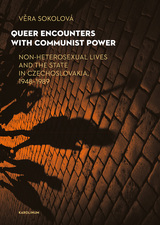 Queer Encounters with Communist Power: Non-Heterosexual Lives and the State in Czechoslovakia, 1948-1989
Vera Sokolová
Karolinum Press, 2019 In the repressive context of East European Communist regimes, how did young girls and boys come to realize their sexuality? What did they do with that self-awareness—and later on, as adults, what strategies did they employ in their dealings with the regime? Queer Encounters with Communist Power answers these questions as it interweaves a groundbreaking queer oral history project with meticulous, original research into the discourse on homosexuality and transsexuality in Czechoslovakia from 1948 to 1989.
Contrary to expectations, the book reveals that despite the Czechoslovak Communist regime’s brutality in many areas of life, the state did not carry out a hateful or seditious campaign against homosexual and non-heterosexual people. Rather, the official state sexology offices functioned from the late 1970s onward as essentially the first gay clubs in socialist Czechoslovakia. Interweaving the memories of non-heterosexual Czech women born between 1929 and 1952, Věra Sokolová’s study both enriches and challenges existing scholarship on lesbian and gay history during this era, promising to radically change the way we view gender, sexuality, and everyday life during East European socialism.
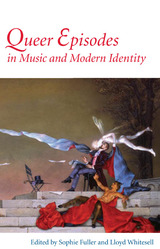 Queer Episodes in Music and Modern Identity
Edited by Sophie Fuller and Lloyd Whitesell
University of Illinois Press, 2001 Exploring the relationship between queer sexuality and music in the late nineteenth and early twentieth century Queer Episodes in Music and Modern Identity approaches modern sexuality by way of music. Through the hidden or lost stories of composers, scholars, patrons, performers, audiences, repertoires, venues, and specific works, this intriguing volume explores points of intersection between music and queerness in Europe and the United States in the years 1870 to 1950--a period when dramatic changes in musical expression and in the expression of individual sexual identity played similar roles in washing away the certainties of the past. Pursuing the shadowy, obscured tracks of queerness, contributors unravel connections among dissident identities and concrete aspects of musical style, gestures, and personae. Contributors are Byron Adams, Philip Brett, Malcolm Hamrick Brown, Sophie Fuller, Mitchell Morris, Jann Pasler, Ivan Raykoff, Fiona Richards, Eva Rieger, Gillian Rodger, Sherrie Tucker, and Lloyd Whitesell.
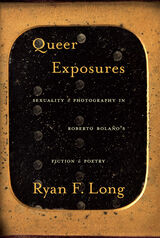 Queer Exposures: Sexuality and Photography in Roberto Bolaño’s Fiction and Poetry
Ryan Long
University of Pittsburgh Press, 2021 Roberto Bolaño (1953-2003) stands out among recent Latin American writers because of his unique combination of critical acclaim, popularity, and literary significance. Queer Exposures analyzes two central but understudied topics in Bolaño’s fiction and poetry: sexuality and photography. Moving beyond a consideration of how his texts represent these topics, Ryan F. Long demonstrates that, when considered in tandem, they form the basis for a new innovative and critical approach. Emphasizing the processes of exposure associated with photography and sexuality, especially queer sexuality, provides readers and scholars with a versatile method for comprehending Bolaño’s constellation of texts. With close readings of a broad range of texts, from poetry written just after his arrival in Spain in the late 1970s to his posthumously published novels, Queer Exposures concludes that an emphasis on sexuality and photography is essential for understanding how Bolaño’s texts function in dialogue with one another to elucidate and critique the interrelations of writing, visual representation, and power.
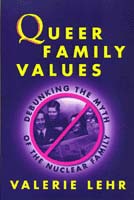 Queer Family Values
Valerie Lehr
Temple University Press, 1999 American culture is at war over "family values." And with the issue of gay and lesbian marriage often at the center of this discourse, notable thinkers like Andrew Sullivan, William Eskridge, Urvashi Vaid, and Torie Osborn have engaged in the battle. But why, Valerie Lehr asks, debate over the right of gays to take part in a socially defined institution designed to perpetuate inequalities among people?
The flaw in the fight for gay and lesbian marriage rights, argues Lehr in Queer Family Values, lies in its failure to call into question the forms of oppression -- gender, racial, and economic -- that lead society to privilege the nuclear family. Lehr calls for activists to counter conservative discourses that see the nuclear family -- what Lehr considers a socially defined institution that works to maintain, in various ways, inequalities among people -- as the only responsible and mature family alternative. She asks for an approach to family issues and individual liberty that challenges power rather than demands access to privilege. She advocates social policies that enhance the freedom of all people, not simply those gay and lesbian adults seeking to be part of the dominant vision of family in our society.
Analyzing recent works on family, gender, race, and class, Lehr shapes a theory of rights, freedom, and democracy that can liberate us from the strictures of conservative hegemony. She also provides practical examples of how activists can work for a more compassionate and caring society. She devotes a chapter, for example, to the responsibilities activists have to lesbian and gay youths, who -- unlike other children, who might find refuge from social injustice at home -- most often find in the traditional American home homophobia and isolation. Asserting that family care should be seen as a community function, Queer Family Values offers an alternative political strategy focused not on gaining rights, but on enhancing democracy and equality in private life.
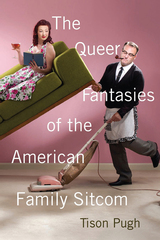 The Queer Fantasies of the American Family Sitcom
Pugh, Tison
Rutgers University Press, 2018 Winner of the 2019 John Leo and Dana Heller Award for the Best Work in LGBTQ Studies from the PCA The Queer Fantasies of the American Family Sitcom examines the evasive depictions of sexuality in domestic and family-friendly sitcoms. Tison Pugh charts the history of increasing sexual depiction in this genre while also unpacking how sitcoms use sexuality as a source of power, as a kind of camouflage, and as a foundation for family building. The book examines how queerness, at first latent, became a vibrant yet continually conflicted part of the family-sitcom tradition. Taking into account elements such as the casting of child actors, the use of and experimentation with plot traditions, the contradictory interpretive valences of comedy, and the subtle subversions of moral standards by writers and directors, Pugh points out how innocence and sexuality conflict on television. As older sitcoms often sit on a pedestal of nostalgia as representative of the Golden Age of the American Family, television history reveals a deeper, queerer vision of family bonds. Download open access ebook here.
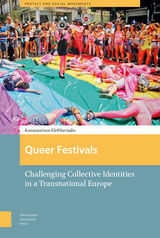 Queer Festivals: Challenging Collective Identities in a Transnational Europe
Edited by Konstantinos Eleftheriadis
Amsterdam University Press, 2018 To what extent is queer anti-identitarian? And how is it experienced by activists at the European level? At queer festivals, activists, artists and participants come together to build new forms of sociability and practice their ideals through anti-binary and inclusive idioms of gender and sexuality. These ideals are moreover channelled through a series of organisational and cultural practices that aim at the emergence of queer as a collective identity. Through the study of festivals in Amsterdam, Berlin, Rome, Copenhagen, and Oslo, Queer Festivals: Challenging Collective Identities in a Transnational Europe thoughtfully analyses the role of activist practices in the building of collective identities for social movement studies as well as the role of festivals as significant repertoires of collective action and sites of identitarian explorations in contemporary Europe.
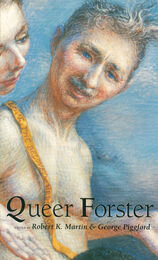 Queer Forster
Edited by Robert K. Martin and George Piggford
University of Chicago Press, 1997 This groundbreaking volume presents a radical revision of gay criticism and focuses on E. M. Forster's place in the emerging field of queer studies.
Many previous critics of Forster downplayed his homosexuality or read Forster naively in terms of gay liberation. This collection situates Forster within the Bloomsbury Group and examines his relations to major figures such as Henry James, Edward Carpenter, and Virginia Woolf. Particular attention is paid to Forster's several accounts of India and their troubled relation to the British colonial enterprise. Analyzing a wide range of Forster's work, the authors examine material from Forster's undergraduate writings to stories written more than a half-century later.
A landmark book for the study of gender in literature, Queer Forster brings the terms "queer" and "gay" into conversation, opening up a dialogue on wider dimensions of theory and allowing a major revaluation of modernist inventions of sexual identity.
Queer Frontiers: Millennial Geographies, Genders, and Generations
Edited by Joseph A. Boone, et.al.
University of Wisconsin Press, 2000 In the first collection of its kind, twenty-three scholars, artists, and critics forecast the impact of queer theory on the future of sexuality. Arguing that queer theory is poised to transform society’s perception of gender itself, this thoroughly interdisciplinary anthology locates itself at the forefront of various debates both inside and outside the academy.
From the history of gay and lesbian studies to the emergence of video bars, from an interview with playwright Cherrie Moraga to a photo record of 1950s gay Los Angeles, these original essays tackle the past, present, and future of queer sexuality from all directions. Queer Frontiers brings together the most vital and energetic voices around; whether promising young scholar or veteran of gay activism, each contributor is helping to move the debate into uncharted territory.
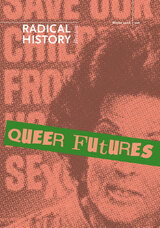 Queer Futures, Volume 2008
Kevin P. Murphy, Jason Ruiz, and David Serlin, eds.
Duke University Press In this special issue of Radical History Review, scholars and activists examine the rise of “homonormativity,” a lesbian and gay politics that embraces neoliberal values under the guise of queer sexual liberation. Contributors look at the historical forces through which lesbian and gay rights organizations and community advocates align with social conservatives and endorse family-oriented formations associated with domestic partnership, adoption, military service, and gender-normative social roles. Distinguished by its historical approach, “Queer Futures” examines homonormativity as a phenomenon that emerged in the United States after World War II and gained traction in the 1960s and 1970s. One essay compares Anita Bryant’s antigay campaigns in the late 1970s with those of current same-sex marriage proponents to show how both focus on the abstract figure of the “endangered child.” Another essay explores how the Gay and Lesbian Alliance Against Defamation’s organizational amnesia has shaped its often conservative agenda. Other essays include a Marxist reading of the transsexual body, an examination of reactionary politics at the core of the movement to repeal the U.S. military’s “don’t ask, don’t tell” policy, and a history of how “safe streets” patrols in the 1970s and 1980s became opportunities for urban gentrification and community exploitation. Contributors. Anna M. Agathangelou, Daniel Bassichis, Aaron Belkin, Nan Alamilla Boyd, Maxime Cervulle, Vincent Doyle, Roderick A. Ferguson, Christina Hanhardt, Dan Irving, Regina Kunzel, Patrick McCreery, Kevin P. Murphy, Tavia Nyong’o, Jason Ruiz, David Serlin, Tamara L. Spira, Susan Stryker, Margot D. Weiss
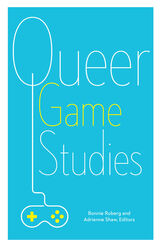 Queer Game Studies
Bonnie Ruberg
University of Minnesota Press, 2017 Video games have developed into a rich, growing field at many top universities, but they have rarely been considered from a queer perspective. Immersion in new worlds, video games seem to offer the perfect opportunity to explore the alterity that queer culture longs for, but often sexism and discrimination in gamer culture steal the spotlight. Queer Game Studies provides a welcome corrective, revealing the capacious albeit underappreciated communities that are making, playing, and studying queer games. These in-depth, diverse, and accessible essays use queerness to challenge the ideas that have dominated gaming discussions. Demonstrating the centrality of LGBTQ issues to the gamer world, they establish an alternative lens for examining this increasingly important culture. Queer Game Studies covers important subjects such as the representation of queer bodies, the casual misogyny prevalent in video games, the need for greater diversity in gamer culture, and reading popular games like Bayonetta, Mass Effect, and Metal Gear Solid from a queer perspective. Perfect for both everyday readers and instructors looking to add diversity to their courses, Queer Game Studies is the ideal introduction to the vast and vibrant realm of queer gaming. Contributors: Leigh Alexander; Gregory L. Bagnall, U of Rhode Island; Hanna Brady; Mattie Brice; Derek Burrill, U of California, Riverside; Edmond Y. Chang, U of Oregon; Naomi M. Clark; Katherine Cross, CUNY; Kim d’Amazing, Royal Melbourne Institute of Technology; Aubrey Gabel, U of California, Berkeley; Christopher Goetz, U of Iowa; Jack Halberstam, U of Southern California; Todd Harper, U of Baltimore; Larissa Hjorth, Royal Melbourne Institute of Technology; Chelsea Howe; Jesper Juul, Royal Danish Academy of Fine Arts; merritt kopas; Colleen Macklin, Parsons School of Design; Amanda Phillips, Georgetown U; Gabriela T. Richard, Pennsylvania State U; Toni Rocca; Sarah Schoemann, Georgia Institute of Technology; Kathryn Bond Stockton, U of Utah; Zoya Street, U of Lancaster; Peter Wonica; Robert Yang, Parsons School of Design; Jordan Youngblood, Eastern Connecticut State U.
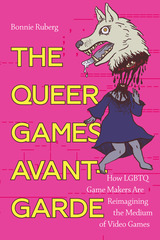 The Queer Games Avant-Garde: How LGBTQ Game Makers Are Reimagining the Medium of Video Games
Bonnie Ruberg
Duke University Press, 2020 In The Queer Games Avant-Garde, Bonnie Ruberg presents twenty interviews with twenty-two queer video game developers whose radical, experimental, vibrant, and deeply queer work is driving a momentous shift in the medium of video games. Speaking with insight and candor about their creative practices as well as their politics and passions, these influential and innovative game makers tell stories about their lives and inspirations, the challenges they face, and the ways they understand their places within the wider terrain of video game culture. Their insights go beyond typical conversations about LGBTQ representation in video games or how to improve “diversity” in digital media. Instead, they explore queer game-making practices, the politics of queer independent video games, how queerness can be expressed as an aesthetic practice, the influence of feminist art on their work, and the future of queer video games and technology. These engaging conversations offer a portrait of an influential community that is subverting and redefining the medium of video games by placing queerness front and center.
Interviewees:
Ryan Rose Aceae, Avery Alder, Jimmy Andrews, Santo Aveiro-Ojeda, Aevee Bee, Tonia B******, Mattie Brice, Nicky Case, Naomi Clark, Mo Cohen, Heather Flowers, Nina Freeman, Jerome Hagen, Kat Jones, Jess Marcotte, Andi McClure, Llaura McGee, Seanna Musgrave, Liz Ryerson, Elizabeth Sampat, Loren Schmidt, Sarah Schoemann, Dietrich Squinkifer, Kara Stone, Emilia Yang, Robert Yang
Queer Gothic
George E. Haggerty
University of Illinois Press, 2000
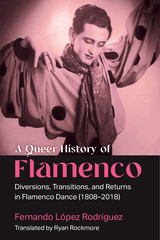 A Queer History of Flamenco: Diversions, Transitions, and Returns in Flamenco Dance (1808–2018)
Fernando López Rodríguez, translation by Ryan Rockmore
University of Michigan Press, 2024 A Queer History of Flamenco offers a groundbreaking exploration of flamenco through the lenses of queer theory and cultural studies. Previous histories have provided a largely distorted image about why, where, and how people have done flamenco—as well as who has performed flamenco. Yet feminists, transvestites, butches, femmes, the Spanish Roma, disabled people, guiris, and “incomprehensible” artists have been determined to do things differently without giving up their flamenco status. In this skillful translation of his book Historia queer del flamenco, Fernando López Rodríguez draws on diverse archival materials as well as his own lived experience and artistic practice, unearthing queer flamenco histories, voices, and perspectives that were previously unknown, avoided, or purposely hidden.
Tracing flamenco’s development from its birth up to the contemporary era, the book places flamenco within significant historical periods such as the Spanish Civil War, Franco’s dictatorship, the transition to democracy, and the economic crisis of 2008, up to contemporary performances of the late 2010s. In taking a queer approach to History, the author abandons antiquated debates about purities and impurities; anecdotes about the lives of artists that are completely detached from their processes of creation; and myths about geniuses who seem to make art alone and completely detached from their collaborators and the historical, social, economic and artistic moment in which they lived. A Queer History of Flamenco is not only about the present and the queerness of people living, performing, or creating in it, but also about flamenco’s past in which so many queer artists and practices and their lives have remained unearthed and unaddressed.
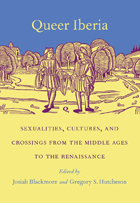 Queer Iberia: Sexualities, Cultures, and Crossings from the Middle Ages to the Renaissance
Josiah Blackmore and Gregory S. Hutcheson, eds.
Duke University Press, 1999 Martyred saints, Moors, Jews, viragoes, hermaphrodites, sodomites, kings, queens, and cross-dressers comprise the fascinating mosaic of historical and imaginative figures unearthed in Queer Iberia. The essays in this volume describe and analyze the sexual diversity that proliferated during the period between the tenth and the sixteenth centuries when political hegemony in the region passed from Muslim to Christian hands. To show how sexual otherness is most evident at points of cultural conflict, the contributors use a variety of methodologies and perspectives and consider source materials that originated in Castilian, Latin, Arabic, Catalan, and Galician-Portuguese. Covering topics from the martydom of Pelagius to the exploits of the transgendered Catalina de Erauso, this volume is the first to provide a comprehensive historical examination of the relations among race, gender, sexuality, nation-building, colonialism, and imperial expansion in medieval and early modern Iberia. Some essays consider archival evidence of sexual otherness or evaluate the use of “deviance” as a marker for cultural and racial difference, while others explore both male and female homoeroticism as literary-aesthetic discourse or attempt to open up canonical texts to alternative readings. Positing a queerness intrinsic to Iberia’s historical process and cultural identity, Queer Iberia will challenge the field of Iberian studies while appealing to scholars of medieval, cultural, Hispanic, gender, and gay and lesbian studies. Contributors. Josiah Blackmore, Linde M. Brocato, Catherine Brown, Israel Burshatin, Daniel Eisenberg, E. Michael Gerli, Roberto J. González-Casanovas, Gregory S. Hutcheson, Mark D. Jordan, Sara Lipton, Benjamin Liu, Mary Elizabeth Perry, Michael Solomon, Louise O. Vasvári, Barbara Weissberger
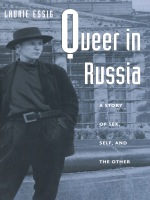 Queer in Russia: A Story of Sex, Self, and the Other
Laurie Essig
Duke University Press, 1999 In Queer in Russia Laurie Essig examines the formation of gay identity and community in the former Soviet Union. As a sociological fieldworker, she began her research during the late 1980s, before any kind of a public queer identity existed in that country. After a decade of conducting interviews, as well as observing and analyzing plays, books, pop music, and graffiti, Essig presents the first sustained study of how and why there was no Soviet gay community or even gay identity before perestroika and the degree to which this situation has—or has not—changed.
While male homosexual acts were criminalized in Russia before 1993, women attracted to women were policed by the medical community, who saw them less as criminals than as diseased persons potentially cured by drug therapy or transsexual surgery. After describing accounts of pre-perestroika persecution, Essig examines the more recent state of sexual identities in Russia. Although the fall of communism brought new freedom to Russian queers, there are still no signs of a mass movement forming around the issue, and few identify themselves as lesbians or gay men, even when they are involved in same-sex relations. Essig does reveal, however, vibrant manifestations of gay life found at the local level—in restaurants, discos, clubs, and cruising strips, in newspapers, journals, literature, and the theater. Concluding with a powerful exploration of the surprising affinities between some of Russia’s most prominent nationalists and its queers, Queer in Russia fills a gap in both Russian and cultural studies.
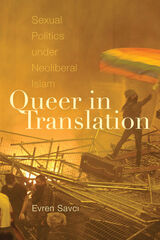 Queer in Translation: Sexual Politics under Neoliberal Islam
Evren Savci
Duke University Press, 2021 In Queer in Translation, Evren Savcı analyzes the travel and translation of Western LGBT political terminology to Turkey in order to illuminate how sexual politics have unfolded under Recep Tayyip Erdoğan's AKP government. Under the AKP's neoliberal Islamic regime, Savcı shows, there has been a stark shift from a politics of multicultural inclusion to one of securitized authoritarianism. Drawing from ethnographic work with queer activist groups to understand how discourses of sexuality travel and are taken up in political discourse, Savcı traces the intersection of queerness, Islam, and neoliberal governance within new and complex regimes of morality. Savcı turns to translation as a queer methodology to think Islam and neoliberalism together and to evade the limiting binaries of traditional/modern, authentic/colonial, global/local, and East/West—thereby opening up ways of understanding the social movements and political discourse that coalesce around sexual liberation in ways that do justice to the complexities both of what circulates under the signifier Islam and of sexual political movements in Muslim-majority countries.
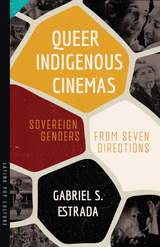 Queer Indigenous Cinemas: Sovereign Genders from Seven Directions
Gabriel S. Estrada
University of Arizona Press, 2026 The seven Indigenous directions—east, south, west, north, up, down, and center—provide a map of understanding gender in media history. In Queer Indigenous Cinemas, scholarGabriel S. Estrada offers an analysis of queer Indigenous media from the Americas, the Pacific, and the Caribbean. This groundbreaking work uses Indigenous directional space and sovereign mapping methods to uncover the emotional, spiritual, and cultural dimensions of queer Indigenous lives. The book’s seven chapters—each one of the directions—look closely at media such as cinema and streaming videos that draw on Indigenous concepts from diverse nations such as Diné, Caxcan, Kanaka Maoli, and Nehiyawak. Estrada discusses how the cinema brings into focus the ways that many Indigenous genders do not conform with the male/female binary, genders and sexualities that may or may not overlap with contemporary constructions of gay, lesbian, bisexual, transgender, intersex, and two-spirit (LGBTQI2+) identities. Highlighting the struggles and resistances of two-spirit peoples, Estrada’s analysis engages with films that represent the diverse and sovereign identities of queer Indigenous peoples. Estrada provides a framework for understanding how queer Indigenous media producers confront colonial trauma and reclaims space for the spiritual and bodily sovereignty of LGBTQI2+ peoples.
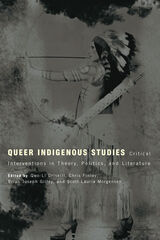 Queer Indigenous Studies: Critical Interventions in Theory, Politics, and Literature
Edited by Qwo-Li Driskill, Chris Finley, Brian Joseph Gilley, and Scott Lauria Morgensen
University of Arizona Press, 2011 “This book is an imagining.” So begins this collection examining critical, Indigenous-centered approaches to understanding gay, lesbian, bisexual, transgender, queer, and Two-Spirit (GLBTQ2) lives and communities and the creative implications of queer theory in Native studies. This book is not so much a manifesto as it is a dialogue—a “writing in conversation”—among a luminous group of scholar-activists revisiting the history of gay and lesbian studies in Indigenous communities while forging a path for Indigenouscentered theories and methodologies.
The bold opening to Queer Indigenous Studies invites new dialogues in Native American and Indigenous studies about the directions and implications of queer Indigenous studies. The collection notably engages Indigenous GLBTQ2 movements as alliances that also call for allies beyond their bounds, which the co-editors and contributors model by crossing their varied identities, including Native, trans, straight, non-Native, feminist, Two-Spirit, mixed blood, and queer, to name just a few.
Rooted in the Indigenous Americas and the Pacific, and drawing on disciplines ranging from literature to anthropology, contributors to Queer Indigenous Studies call Indigenous GLBTQ2 movements and allies to center an analysis that critiques the relationship between colonialism and heteropatriarchy. By answering critical turns in Indigenous scholarship that center Indigenous epistemologies and methodologies, contributors join in reshaping Native studies, queer studies, transgender studies, and Indigenous feminisms.
Based on the reality that queer Indigenous people “experience multilayered oppression that profoundly impacts our safety, health, and survival,” this book is at once an imagining and an invitation to the reader to join in the discussion of decolonizing queer Indigenous research and theory and, by doing so, to partake in allied resistance working toward positive change.
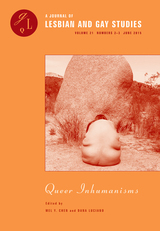 Queer Inhumanisms
Mel Y. Chen and Dana Luciano, special issue editors
Duke University Press This issue features a group of leading theorists from multiple disciplines who decenter the human in queer theory, exploring what it means to treat “the human” as simply one of many elements in a queer critical assemblage. Contributors examine the queer dimensions of recent moves to think apart from or beyond the human in affect theory, disability studies, critical race theory, animal studies, science studies, ecocriticism, and other new materialisms. Essay topics include race, fabulation, and ecology; parasitology, humans, and mosquitoes; the racialization of advocacy for pit bulls; and queer kinship in Korean films when humans become indistinguishable from weapons. The contributors argue that a nonhuman critical turn in queer theory can and should refocus the field’s founding attention to social structures of dehumanization and oppression. They find new critical energies that allow considerations of justice to operate alongside and through their questioning of the human-nonhuman boundary.
Mel Y. Chen, Associate Professor of Gender and Women’s Studies at the University of California, Berkeley, is the author of Animacies: Biopolitics, Racial Mattering, and Queer Affect, also published by Duke University Press. Dana Luciano is Associate Professor of English at Georgetown University. She is the author of Arranging Grief: Sacred Time and the Body in Nineteenth-Century America and editor, with Ivy G. Wilson, of Unsettled States: Nineteenth-Century American Literary Studies.
Contributors: Neel Ahuja, Karen Barad, Jayna Brown, Mel Y. Chen, Jack Halberstam, Jinthana Haritaworn, Myra Hird, Zakiyyah Iman Jackson, Eileen Joy, Eunjung Kim, Dana Luciano, Uri McMillan, José Esteban Muñoz, Tavia Nyong’o, Jasbir K. Puar, Susan Stryker, Kimberly Tallbear, Jeanne Vaccaro, Harlan Weaver, Jami Weinstein
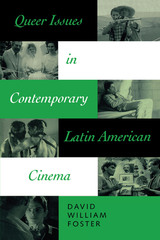 Queer Issues in Contemporary Latin American Cinema
By David William Foster
University of Texas Press, 2003 Viewing contemporary Latin American films through the lens of queer studies reveals that many filmmakers are exploring issues of gender identity and sexual difference, as well as the homophobia that attempts to defeat any challenge to the heterosexual norms of patriarchal culture. In this study of queer issues in Latin American cinema, David William Foster offers highly perceptive queer readings of fourteen key films to demonstrate how these cultural products promote the principles of an antiheterosexist stance while they simultaneously disclose how homophobia enforces the norms of heterosexuality. Foster examines each film in terms of the ideology of its narrative discourse, whether homoerotic desire or a critique of patriarchal heterosexism and its implications for Latin American social life and human rights. His analyses underscore the difficulties involved in constructing a coherent and convincing treatment of the complex issues involved in critiquing the patriarchy from perspectives associated with queer studies. The book will be essential reading for everyone working in queer studies and film studies. The films discussed in this book are: - De eso no se habla (I Don't Want to Talk about It)
- El lugar sin límites (The Place without Limits)
- Aqueles dois (Those Two)
- Convivencia (Living Together)
- Conducta impropia (Improper Conduct)
- The Disappearance of García Lorca
- La Virgen de los Sicarios (Our Lady of the Assassins)
- Doña Herlinda y su hijo (Doña Herlinda and Her Son)
- No se lo digas a nadie (Don't Tell Anyone)
- En el paraíso no existe el dolor (There Is No Suffering in Paradise)
- A intrusa (The Interloper)
- Plata quemada (Burnt Money)
- Afrodita (Aphrodite)
- Fresa y chocolate (Strawberry and Chocolate)
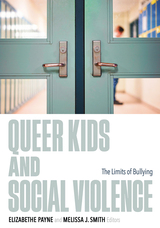 Queer Kids and Social Violence: The Limits of Bullying
Elizabethe Payne
University of Minnesota Press, 2025 Challenging the myths about LGBTQ+ kids and bullying: what it means to protect queer kids in schools
Conversations around LGBTQ+ kids in school have become dominated by the subject of bullying. Although this may be due to good-faith efforts to protect vulnerable students, Queer Kids and Social Violence demonstrates that a focus on bullying as acts of individual peer aggression fails to address the social norms that perpetuate the violence. Considering the broader contexts of bullying, this volume offers ways to engage with queer youth that are both more humanizing and more likely to create sustainable change. Essays by leading international scholars analyze how bullying discourse shapes policy and practice, using in-depth case studies, research findings, and examinations of political policy to guide readers through the various forms of violence, identity regulation, and identity erasure in schools. Offering conversation-shifting interventions to respond to a difficult and frightening political moment for LGBTQ+ youth, Queer Kids and Social Violence is a rounded, empathetic picture that does queer youth justice and points the way toward safer schools for all. Contributors: Ana María Amigo-Ventureira, Durell M. Callier, Cristyn Davies, Renée DePalma, Tania Ferfolja, Jessica Fields, Elliot Fonarev, Jen Gilbert, Tristan Gleason, Dominique C. Hill, Angela Ingram, Laurie Gutmann Kahn, Cris Mayo, Mollie McQuillan, Aoife Neary, C.J. Pascoe, Victoria Rawlings, EJ Renold, Jessica Ringrose, Kerry H. Robinson, Dorte Marie Søndergaard, Cris Townley, Jacqueline Ullman, Boni Wozolek. Retail e-book files for this title are screen-reader friendly with images accompanied by short alt text and/or extended descriptions.
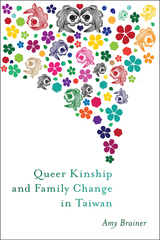 Queer Kinship and Family Change in Taiwan
Brainer, Amy
Rutgers University Press, 2019 Winner of the 2019 Ruth Benedict Prize for Outstanding Single-Authored Monograph
Interweaving the narratives of multiple family members, including parents and siblings of her queer and trans informants, Amy Brainer analyzes the strategies that families use to navigate their internal differences. In Queer Kinship and Family Change in Taiwan, Brainer looks across generational cohorts for clues about how larger social, cultural, and political shifts have materialized in people’s everyday lives. Her findings bring light to new parenting and family discourses and enduring inequalities that shape the experiences of queer and heterosexual kin alike.
Brainer’s research takes her from political marches and support group meetings to family dinner tables in cities and small towns across Taiwan. She speaks with parents and siblings who vary in whether and to what extent they have made peace with having a queer or transgender family member, and queer and trans people who vary in what they hope for and expect from their families of origin. Across these diverse life stories, Brainer uses a feminist materialist framework to illuminate struggles for personal and sexual autonomy in the intimate context of family and home.
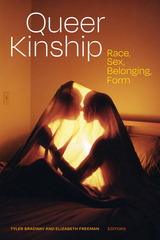 Queer Kinship: Race, Sex, Belonging, Form
Teagan Bradway and Elizabeth Freeman, editors
Duke University Press, 2022 The contributors to this volume assert the importance of queer kinship to queer and trans theory and to kinship theory. In a contemporary moment marked by the rising tides of neoliberalism, fascism, xenophobia, and homo- and cis-nationalism, they approach kinship as both a horizon and a source of violence and possibility. The contributors challenge dominant theories of kinship that ignore the devastating impacts of chattel slavery, settler colonialism, and racialized nationalism on the bonds of Black and Indigenous people and people of color. Among other topics, they examine the “blood tie” as the legal marker of kin relations, the everyday experiences and memories of trans mothers and daughters in Istanbul, the outsourcing of reproductive labor in postcolonial India, kinship as a model of governance beyond the liberal state, and the intergenerational effects of the adoption of Indigenous children as a technology of settler colonialism. Queer Kinship pushes the methodological and theoretical underpinnings of queer theory forward while opening up new paths for studying kinship.
Contributors. Aqdas Aftab, Leah Claire Allen, Teagan Bradway, Juliana Demartini Brito, Judith Butler, Dilara Çalışkan, Christopher Chamberlin, Aobo Dong, Brigitte Fielder, Elizabeth Freeman, John S. Garrison, Nat Hurley, Joseph M. Pierce, Mark Rifkin, Poulomi Saha, Kath Weston
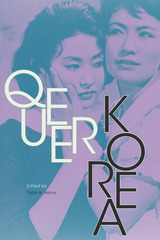 Queer Korea
Todd A. Henry, editor
Duke University Press, 2020 Since the end of the nineteenth century, the Korean people have faced successive waves of foreign domination, authoritarian regimes, forced dispersal, and divided development. Throughout these turbulent times, “queer” Koreans were ignored, minimized, and erased in narratives of their modern nation, East Asia, and the wider world. This interdisciplinary volume challenges such marginalization through critical analyses of non-normative sexuality and gender variance. Considering both personal and collective forces, the contributors extend individualized notions of queer neoliberalism beyond those typically set in Western queer theory. Along the way, they recount a range of illuminating topics, from shamanic rituals during the colonial era and B-grade comedy films under Cold War dictatorship to female masculinity among today’s youth and transgender confrontations with the resident registration system. More broadly, Queer Korea offers readers new ways of understanding the limits and possibilities of human liberation under exclusionary conditions of modernity in Asia and beyond.
Contributors. Pei Jean Chen, John (Song Pae) Cho, Chung-kang Kim, Todd A. Henry, Merose Hwang, Ruin, Layoung Shin, Shin-ae Ha, John Whittier Treat
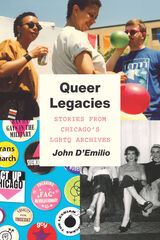 Queer Legacies: Stories from Chicago’s LGBTQ Archives
John D'Emilio
University of Chicago Press, 2020 The variety of LGBTQ life in Chicago is too abundant and too diverse to be contained in a single place. But since 1981, the Gerber/Hart Library and Archives has striven to do just that, amassing a wealth of records related to the city’s gay, lesbian, bisexual, transgender, and queer-identified people and organizations. In Queer Legacies, John D’Emilio—a pioneering scholar in the field—digs deep into Gerber/Hart’s collection to unearth a kaleidoscopic look at the communities built by generations of LGBTQ people. Excavated from one of the country’s most important, yet overlooked, LGBTQ archives, D’Emilio’s entertaining and enthusiastic essays range in focus from politics and culture to social life, academia, and religion. He gives readers an inclusive and personal look at fifty years of a national fight for visibility, recognition, and equality led by LGBTQ Americans who, quite literally, made history. In these troubled times, it will surely inspire a new generation of scholars and activists.
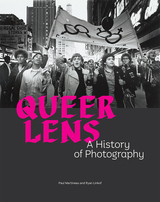 Queer Lens: A History of Photography
Paul Martineau
J. Paul Getty Trust, The, 2025 Copiously illustrated, Queer Lens explores the transformative role of photography in LGBTQ+ communities from the nineteenth century to the present day.
“An outstanding addition to the growing body of scholarship around queer imagery.”
—Jim Van Buskirk, The Bay Area Reporter
“A tour de force. . . . A profound collective story of creativity, joy and resistance.”
—Emma Jacob, Aesthetica Magazine
“Potent and inspiring. . . . An empowering photography retrospective that reflects American queer communities.”
—Aleena Ortiz, Foreword Reviews
“A deeply significant and beautifully produced volume."
—All About Photo.com
“Eye-catching."
—Matthew Wexler, Queerty.com
Photography’s power to capture a subject—representing reality, or a close approximation—has inherently been linked with the construction and practice of identity. Since the camera’s invention in 1839, and despite periods of severe homophobia, the photographic art form has been used by and for individuals belonging to dynamic LGBTQ+ communities, helping shape and affirm queer culture and identity across its many intersections.
Queer Lens explores this transformative force of photography, which has played a pivotal role in increasing queer visibility. Lively essays by scholars and artists explore myriad manifestations of queer culture, both celebrating complex interpretations of people and relationships and resisting rigid definitions. Featuring a rich selection of images—including portraits of queer individuals, visual records of queer kinship, and documentary photographs of early queer groups and protests—this volume investigates the medium’s profound role in illuminating the vibrant tapestry of LGBTQ+ communities.
This volume is published to accompany an exhibition on view at the J. Paul Getty Museum at the Getty Center from June 17 to September 28, 2025.
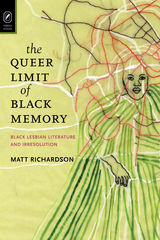 The Queer Limit of Black Memory: Black Lesbian Literature and Irresolution
Matt Richardson
Ohio State University Press, 2013 The Queer Limit of Black Memory: Black Lesbian Literature and Irresolution identifies a new archive of Black women’s literature that has heretofore been on the margins of literary scholarship and African diaspora cultural criticism. It argues that Black lesbian texts celebrate both the strategies of resistance used by queer Black subjects and the spaces for grieving the loss of queer Black subjects that dominant histories of the African diasporas often forget. Matt Richardson has gathered an understudied archive of texts by LaShonda Barnett, S. Diane Adamz-Bogus, Dionne Brand, Sharon Bridgforth, Laurinda D. Brown, Jewelle Gomez, Jackie Kay, and Cherry Muhanji in order to relocate the queerness of Black diasporic vernacular traditions, including drag or gender performance, blues, jazz, and West African spiritual and religious practices. Richardson argues that the vernacular includes queer epistemologies, or methods for accessing and exploring the realities of Black queer experience that other alternative archives and spaces of commemoration do not explore. The Queer Limit of Black Memory brings together several theorists whose work is vital within Black studies—Fred Moten, Saidiya Hartman, Hortense Spillers, Frantz Fanon, and Orlando Patterson—in service of queer readings of Black subjectivity.
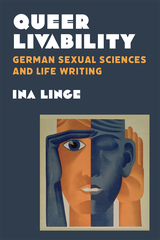 Queer Livability: German Sexual Sciences and Life Writing
Ina Linge
University of Michigan Press, 2023 This book brings together an exciting new archive of queer and trans voices from the history of sexual sciences in the German-speaking world. A new language to express possibilities of gender and sexuality emerged at the turn of the twentieth century, from Sigmund Freud’s theories of homosexuality in Vienna to Magnus Hirschfeld’s “third sex” in Berlin. Together, they provided a language of sex and sexuality that is still recognizable today. Queer Livability: German Sexual Sciences and Life Writing shows that individual voices of trans and queer writers had a significant impact on the production of knowledge about gender and sexuality during this time and introduces lesser known texts to a new readership. It shows the remarkable power of queer life writing in imagining and creating the possibilities of a livable life in the face of restrictive legal, medical, and social frameworks.
Queer Livability: German Sexual Sciences and Life Writing will be of interest to anyone who wants to learn more about LGBTQ+ history and literature. It also provides a fascinating insight into the historical roots for our thinking about gender and sexuality today. The book will be of relevance to an academic readership of students and faculty in German studies, literary studies, European history, and the interdisciplinary fields of gender and sexuality studies, medical humanities, and the history of sexuality.
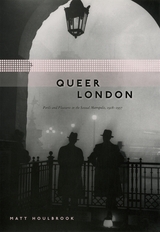 Queer London: Perils and Pleasures in the Sexual Metropolis, 1918-1957
Matt Houlbrook
University of Chicago Press, 2005 In August 1934, young Cyril L. wrote to his friend Billy about all the exciting men he had met, the swinging nightclubs he had visited, and the vibrant new life he had forged for himself in the big city. He wrote, "I have only been queer since I came to London about two years ago, before then I knew nothing about it." London, for Cyril, meant boundless opportunities to explore his newfound sexuality. But his freedom was limite: he was soon arrested, simply for being in a club frequented by queer men. Cyril's story is Matt Houlbrook's point of entry into the queer worlds of early twentieth-century London. Drawing on previously unknown sources, from police reports and newspaper exposés to personal letters, diaries, and the first queer guidebook ever written, Houlbrook here explores the relationship between queer sexualities and modern urban culture that we take for granted today. He revisits the diverse queer lives that took hold in London's parks and streets; its restaurants, pubs, and dancehalls; and its Turkish bathhouses and hotels—as well as attempts by municipal authorities to control and crack down on those worlds. He also describes how London shaped the culture and politics of queer life—and how London was in turn shaped by the lives of queer men. Ultimately, Houlbrook unveils the complex ways in which men made sense of their desires and who they were. In so doing, he mounts a sustained challenge to conventional understandings of the city as a place of sexual liberation and a unified queer culture. A history remarkable in its complexity yet intimate in its portraiture, Queer London is a landmark work that redefines queer urban life in England and beyond. “A ground-breaking work. While middle-class lives and writing have tended to compel the attention of most historians of homosexuality, Matt Houlbrook has looked more widely and found a rich seam of new evidence. It has allowed him to construct a complex, compelling account of interwar sexualities and to map a new, intimate geography of London.”—Matt Cook, The Times Higher Education Supplement
Winner of History Today’s Book of the Year Award, 2006
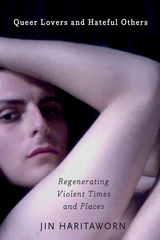 Queer Lovers and Hateful Others: Regenerating Violent Times and Places
Jin Haritaworn
Pluto Press, 2015 Berlin is once more capital of queer arts and tourism. Queerness is more visible today than it has been for decades, but at what cost? In Queer Lovers and Hateful Others, Jin Haritaworn argues that queer subjects have become a lovely sight only through being cast in the shadow of the new folk devil, the 'homophobic migrant' who is rendered by society as hateful, homophobic, and disposable.
At the centre of this book is the concept of 'queer regeneration.' Haritaworn sees the queer lover as a transitional object which allows the present-day neoliberal regime to make punishment and neglect appear as signs of care and love for diversity. Alongside this shift, in the wake of older moral panics over crime, violence, patriarchy, integration, and segregation, the new Other, that is, the homophobic migrant appears. To understand this transition, Queer Lovers and Hateful Others looks at the environments in which queer bodies have become worthy of protection, and the everyday erasures that shape life in the inner city, and how queer activists actively seek out and dispel the myths of sites of nostalgia for the 'invented traditions' of women-and-gay-friendliness.
Haritaworn guides the reader through a rich archive of media, arts, policy, and activism, including posters, newspaper reports, hate crime action plans, urban projects, psychological studies, demonstrations, kiss-ins, political speeches, and films. In the process, queer lovers, drag kings, criminalised youth, homosexuals persecuted under National Socialism, and other figures of degeneracy and regeneration appear on a shared plane, where new ways of sharing space become imaginable.
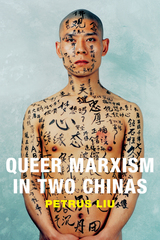 Queer Marxism in Two Chinas
Petrus Liu
Duke University Press, 2015 In Queer Marxism in Two Chinas Petrus Liu rethinks the relationship between Marxism and queer cultures in mainland China and Taiwan. Whereas many scholars assume the emergence of queer cultures in China signals the end of Marxism and demonstrates China's political and economic evolution, Liu finds the opposite to be true. He challenges the persistence of Cold War formulations of Marxism that position it as intellectually incompatible with queer theory, and shows how queer Marxism offers a nonliberal alternative to Western models of queer emancipation. The work of queer Chinese artists and intellectuals not only provides an alternative to liberal ideologies of inclusion and diversity, but demonstrates how different conceptions of and attitudes toward queerness in China and Taiwan stem from geopolitical tensions. With Queer Marxism in Two Chinas Liu offers a revision to current understandings of what queer theory is, does, and can be.
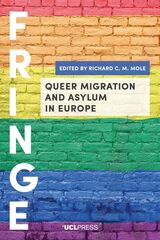 Queer Migration and Asylum in Europe
Edited by Richard C. M. Mole
University College London, 2021 A wide-ranging study on the reasons why queer individuals migrate to Europe and the sociopolitical frameworks they navigate.
Europe is a popular destination for LGBTQ people seeking to escape discrimination and persecution. Yet, while European institutions have done much to promote the legal equality of sexual minorities and a number of states pride themselves on their acceptance of sexual diversity, the image of European tolerance is often quite different from the reality faced by LGBTQ migrants and asylum seekers. Queer Migration and Asylum in Europe brings together scholars from politics, sociology, urban studies, anthropology, and law to analyze how and why queer individuals migrate to Europe, as well as the legal, social, and political frameworks they are forced to navigate in the destination societies. The subjects covered include LGBTQ Latino migrants in queer and diasporic spaces in London; the diasporic consciousness of queer Polish, Russian, and Brazilian migrants in Berlin; the role of the Council of Europe in shaping legal and policy frameworks relating to queer migration and asylum; the challenges facing bisexual asylum seekers; queer asylum and homonationalism in the Netherlands; and the role of space, faith, and LGBTQ organizations in Germany, Italy, the UK, and France in supporting queer asylum seekers.
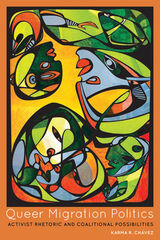 Queer Migration Politics: Activist Rhetoric and Coalitional Possibilities
Karma Chavez
University of Illinois Press, 2013 Delineating an approach to activism at the intersection of queer rights, immigration rights, and social justice, Queer Migration Politics examines a series of "coalitional moments" in which contemporary activists discover and respond to the predominant rhetoric, imagery, and ideologies that signal a sense of national identity. Karma Chávez analyzes how activists use coalition to articulate the shared concerns of queer politics and migration politics, as both populations seek to imagine their ability to belong in various communities and spaces, their relationships to state and regional politics, and their relationships to other people whose lives might be very different from their own. Advocating a politics of the present and drawing from women of color and queer of color theory, this book contends that coalition enables a vital understanding of how queerness and immigration, citizenship and belonging, and inclusion and exclusion are linked. Queer Migration Politics offers activists, queer scholars, feminists, and immigration scholars productive tools for theorizing political efficacy.
Queer Migrations: Sexuality, U.S. Citizenship, and Border Crossings
Eithne Luibheid
University of Minnesota Press, 2005 Emmigration from Latin America and Asia has influenced every aspect of social, political, economic, and cultural life in the United States over the last quarter century. Within the vast scholarship on this wave of immigration, however, little attention has been paid to queer immigrants of color. Focusing particularly on migration from Mexico, Cuba, El Salvador, and the Philippines, Queer Migrations brings together scholars of immigration, citizenship, sexuality, race, and ethnicity to provide analyses of the norms, institutions, and discourses that affect queer immigrants of color, also providing ethnographic studies of how these newcomers have transformed established immigrant communities in Miami, San Francisco, and New York.
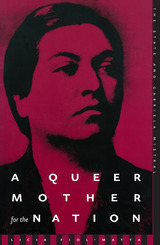 A Queer Mother For The Nation: The State And Gabriela Mistral
Licia Fiol-Matta
University of Minnesota Press, 2002 Chilean writer Gabriela Mistral (1889-1957), the first Latin American to win theNobel Prize for Literature, was a poetic idol for generations of Latin Americans who viewed her as Womanhood incarnate, the national schoolteacher-mother. How this distinctly masculine woman who never gave birth came to occupy this role, and what Mistral’s image, poetry, and life have to say about the relations-and realities-of race, gender, and sexual politics in her time, are the questions Licia Fiol-Matta pursues in this book, recreating the story of a woman whose misrepresentation is at least as intriguing, and as instructive, as her fame. A Queer Mother for the Nation weaves a nuanced understanding of how Mistral cooperated with authority and fashioned herself as the figure of Motherhood in collaboration with the state. Drawing on Mistral’s little-known political and social essays, her correspondence and photographs, Fiol-Matta reconstructs Mistral’s relationship to state politics. Her work questions the notion of queer bodies as outlaws, and insists on the many ways in which queer subjects have participated in and sustained the normative discourses they seem to rebel against
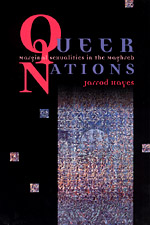 Queer Nations: Marginal Sexualities in the Maghreb
Jarrod Hayes
University of Chicago Press, 2000 The Maghreb (Morocco, Algeria, Tunisia) has been inhabited for millennia by a heterogeneous populace. However, in the wake of World War II, when independence movements began to gain momentum in these French colonies, the dominant national discourses attempted to define national identities by exclusion. One rallying cry from the 1930s was "Islam is my religion, Arabic is my language, Algeria is my fatherland."
In this incisive postcolonial study, Jarrod Hayes uses literary analysis to examine how Francophone novelists from the Maghreb engaged in a diametric nation-building project. Their works imagined a diverse nation peopled by those who were excluded by the dominant political discourses, especially those who did not conform to traditional sexual norms. By incorporating representations of marginal sexualities, sexual dissidence, and gender insubordination, Maghrebian novelists imagined an anticolonial struggle that would result in sexual liberation and envisioned nations that could be defined and developed inclusively.
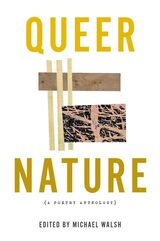 Queer Nature: A Poetry Anthology
Edited by Michael Walsh
Autumn House Press, 2022 An anthology of queer nature poetry spanning three centuries.
This anthology amplifies and centers LGBTQIA+ voices and perspectives in a collection of contemporary nature poetry. Showcasing over two hundred queer writers from the nineteenth to the twenty-first century, Queer Nature offers a new context for and expands upon the canon of nature poetry while also offering new lenses through which to view queerness and the natural world.
In the introduction, editor Michael Walsh writes that the anthology is “concerned with poems that speak to and about nature as the term is applied in everyday language to queer and trans bodies and identities . . . Queer Nature remains interested in elements, flora, fauna, habitats, homes, and natural forces—literary aspects of the work that allow queer and trans people to speak within their specific cultural and literary histories of the abnormal, the animal, the elemental, and the unnatural.” The anthology features poets including Elizabeth Bishop, Richard Blanco, Kay Ryan, Jericho Brown, Allen Ginsberg, Natalie Diaz, and June Jordan, as well as emerging voices such as Jari Bradley, Alicia Mountain, Eric Tran, and Jim Whiteside.
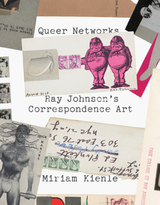 Queer Networks: Ray Johnson's Correspondence Art
Miriam Kienle
University of Minnesota Press, 2023 How the queer correspondence art of Ray Johnson disrupted art world conventions and anticipated today’s highly networked culture
Once regarded as “New York’s most famous unknown artist,” Ray Johnson was a highly visible outlier in the art world, his mail art practice reflecting the changing social relations and politics of queer communities in the 1960s. A vital contribution to the growing scholarship on this enigmatic artist, Queer Networks analyzes how Johnson’s practice sought to undermine the dominant mechanisms of the art market and gallery system in favor of unconventional social connections.
Utilizing the postal service as his primary means of producing and circulating art, Johnson cultivated an international community of friends and collaborators through which he advanced his idiosyncratic body of work. Applying both queer theory and network studies, Miriam Kienle explores how Johnson’s radical correspondence art established new modes of connectivity that fostered queer sensibilities and ran counter to the conventional methods by which artists were expected to develop their reputation. While Johnson was significantly involved with the Pop, conceptual, and neo-Dada art movements, Queer Networks crucially underscores his resistance to traditional art historical systems of categorization and their emphasis on individual mastery. Highlighting his alternative modes of community building and playful antagonism toward art world protocols, Kienle demonstrates how Ray Johnson’s correspondence art offers new ways of envisioning togetherness in today’s highly commodified and deeply networked world.
 Queer Newark: Stories of Resistance, Love, and Community
Whitney Strub
Rutgers University Press, 2024 NJSAA Edited Works Award Winner (2024)
Histories of gay and lesbian urban life typically focus on major metropolitan areas like San Francisco and New York, opportunity-filled destinations for LGBTQ migrants from across the country. Yet there are many other queer communities in economically depressed cities with majority Black and Hispanic populations that receive far less attention. Though just a few miles from New York, Newark is one of these cities, and its queer histories have been neglected—until now.
Queer Newark charts a history in which working-class people of color are the central actors and in which violence, poverty, and homophobia could never suppress joy, resistance, love, and desire. Drawing from rare archives that range from oral histories to vice squad reports, this collection’s authors uncover the sites and people of Newark’s queer past in bars, discos, ballrooms, and churches. Exploring the intersections of class, race, gender, and sexuality, they offer fresh perspectives on the HIV/AIDS epidemic, community relations with police, Latinx immigration, and gentrification, while considering how to best tell the rich and complex stories of queer urban life. Queer Newark reveals a new side of New Jersey’s largest city while rewriting the history of LGBTQ life in America.
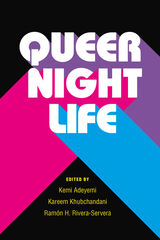 Queer Nightlife
Kemi Adeyemi, Kareem Khubchandani, Ramón H. Rivera-Servera, Editors
University of Michigan Press, 2021 The mass shooting at a queer Latin Night in Orlando in July 2016 sparked a public conversation about access to pleasure and selfhood within conditions of colonization, violence, and negation. Queer Nightlife joins this conversation by centering queer and trans people of color who apprehend the risky medium of the night to explore, know, and stage their bodies, genders, and sexualities in the face of systemic and social negation. The book focuses on house parties, nightclubs, and bars that offer improvisatory conditions and possibilities for “stranger intimacies,” and that privilege music, dance, and sexual/gender expressions. Queer Nightlife extends the breadth of research on “everynight life” through twenty-five essays and interviews by leading scholars and artists. The book’s four sections move temporally from preparing for the night (how do DJs source their sounds, what does it take to travel there, who promotes nightlife, what do people wear?); to the socialities of nightclubs (how are social dance practices introduced and taught, how is the price for sex negotiated, what styles do people adopt to feel and present as desirable?); to the staging and spectacle of the night (how do drag artists confound and celebrate gender, how are spaces designed to create the sensation of spectacularity, whose bodies become a spectacle already?); and finally, how the night continues beyond the club and after sunrise (what kinds of intimacies and gestures remain, how do we go back to the club after Orlando?).
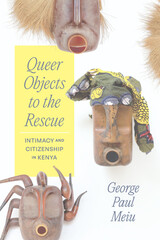 Queer Objects to the Rescue: Intimacy and Citizenship in Kenya
George Paul Meiu
University of Chicago Press, 2023 Examines forms of intimate citizenship that have emerged in relation to growing anti-homosexual violence in Kenya.
Campaigns calling on police and citizens to purge their countries of homosexuality have taken hold across the world. But the “homosexual threat” they claim to be addressing is not always easy to identify. To make that threat visible, leaders, media, and civil society groups have deployed certain objects as signifiers of queerness. In Kenya, for example, bead necklaces, plastics, and even diapers have come to represent the danger posed by homosexual behavior to an essentially “virile” construction of national masculinity.
In Queer Objects tothe Rescue, George Paul Meiu explores objects that have played an important and surprising role in both state-led and popular attempts to rid Kenya of various imagined threats to intimate life. Meiu shows that their use in the political imaginary has been crucial to representing the homosexual body as a societal threat and as a target of outrage, violence, and exclusion, while also crystallizing anxieties over wider political and economic instability. To effectively understand and critique homophobia, Meiu suggests, we must take these objects seriously and recognize them as potential sources for new forms of citizenship, intimacy, resistance, and belonging.
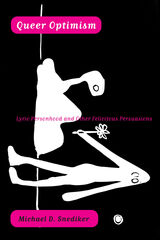 Queer Optimism: Lyric Personhood and Other Felicitous Persuasions
Michael D. Snediker
University of Minnesota Press, 2008 A new paradigm for queer theory Michael Snediker offers a much-needed counterpoint to queer theoretical discourse, which has long privileged melancholy, self-shattering, incoherence, shame, and the death drive. Recovering the forms of positive affect that queer theory has jettisoned, Snediker insists that optimism must itself be taken beyond conventional tropes of hope and futurity and reimagined as necessary for critical engagement. Through fresh, perceptive, and sensitive readings of the poetry of Emily Dickinson, Hart Crane, Jack Spicer, and Elizabeth Bishop, Snediker reveals that each of these poets demonstrated an interest in the durability of positive affects. Dickinson, Snediker argues, expresses joy and grace as much as pain and loss, and the myriad cryptic smiles in Hart Crane’s White Building contradict prevailing narratives of Crane’s apocryphal literary failures and eventual suicide. Snediker’s ambitious and sophisticated study, informed by thinkers such as Winnicott, Deleuze, and de Man, both supplements and challenges the work of queer theory’s leading figures, including Judith Butler, Leo Bersani, Eve Kosofsky Sedgwick, and Lee Edelman. Queer Optimism revises our understanding of queer love and affiliation, examining Spicer’s serial collusion with matinee idol Billy the Kid as well as the critically neglected force of Bishop’s epistolary and poetic reparations of the drowned figure of Hart Crane. In doing so, Snediker persuasively reconceives a theoretical field of optimism that was previously unavailable to scrupulous critical inquiry and provides a groundbreaking approach to modern American poetry and poetics.
 Queer People
Carroll and Garrett Graham. Afterword by Budd Schulberg.
Southern Illinois University Press, 1976
A brilliantly savage story, Queer People is, according to Budd Schulberg, “a racy testament to an era as totally vanished as the civilization of the Aztecs,” and if not the Hollywood novel is “at least a truly seminal work.”
Today’s readers will recognize in this long-forgotten Hollywood novel the seeds of three longer-lived ones, The Day of the Locust, What Makes Sammy Run?,and The Last Tycoon. They may also recognize Whitey, the hero of the Grahams’ novel, as a forerunner of F. Scott Fitzgerald’s Pat Hobby.
The central figure in the novel is an archetypal newspaper reporter who drifts to Hollywood. Whitey discovers the social microcosm of the studio-people, and finds himself in his element. He penetrates strange places and encounters queer people—the story conference, the three-day party, the titans and the moguls. When a murder ends his interlude he leaves Hollywood as casually as he discovered it.
Originally published in 1930 Queer People was a scandalous roman à clef, irreverent to the “industry,” and totally amoral—qualities lacking in later Hollywood fiction. Hence itis at once an important social document and an exciting original work.
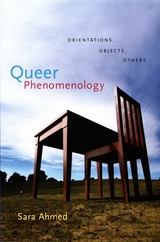 Queer Phenomenology: Orientations, Objects, Others
Sara Ahmed
Duke University Press, 2006 In this groundbreaking work, Sara Ahmed demonstrates how queer studies can put phenomenology to productive use. Focusing on the “orientation” aspect of “sexual orientation” and the “orient” in “orientalism,” Ahmed examines what it means for bodies to be situated in space and time. Bodies take shape as they move through the world directing themselves toward or away from objects and others. Being “orientated” means feeling at home, knowing where one stands, or having certain objects within reach. Orientations affect what is proximate to the body or what can be reached. A queer phenomenology, Ahmed contends, reveals how social relations are arranged spatially, how queerness disrupts and reorders these relations by not following the accepted paths, and how a politics of disorientation puts other objects within reach, those that might, at first glance, seem awry. Ahmed proposes that a queer phenomenology might investigate not only how the concept of orientation is informed by phenomenology but also the orientation of phenomenology itself. Thus she reflects on the significance of the objects that appear—and those that do not—as signs of orientation in classic phenomenological texts such as Husserl’s Ideas. In developing a queer model of orientations, she combines readings of phenomenological texts—by Husserl, Heidegger, Merleau-Ponty, and Fanon—with insights drawn from queer studies, feminist theory, critical race theory, Marxism, and psychoanalysis. Queer Phenomenology points queer theory in bold new directions.
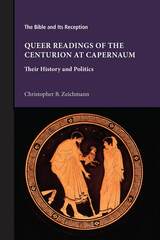 Queer Readings of the Centurion at Capernaum: Their History and Politics
Christopher B. Zeichmann
SBL Press, 2022 The first-ever monograph on the history of queer biblical interpretation of a controversial biblical passage
Since the 1950s, homoerotic readings of the pericope in which Jesus heals a Roman centurion’s slave have been built upon three of the account’s features: the specific Greek word pais, which can refer to youth, slave, or the junior partner in a sexual relationship between two men; Luke’s characterization of the young man as “dear” (entimos) to the centurion; and commonplace homoeroticism in the Roman army. Rather than affirming or denying the historical reality of a sexual relationship between the centurion and the young man, Christopher B. Zeichmann instead traces the shifting patterns of queer readings of the text and the influences of the sexual, political, and theological discourses of late twentieth- and early twenty-first-century Europe, the United States, and Australia. Readers will see how distinct political contexts have led interpreters to find very different meanings about the sexual subtexts of this story.
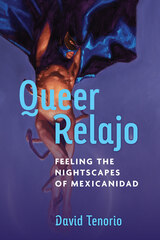 Queer Relajo: Feeling the Nightscapes of Mexicanidad
David Tenorio
University of Michigan Press, 2025 In 2015, Mexico City declared itself a “gay-friendly” city and followed up with a gay tourist guide and new laws permitting changes to gender markers on legal documents, sanctioning same-sex marriage, and allowing joint adoption of children. At the same time, patterns of violence and discrimination against women, trans, and queer people have continued throughout the country. In Queer Relajo, David Tenorio argues that while Mexico City aims to bring visibility to queer sociality, the benefits of legitimizing queer space remain unclear.
Combining readings of film, digital media, and performance with drag autoethnography, Queer Relajo quite literally plays with how relajo (or playfulness) structures the spaces of queer nightlife in urban contexts by revealing how nighttime intimacy can minimize the paralyzing effects of violence and precarity in a neoliberal Mexico. Considering the political implications of when a queer/trans person is present at night, Tenorio argues that queer feelings of play are not only essential to sexual liberation, but also resist neoliberal commodification and heteronormative extraction.
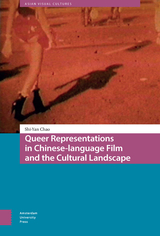 Queer Representations in Chinese-language Film and the Cultural Landscape
Shi-Yan Chao
Amsterdam University Press, 2020 Queer Representations in Chinese-language Film and the Cultural Landscape provides a cultural history of queer representations in Chinese-language film and media, negotiated by locally produced knowledge, local cultural agency, and lived histories. Incorporating a wide range of materials in both English and Chinese, this interdisciplinary project investigates the processes through which Chinese tongzhi/queer imaginaries are articulated, focusing on four main themes: the Chinese familial system, Chinese opera, camp aesthetic, and documentary impulse. Chao’s discursive analysis is rooted in and advances genealogical inquiries: a non-essentialist intervention into the "Chinese" idea of filial piety, a transcultural perspective on the contested genre of film melodrama, a historical investigation of the local articulations of mass camp and gay camp, and a transnational inquiry into the different formats of documentary. This book is a must for anyone exploring the cultural history of Chinese tongzhi/queer through the lens of transcultural media.
 Queer Ricans: Cultures and Sexualities in the Diaspora
Lawrence La Fountain-Stokes
University of Minnesota Press, 2009 Exploring cultural expressions of Puerto Rican queer migration from the Caribbean to New York, Philadelphia, Chicago, and San Francisco, Lawrence La Fountain-Stokes analyzes how artists have portrayed their lives and the discrimination they have faced in both Puerto Rico and the United States.
Highlighting cultural and political resistance within Puerto Rico’s gay, lesbian, bisexual, and transgender subcultures, La Fountain-Stokes pays close attention to differences of gender, historical moment, and generation, arguing that Puerto Rican queer identity changes over time and is experienced in very different ways. He traces an arc from 1960s Puerto Rico and the writings of Luis Rafael Sánchez to New York City in the 1970s and 1980s (Manuel Ramos Otero), Philadelphia and New Jersey in the 1980s and 1990s (Luz María Umpierre and Frances Negrón-Muntaner), and Chicago (Rose Troche) and San Francisco (Erika López) in the 1990s, culminating with a discussion of Arthur Avilés and Elizabeth Marrero’s recent dance-theater work in the Bronx.
Proposing a radical new conceptualization of Puerto Rican migration, this work reveals how sexuality has shaped and defined the Puerto Rican experience in the United States.
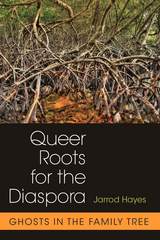 Queer Roots for the Diaspora: Ghosts in the Family Tree
Jarrod Hayes
University of Michigan Press, 2016 Employing rootedness as a way of understanding identity has increasingly been subjected to acerbic political and theoretical critiques. Politically, roots narratives have been criticized for attempting to police identity through a politics of purity—excluding anyone who doesn’t share the same narrative. Theoretically, a critique of essentialism has led to a suspicion against essence and origins regardless of their political implications.
The central argument of Queer Roots for the Diaspora is that, in spite of these debates, ultimately the desire for roots contains the “roots” of its own deconstruction. The book considers alternative root narratives that acknowledge the impossibility of returning to origins with any certainty; welcome sexual diversity; acknowledge their own fictionality; reveal that even a single collective identity can be rooted in multiple ways; and create family trees haunted by the queer others patrilineal genealogy seems to marginalize.
The roots narratives explored in this book simultaneously assert and question rooted identities within a number of diasporas—African, Jewish, and Armenian. By looking at these together, one can discern between the local specificities of any single diaspora and the commonalities inherent in diaspora as a global phenomenon. This comparatist, interdisciplinary study will interest scholars in a diversity of fields, including diaspora studies, postcolonial studies, LGBTQ studies, French and Francophone studies, American studies, comparative literature, and literary theory.
 Queer Roots for the Diaspora: Ghosts in the Family Tree
Jarrod Hayes
University of Michigan Press, 2016 Employing rootedness as a way of understanding identity has increasingly been subjected to acerbic political and theoretical critiques. Politically, roots narratives have been criticized for attempting to police identity through a politics of purity—excluding anyone who doesn’t share the same narrative. Theoretically, a critique of essentialism has led to a suspicion against essence and origins regardless of their political implications.
The central argument of Queer Roots for the Diaspora is that, in spite of these debates, ultimately the desire for roots contains the “roots” of its own deconstruction. The book considers alternative root narratives that acknowledge the impossibility of returning to origins with any certainty; welcome sexual diversity; acknowledge their own fictionality; reveal that even a single collective identity can be rooted in multiple ways; and create family trees haunted by the queer others patrilineal genealogy seems to marginalize.
The roots narratives explored in this book simultaneously assert and question rooted identities within a number of diasporas—African, Jewish, and Armenian. By looking at these together, one can discern between the local specificities of any single diaspora and the commonalities inherent in diaspora as a global phenomenon. This comparatist, interdisciplinary study will interest scholars in a diversity of fields, including diaspora studies, postcolonial studies, LGBTQ studies, French and Francophone studies, American studies, comparative literature, and literary theory.
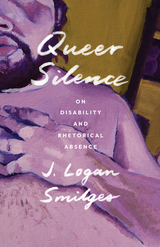 Queer Silence: On Disability and Rhetorical Absence
J. Logan Smilges
University of Minnesota Press, 2022 Championing the liberatory potential of silence to address the fraught disability politics of queerness In queer culture, silence has been equated with voicelessness, complicity, and even death. Queer Silence insists, however, that silence can be a generative and empowering mode of survival. Triangulating insights from queer studies, disability studies, and rhetorical studies, J. Logan Smilges explores what silence can mean for people whose bodyminds signify more powerfully than their words. Queer Silence begins by historicizing silence’s negative reputation, beginning with the ways homophile activists rejected medical models pathologizing homosexuality as a disability, resulting in the silencing of disability itself. This silencing was redoubled by HIV/AIDS activism’s demand for “out, loud, and proud” rhetorical activities that saw silence as capitulation. Reading a range of cultural artifacts whose relative silence has failed to attract queer attachment, from anonymous profiles on Grindr to ex-gays to belated gender transitions to disability performance art, Smilges argues for silence’s critical role in serving the needs of queers who are never named as such. Queer Silence urges queer activists and queer studies scholars to reconcile with their own ableism by acknowledging the liberatory potential of silence, a mode of engagement that disattached queers use every day for resistance, sociality, and survival. Retail e-book files for this title are screen-reader friendly with images accompanied by short alt text and/or extended descriptions.
Cover alt text: Background detail of a painting on canvas shows a partial view of the upper body and face of a figure, bearded and naked; title in painted script.
Queer Social Philosophy: CRITICAL READINGS FROM KANT TO ADORNO
Randall Halle
University of Illinois Press, 2004 In Queer Social Philosophy, Randall Halle analyzes key texts in the tradition of German critical theory from the perspective of contemporary queer theory, exposing gender and sexuality restrictions that undermine those texts' claims of universal truth. Addressing such figures as Kant, Hegel, Marx, Nietzsche, Adorno, and Habermas, Halle offers a unique contribution to contemporary debates about sexuality, civil society, and politics.
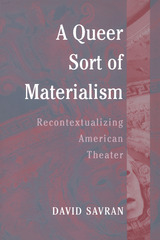 A Queer Sort of Materialism: Recontextualizing American Theater
David Savran
University of Michigan Press, 2003 In engaging, accessible prose, leading theater critic and cultural commentator David Savran explores the intersections between art and culture, offering smart, compelling interpretations of the economic and social contexts of theatrical texts and practices. Acknowledging theater's marginal status in U.S. culture, A Queer Sort of Materialism takes on "the trouble-makers--the ghost, closeted homosexual, masochist, drag king, Third World laborer, even the white male as victim"--who figure more prominently in theater than in other cultural forms. In impeccably researched and argued essays that range in subject matter from Rodgers and Hammerstein to Paula Vogel, from Suddenly Last Summer to Iron John, Savran uncovers the ways that such troublemakers both challenge and reinforce orthodox social practices.
The selections presented here are by turns entertaining, informative, sophisticated, and polemical, reflecting the author's dual citizenship as rigorous scholar and engaging theater critic. This book also provides a model for a kind of queer historical materialism that will prove useful to a wide range of disciplines, including theater and performance, gender and sexuality, queer/gay/lesbian/transgender studies, American studies, and popular culture.
David Savran is Professor of Theater, the Graduate Center, the City University of New York, and author of Cowboys, Communists, and Queers and Taking It Like a Man.
Queer Subjects in Modern Japanese Literature: Male Love, Intimacy, and Erotics, 1886–2014
Stephen D. Miller, Editor
University of Michigan Press, 2022 Queer Subjects in Modern Japanese Literature: Male Love, Erotics, and Intimacy, 1886–2014 is an anthology of translated Japanese literature about men behaving lovingly, erotically, and intimately with other men. Covering more than 125 years of modern and contemporary Japanese history, this book aims to introduce a diverse array of authors to an English-speaking audience and provide further context for their works. While no anthology can comprehensively represent queer Japanese literature, these selections nonetheless expand our understanding of queerness in Japanese culture.
Queer Theory without Antinormativity
Robyn Wiegman and Elizabeth A. Wilson, special issue editors
Duke University Press The tyrannies of sexual normativity have been widely denounced in queer theory. Heteronormativity, homonormativity, family values, marriage, and monogamy have all been objects of sustained queer critique, most often in purely oppositional form: as antinormativity. The contributors to this special issue ask a seemingly simple question of this critical code: can queer theory proceed without a primary allegiance to antinormativity? These essays offer an affirmative answer either by rethinking normativity or eschewing it altogether in order to redirect the intellectual and political energies of the field.
 Queer Throughlines: Spaces of Queer Activism in South Korea and the Korean Diaspora
Ju Hui Judy Han
University of Michigan Press, 2025 Queer Throughlines draws on years of direct participation, interviews, and ethnography to examine transnational Korean LGBTQ+ activism since the 1990s. Han maps the sites and routes of leftist and queer political movements, highlighting challenges posed by Christian conservatives in both South Korea and the United States. The book uses the concept of “throughlines” to weave together a web of movement stories across time and space: a coalition of Los Angeles–based LGBTQ+ activists and allies fighting an anti-gay petition campaign led by Korean immigrant churches; queer activists involved in anti-war protests in Seoul; progressive clergy embracing inclusivity and risking heresy charges and excommunication; and queer and trans activists refusing to be sidelined from visions of political change underway. These moments do not always line up in a straightforward narrative of victory or progress, yet they create powerful lines of solidarity, community, and kinship.
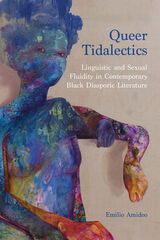 Queer Tidalectics: Linguistic and Sexual Fluidity in Contemporary Black Diasporic Literature
Emilio Amideo
Northwestern University Press, 2021 In Queer Tidalectics, Emilio Amideo investigates how Anglophone writers James Baldwin, Jackie Kay, Thomas Glave, and Shani Mootoo employ the trope of fluidity to articulate a Black queer diasporic aesthetics. Water recurs as a figurative and material site to express the Black queer experience within the diaspora, a means to explore malleability and overflowing sexual, gender, and racial boundaries. Amideo triangulates language, the aquatic, and affect to delineate a Black queer aesthetics, one that uses an idiom of fluidity, slipperiness, and opacity to undermine and circumvent gender normativity and the racialized heteropatriarchy embedded in English. The result is an outline of an ever-expanding affective archive of experiential knowledge.
Amideo engages and extends the work of Black queer studies, Oceanic studies, ecocriticism, phenomenology, and new materialism through the theorizations of Sara Ahmed, Omise’eke Natasha Tinsley, M. Jacqui Alexander, Édouard Glissant, José Esteban Muñoz, and Edward Kamau Brathwaite, among others. Ambitious in scope and captivating to read, Queer Tidalectics brings Caribbean writers like Glissant and Brathwaite into queer literary analysis—a major scholarly contribution.
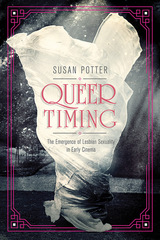 Queer Timing: The Emergence of Lesbian Sexuality in Early Cinema
Susan Potter
University of Illinois Press, 2019 John Leo and Dana Heller Award for Best Single Work, Anthology, Multi-Authored or Edited Book in LGBTQ Studies, Popular Culture Association (PCA), 2020 In Queer Timing, Susan Potter offers a counter-history that reorients accepted views of lesbian representation and spectatorship in early cinema. Potter sees the emergence of lesbian figures as only the most visible but belated outcome of multiple sexuality effects. Early cinema reconfigured older erotic modalities, articulated new--though incoherent--sexual categories, and generated novel forms of queer feeling and affiliation. Potter draws on queer theory, silent film historiography, feminist film analysis, and archival research to provide an original and innovative analysis. Taking a conceptually oriented approach, she articulates the processes of filmic representation and spectatorship that reshaped, marginalized, or suppressed women's same-sex desires and identities. As she pursues a sense of "timing," Potter stages scenes of the erotic and intellectual encounters shared by historical spectators, on-screen figures, and present-day scholars. The result is a daring revision of feminist and queer perspectives that foregrounds the centrality of women's same-sex desire to cinematic discourses of both homo- and heterosexuality.
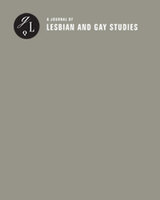 Queer Tourism: Geographies of Globalization, Volume 8
Jasbir K. Puar, ed.
Duke University Press Over the last several decades, queer sexualities, tourism industry marketing, tourist practices, and consumption patterns have converged to produce burgeoning outlets for the mobility of queer subjects. In the first collection ever devoted to scholarly articles on queer tourism, this special double issue of GLQ highlights the connections between political economy and sexuality and contributes to an emgerging body of literature on queer sexualities and globalization. Essays explore a range of geographical areas and cover topics that include an autoethnographic account of a queer traveler in Cuba, the development of gay and lesbian tourism in Madrid and Mexico, and gay and lesbian tourist events such as World Pride 2001 in Rome. The collection also includes an essay focusing on lesbian tourism—a study of the history of lesbian tourism on Eresos, Lesvos. Contributors. Lionel Cantú, Gabriel Giorgi, Venetia Kantsa, Lawrence La Fountain-Stokes, Michael Luongo, Kevin Markwell, Jasbir Kaur Puar, Dereka Rushbrook
 Queer Traffic: Sex, Panic, Free Trade
Jennifer Tyburczy
Duke University Press, 2025 In Queer Traffic, Jennifer Tyburczy traces how sexual dissidents across the Mexico-Canada-US borderlands transport the objects and experiences that nourish their sexual and social lives. She situates the North American Free Trade Agreement (NAFTA) as a pivot point in the formation of panics aimed at stamping out these outlaw sex practices. Highlighting NAFTA’s erotic investments in hetero- and homonormativity, racial capitalism, markets of dispossession, and neocolonialism, Tyburczy directly engages with art, activism, and archives to revisit the struggles of people who invented circuits of sexual exchange through four decades of violence and criminalization. In conversing with actors from bureaucrats to pornographers and in studying choreographies, social movements, and street vocabularies, she examines an array of tactics that undermine the market logics of trade law and policy. Dreaming of other forms of living that go beyond mere survival, Queer Traffic guides us through the renegade pathways that circumvent the seemingly endless reach of free-trade capitalism toward other routes to pleasure.
 Queer Transexions of Race, Nation, and Gender, Volume 15
Anne McClintock, Phillip Brian Harper, José Esteban Muñoz and Trish Rosen, eds.
Duke University Press Until now, queer theory has largely been silent about questions of race, especially when considered in an international context. Much postcolonial theory has been silent about questions regarding gender and sexuality. This special issue of Social Text explores the relations between race and queer sexuality by focusing on the politics of transgression in a transnational world. In the first section of this issue, Race and Queer Sexuality, international authors address topics ranging from Asian American queer identity and its relation to transnational and diasporic concerns to homophobia and its relationship to black nationalism in South Africa. Other subjects include, sexuality, race, and public space; lesbian pedagogy and the nation in Latin America; and an analysis of cross-race and cross-gender drag in the work of L.A. drag queen Vaginal Creme Davis. In the second section, The Politics of Transgression, contributors focus on transgression and its relationship to power and history. One essay explores Irish immigration in the U.S. and the Irish female body as a figure of transnational contagion and blood panic, while another focuses on Oscar Wilde, race, and queer sexuality. Other pieces include a meditation on British filmmaker and writer Derek Jarman’s film, Blue.
Race and Queer Sexuality confronts the limitations of prior work in queer theory while providing a starting point for discussion of race, queer sexuality, and the politics of transgression that will be part of queer theory of the future. Contributors. Judith Butler, David Eng, Licia Fiol-Mata, Judith Halberstam, Phillip Brian Harper, Neville Hoad, Rachel Holmes, Don Kulick, Tim Lawrence, Rosalind Morris, José Esteban Muñoz, Ben Singer, David Valentine, Priscilla Wald, Riki Anne Wilchins
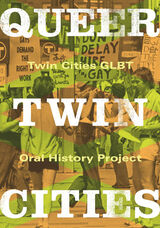 Queer Twin Cities
Twin Cities GLBT Oral History Project
University of Minnesota Press, 2010 A pioneering look at the queer history, politics, and spaces of the Twin Cities The Twin Cities is home to one of the largest and most vital GLBT populations in the nation—and one of the highest percentages of gay residents in the country. Drawn from the pioneering work of the Twin Cities GLBT Oral History Project—a collective organization of students, scholars, and activists devoted to documenting and interpreting the lives of GLBT people in Minneapolis and St. Paul—Queer Twin Cities is a uniquely critical collection of essays on Minnesota’s vibrant queer communities, past and present. A rich blend of oral history, archival research, and ethnography, Queer Twin Cities uses sexuality to chart connections between people’s lives in Minnesota. Topics range from turn-of-the-century Minneapolis amid moral reform—including the highly publicized William Williams murder trial and efforts to police Bridge Square, aka ‘skid row’—to northern Minnesota and the importance of male companionship among lumber workers, and to postwar life, when the increased visibility of queer life went hand in hand with increased regulation, repression, and violence. Other essays present a portrait of early queer spaces in the Twin Cities, such as Kirmser’s Bar, the Viking Room, and the Persian Palms, and the proliferation of establishments like the Dugout and the 19 Bar. Exploring the activism of GLBT Two-Spirit indigenous people, the antipornography movements of the 1980s, and the role of gay men in the gentrification of Minneapolis neighborhoods, this volume brings the history of queer life and politics in the Twin Cities into fascinating focus.Engaging and revelatory, Queer Twin Cities offers a critical analysis of local history and community and fills a glaring omission in the culture and history of Minnesota, looking not only to a remarkable past but to our collective future.
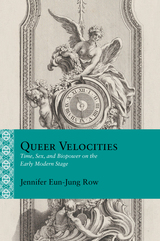 Queer Velocities: Time, Sex, and Biopower on the Early Modern Stage
Jennifer Eun-Jung Row
Northwestern University Press, 2022 Queer Velocities: Time, Sex, and Biopower on the Early Modern Stage explores how seventeenth-century French theater represents queer desire. In this book, the first queer theoretical treatment of canonical French theater, Jennifer Eun-Jung Row proposes that these velocities, moments of unseemly haste or strategic delay, sparked new kinds of attachments, intimacies, and erotics. Rather than rely on fixed identities or analog categories, we might turn to these affectively saturated moments of temporal sensation to analyze queerness in the premodern world.
The twin innovations of precise, portable timepieces and the development of the theater as a state institution together ignited new types of embodiments, orderly and disorderly pleasures, and normative and wayward rhythms of life. Row leverages a painstakingly formalist and rhetorical analysis of tragedies by Jean Racine and Pierre Corneille to show how the staging of delay or haste can critically interrupt the normative temporalities of marriage, motherhood, mourning, or sovereignty—the quotidian rhythms and paradigms so necessary for the biopolitical management of life. Row’s approach builds on the queer turn to temporality and Elizabeth Freeman’s notion of the chronobiopolitical to wager that queerness can also be fostered by the sensations of disruptive speed and slowness. Ultimately, Row suggests that the theater not only contributed to the glitter of Louis XIV’s absolutist spectacle but also ignited new forms of knowing and feeling time, as well as new modes of loving, living, and being together.
Queer Visibility in Post-socialist Cultures
Edited by Nárcisz Fejes and Andrea P. Balogh
Intellect Books, 2013 Queer Visibility in Post-socialist Cultures explores the public constructions of gay, lesbian, and queer identities, as well as ways of thinking about sexuality and gender, in post-socialist cultures across the European region formerly known as the Eastern bloc. Featuring eleven essays by scholars and activist researchers focusing on Slovakia, the Czech Republic, Hungary, Poland, Croatia, Serbia, Bulgaria, Romania, Belarus, and Russia, the collection encompasses a wide range of fields, including gender and sexuality studies, Eastern European studies, media and film studies, sociology, and cultural anthropology. Together, the essays reveal a paradigm of visibility politics centered on the vexed interaction between the post-socialist notions of queerness in activist strategies and the nationalist, mainstream representations of non-normative sexualities.
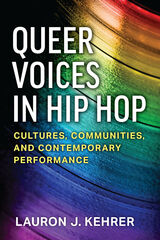 Queer Voices in Hip Hop: Cultures, Communities, and Contemporary Performance
Lauron J. Kehrer
University of Michigan Press, 2022 Notions of hip hop authenticity, as expressed both within hip hop communities and in the larger American culture, rely on the construction of the rapper as a Black, masculine, heterosexual, cisgender man who enacts a narrative of struggle and success. In Queer Voices in Hip Hop, Lauron J. Kehrer turns our attention to openly queer and trans rappers and positions them within a longer Black queer musical lineage. Combining musical, textual, and visual analysis with reception history, this book reclaims queer involvement in hip hop by tracing the genre’s beginnings within Black and Latinx queer music-making practices and spaces, demonstrating that queer and trans rappers draw on Ballroom and other cultural expressions particular to queer and trans communities of color in their work in order to articulate their subject positions. By centering the performances of openly queer and trans artists of color, Queer Voices in Hip Hop reclaims their work as essential to the development and persistence of hip hop in the United States as it tells the story of hip hop’s queer roots.
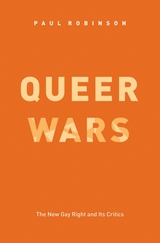 Queer Wars: The New Gay Right and Its Critics
Paul Robinson
University of Chicago Press, 2004 From the 1969 rebellion at Stonewall to recent battles over same-sex marriage, Gay Liberation in the United States has always been closely associated with the political left. But in recent years, Gay Liberation has taken a dramatic turn toward the right. And gaycons, as they were once archly referred to in the Nation, have taken politics and the media by storm. New Republic columnist Andrew Sullivan, for instance, is one of the most popular bloggers on the Internet. Writer Bruce Bawer, meanwhile, is celebrated for his incisive criticism of gay culture and its connections with camp and diva worship.
Queer Wars limns this new gay right, offering the first extended consideration of gay conservatism and its more trenchant critics. Here celebrated historian of gay culture Paul Robinson draws particular attention to three features of this new political movement. First, he explores how gay conservatives have rejected the idea that commitment to gay freedom should involve equal dedication to the causes of other marginalized people, be they racial minorities, women, or the poor. Second, Robinson demonstrates why gay conservatives embrace more traditional gender ideals—why they are hostile to effeminacy among men and mannishness among women. Finally, exploring the support for sexual restraint among gay conservatives, Robinson dissects their condemnation of promiscuity and their assault on behavior they deem dissolute.
Timely and rich in suggestive propositions, Queer Wars will prove to be essential reading for anyone interested in gay culture and contemporary politics.
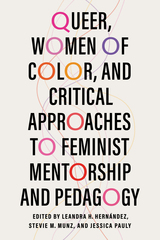 Queer, Women of Color, and Critical Approaches to Feminist Mentorship and Pedagogy
Edited by Leandra H. Hernández, Stevie M. Munz, and Jessica Pauly
University of Illinois Press, 2025 Feminist mentorship remains in short supply within communication studies and feminist and gender studies. A diverse group of contributors from the undergraduate level to senior scholars use Black feminist, Chicana feminist, and queer lenses to explore feminist mentorship examples in both pedagogical and relationship-building contexts. The first section draws upon the contributors’ unique and situated experiences of mentorship in academia. Essays explore their past and current experiences with feminist mentorship in relationships that take many forms: faculty members with fellow faculty members; faculty members with undergraduate and graduate students; and faculty members who feel as if they have become family with their mentors and mentees. In the second section, the contributors deeply interrogate the practices of feminist mentoring by problematizing practices and offering new ways, places, and formats that make space and consider new possibilities. A conclusion reflects on the future of feminist mentorship amidst contemporary debates and concerns in higher education. Enriching and hopeful, Queer, Women of Color, and Critical Approaches to Feminist Mentorship and Pedagogy is a much-needed challenge to traditional forms of mentorship.
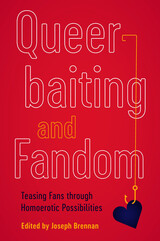 Queerbaiting and Fandom: Teasing Fans through Homoerotic Possibilities
Joseph Brennan
University of Iowa Press, 2019 In this first-ever comprehensive examination of queerbaiting, fan studies scholar Joseph Brennan and his contributors examine cases that shed light on the sometimes exploitative industry practice of teasing homoerotic possibilities that, while hinted at, never materialize in the program narratives. Through a nuanced approach that accounts for both the history of queer representation and older fan traditions, these essayists examine the phenomenon of queerbaiting across popular TV, video games, children’s programs, and more. Contributors: Evangeline Aguas, Christoffer Bagger, Bridget Blodgett, Cassie Brummitt, Leyre Carcas, Jessica Carniel, Jennifer Duggan, Monique Franklin, Divya Garg, Danielle S. Girard, Mary Ingram-Waters, Hannah McCann, Michael McDermott, E. J. Nielsen, Emma Nordin, Holly Eva Katherine Randell-Moon, Emily E. Roach, Anastasia Salter, Elisabeth Schneider, Kieran Sellars, Isabela Silva, Guillaume Sirois, Clare Southerton
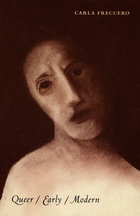 Queer/Early/Modern
Carla Freccero
Duke University Press, 2006 In Queer/Early/Modern, Carla Freccero, a leading scholar of early modern European studies, argues for a reading practice that accounts for the queerness of temporality, for the way past, present, and future time appear out of sequence and in dialogue in our thinking about history and texts. Freccero takes issue with New Historicist accounts of sexual identity that claim to respect historical proprieties and to derive identity categories from the past. She urges us to see how the indeterminacies of subjectivity found in literary texts challenge identitarian constructions and she encourages us to read differently the relation between history and literature. Contending that the term “queer,” in its indeterminacy, points the way toward alternative ethical reading practices that do justice to the aftereffects of the past as they live on in the present, Freccero proposes a model of “fantasmatic historiography” that brings together history and fantasy, past and present, event and affect. Combining feminist theory, queer theory, psychoanalysis, deconstruction, and literary criticism, Freccero takes up a series of theoretical and historical issues related to debates in queer theory, feminist theory, the history of sexuality, and early modern studies. She juxtaposes readings of early and late modern texts, discussing the lyric poetry of Petrarch, Louise Labé, and Melissa Ethridge; David Halperin’s take on Michel Foucault via Apuleius’s The Golden Ass and Boccaccio’s Decameron; and France’s domestic partner legislation in connection with Marguerite de Navarre’s Heptameron. Turning to French cleric Jean de Léry’s account, published in 1578, of having witnessed cannibalism and religious rituals in Brazil some twenty years earlier and to the twentieth-century Brandon Teena case, Freccero draws on Jacques Derrida’s concept of spectrality to propose both an ethics and a mode of interpretation that acknowledges and is inspired by the haunting of the present by the past.
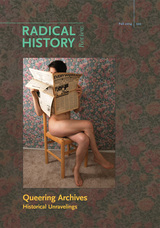 Queering Archives: Historical Unravelings
Daniel Marshall, Kevin P. Murphy, and Zeb Tortorici, special issue editors
Duke University Press “Queering Archives: Historical Unravelings” is the first of two themed issues from Radical History Review (numbers 120 and 122) that explore the ways in which the notion of the “queer archive” is increasingly crucial for scholars working at the intersection of history, sexuality, and gender. Efforts to record and preserve queer experiences determine how scholars account for the past and provide a framework for understanding contemporary queer life. Essays in these issues consider historical materials from queer archives around the world as well as the recent critical practice of “queering” the archive by looking at historical collections for queer content (and its absence).
This issue explores the evolution of grassroots LGBT archives, debates over queer migrations, nationalism and the institutionalization of LGBT memory, the archiving of transgender activism, digitization and the classificatory systems of the archive, performances of the colonial archive, museums as archives, and everyday objects as archivable texts.
Daniel Marshall is Senior Lecturer in the Faculty of Arts and Education at Deakin University, Melbourne. Kevin P. Murphy is Associate Professor of History at the University of Minnesota and a member of the Radical History Review editorial collective. Zeb Tortorici is Assistant Professor of Spanish and Portuguese Languages and Literatures at New York University.
Contributors: Rustem Ertug Altinay, Anjali Arondekar, Elspeth H. Brown, Elise Chenier, Howard Chiang, Ben Cowan, Ann Cvetkovich, Sara Davidmann, Leah DeVun, Peter Edelberg, Licia Fiol-Matta, Jack Jen Gieseking, Christina Hanhardt, Robb Hernandez, Kwame Holmes, Regina Kunzel, A. J. Lewis, Martin F. Manalansan IV, María Elena Martínez, Michael Jay McClure, Caitlin McKinney, Katherine Mohrman, Joan Nestle, Mimi Thi Nguyen, Tavia Nyong’o, Anthony M. Petro, K. J. Rawson, Barry Reay, Juana María Rodríguez, Don Romesburg, Rebecka Sheffield, Marc Stein, Margaret Stone, Susan Stryker, Robert Summers, Jeanne Vaccaro, Dale Washkansky, Melissa White
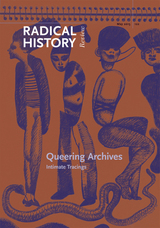 Queering Archives: Intimate Tracings
Daniel Marshall, Kevin P. Murphy, and Zeb Tortorici, special issue editors
Duke University Press “Queering Archives: Intimate Tracings” is the second of two themed issues from Radical History Review (numbers 120 and 122) that explore the ways in which the notion of the “queer archive” is increasingly crucial for scholars working at the intersection of history, sexuality, and gender. Efforts to record and preserve queer experiences determine how scholars account for the past and provide a framework for understanding contemporary queer life. Essays in these issues consider historical materials from queer archives around the world as well as the recent critical practice of “queering” the archive by looking at historical collections for queer content (and its absence).
This issue considers how archives allow historical traces of sexuality and gender to be sought, identified, recorded, and assembled into accumulations of meaning. Contributors explore conundrums in contemporary queer archival methods, probing some of them in essays on the Catholic Church and the Church of Jesus Christ of Latter-Day Saints. This issue also includes a series of intergenerational interviews reflecting on histories of LGBT archives, a roundtable discussion about legacies of queer studies of the archive, and a closing reflection by Joan Nestle, a founding figure in the practice of international queer archiving.
Daniel Marshall is Senior Lecturer in the Faculty of Arts and Education at Deakin University, Melbourne. Kevin P. Murphy is Associate Professor of History at the University of Minnesota and a member of the Radical History Review editorial collective. Zeb Tortorici is Assistant Professor of Spanish and Portuguese Languages and Literatures at New York University.
Contributors: Rustem Ertug Altinay, Anjali Arondekar, Elspeth H. Brown, Elise Chenier, Howard Chiang, Ben Cowan, Ann Cvetkovich, Sara Davidmann, Leah DeVun, Peter Edelberg, Licia Fiol-Matta, Jack Jen Gieseking, Christina Hanhardt, Robb Hernandez, Kwame Holmes, Regina Kunzel, A. J. Lewis, Martin F. Manalansan IV, María Elena Martínez, Michael Jay McClure, Caitlin McKinney, Katherine Mohrman, Joan Nestle, Mimi Thi Nguyen, Tavia Nyong’o, Anthony M. Petro, K. J. Rawson, Barry Reay, Juana María Rodríguez, Don Romesburg, Rebecka Sheffield, Marc Stein, Margaret Stone, Susan Stryker, Robert Summers, Jeanne Vaccaro, Dale Washkansky, Melissa White
Queering Black Atlantic Religions: Transcorporeality in Candomblé, Santería, and Vodou
Roberto Strongman
Duke University Press, 2019 In Queering Black Atlantic Religions Roberto Strongman examines Haitian Vodou, Cuban Lucumí/Santería, and Brazilian Candomblé to demonstrate how religious rituals of trance possession allow humans to understand themselves as embodiments of the divine. In these rituals, the commingling of humans and the divine produces gender identities that are independent of biological sex. As opposed to the Cartesian view of the spirit as locked within the body, the body in Afro-diasporic religions is an open receptacle. Showing how trance possession is a primary aspect of almost all Afro-diasporic cultural production, Strongman articulates transcorporeality as a black, trans-Atlantic understanding of the human psyche, soul, and gender as multiple, removable, and external to the body.
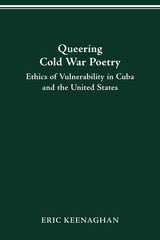 Queering Cold War Poetry: Ethics of Vulnerability in Cuba and the United States
Eric Keenaghan
Ohio State University Press, 2009 Many feel that individualism, and the security it demands, define democracy and freedom. This belief is characteristic of the attitude that thinkers from John Dewey to Michel Foucault have criticized as "liberalist." In actuality, we share intimate associations with one another through contacts established by our bodies and even by language. In Queering Cold War Poetry, Eric Keenaghan offers queer theory, queer studies, and literary theory a new political and conceptual language for reevaluating past and present high valuations of individualism and security. He examines four Cold War poets from Cuba and the United States—Wallace Stevens, José Lezama Lima, Robert Duncan, and Severo Sarduy. These writers, who lived in an era when homosexuals were regarded as outsiders or even security threats, offer critiques of nationalism and liberalism. In their struggles against state and cultural mandates that foreclosed positive estimations of vulnerability, Stevens, Lezama, Duncan, and Sarduy radically revised ethics and identity in their day. Their work exemplifies how much modernist poetry disseminates experiences of differences that challenge prevailing attitudes about individuals' relationships to one another and to their nations. Through studies of Cuban and U.S. lyric and poetics, Queering Cold War Poetry clears the way for imagining what it means to belong to a passionate and compassionate citizenry which celebrates vulnerability, searches for difference in itself and each of its constituent individuals, and identifies less with a nation than with a global community.
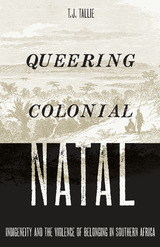 Queering Colonial Natal: Indigeneity and the Violence of Belonging in Southern Africa
T. J. Tallie
University of Minnesota Press, 2019 How were indigenous social practices deemed queer and aberrant by colonial forces?
In Queering Colonial Natal, T.J. Tallie travels to colonial Natalestablished by the British in 1843, today South Africa’s KwaZulu-Natal provinceto show how settler regimes “queered” indigenous practices. Defining them as threats to the normative order they sought to impose, they did so by delimiting Zulu polygamy; restricting alcohol access, clothing, and even friendship; and assigning only Europeans to government schools.
Using queer and critical indigenous theory, this book critically assesses Natal (where settlers were to remain a minority) in the context of the global settler colonial project in the nineteenth century to yield a new and engaging synthesis. Tallie explores the settler colonial history of Natal’s white settlers and how they sought to establish laws and rules for both whites and Africans based on European mores of sexuality and gender. At the same time, colonial archives reveal that many African and Indian people challenged such civilizational claims. Ultimately Tallie argues that the violent collisions between Africans, Indians, and Europeans in Natal shaped the conceptions of race and gender that bolstered each group’s claim to authority.
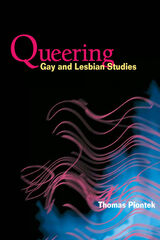 Queering Gay and Lesbian Studies
Thomas Piontek
University of Illinois Press, 2005 Queering Gay and Lesbian Studies is a broadly interdisciplinary study that considers a key dilemma in gay and lesbian studies through the prism of identity and its discontents: the field studies has modeled itself on ethnic studies programs, perhaps to be intelligible to the university community, but certainly because the ethnic studies route to programs is well established. Since this model requires a stable and identifiable community, gay and lesbian studies have emphasized stable and knowable identities. The problem, of course is that sexuality is neither stable, tidy, nor developmental. With the advent of queer theory, there are now other perspectives available that frequently find themselves at odds with traditional gay and lesbian studies.
In this pioneering new study, Thomas Piontek provides a critical analysis of the development of gay and lesbian studies alongside the development of queer theory, the disputes between them, and criticism of their activities from both in and outside of the gay academic community. Examining disputes about transgendering, gay male promiscuity, popular culture, gay history, political activism, and non-normative sexual practices, Piontek argues that it is vital to queer gay and lesbian studies--opening this emerging discipline to queer critical interventions without, however, further institutionalizing queer theory.
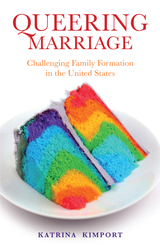 Queering Marriage: Challenging Family Formation in the United States
Kimport, Katrina
Rutgers University Press, 2013 Co-Winner of the 2015 Charles Tilly Award for Best Book of the Collective Behavior and Social Movements section from the American Sociological Association
Over four thousand gay and lesbian couples married in the city of San Francisco in 2004. The first large-scale occurrence of legal same-sex marriage, these unions galvanized a movement and reignited the debate about whether same-sex marriage, as some hope, challenges heterosexual privilege or, as others fear, preserves that privilege by assimilating queer couples. In Queering Marriage, Katrina Kimport uses in-depth interviews with participants in the San Francisco weddings to argue that same-sex marriage cannot be understood as simply entrenching or contesting heterosexual privilege. Instead, she contends, these new legally sanctioned relationships can both reinforce as well as disrupt the association of marriage and heterosexuality. During her deeply personal conversations with same-sex spouses, Kimport learned that the majority of respondents did characterize their marriages as an opportunity to contest heterosexual privilege. Yet, in a seeming contradiction, nearly as many also cited their desire for access to the normative benefits of matrimony, including social recognition and legal rights. Kimport’s research revealed that the pattern of ascribing meaning to marriage varied by parenthood status and, in turn, by gender. Lesbian parents were more likely to embrace normative meanings for their unions; those who are not parents were more likely to define their relationships as attempts to contest dominant understandings of marriage. By posing the question—can queers “queer” marriage?—Kimport provides a nuanced, accessible, and theoretically grounded framework for understanding the powerful effect of heterosexual expectations on both sexual and social categories.
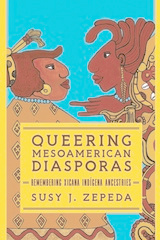 Queering Mesoamerican Diasporas: Remembering Xicana Indigena Ancestries
Susy J. Zepeda
University of Illinois Press, 2022 Acts of remembering offer a path to decolonization for Indigenous peoples forcibly dislocated from their culture, knowledge, and land. Susy J. Zepeda highlights the often overlooked yet intertwined legacies of Chicana feminisms and queer decolonial theory through the work of select queer Indígena cultural producers and thinkers. By tracing the ancestries and silences of gender-nonconforming people of color, she addresses colonial forms of epistemic violence and methods of transformation, in particular spirit research. Zepeda also uses archival materials, raised ceremonial altars, and analysis of decolonial artwork in conjunction with oral histories to explore the matriarchal roots of Chicana/x and Latina/x feminisms. As she shows, these feminisms are forms of knowledge that people can remember through Indigenous-centered visual narratives, cultural wisdom, and spirit practices. A fascinating exploration of hidden Indígena histories and silences, Queering Mesoamerican Diasporas blends scholarship with spirit practices to reimagine the root work, dis/connection to land, and the political decolonization of Xicana/x peoples.
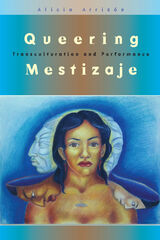 Queering Mestizaje: Transculturation and Performance
Alicia Arrizón
University of Michigan Press, 2006 Queering Mestizaje employs theories of postcolonial cultural studies (including performance studies, queer and feminist theory) to examine the notion of mestizaje---the mixing of races, and specifically indigenous peoples, with European colonizers---and how this phenomenon manifests itself in three geographically diverse spaces: the United States, Latin America, and the Philippines. Alicia Arrizón argues that, as an imaginary site for racialized, gendered, and sexualized identities, mestizaje raises questions about historical transformation and cultural memory across Spanish postcolonial sites. Arrizón offers new, queer readings of the hybrid, the intercultural body, and the hyphenated self, building on the work of Gloria Anzaldúa, Antonio Benitez-Rojo, Walter Mignolo, and Vera Kutzinski, while challenging accepted discourses about the relationship between colonizer and colonized. Queering Mestizaje is unique in the connections it makes between the Spanish colonial legacy in the Philippines and in the Americas. An engagingly eclectic array of cultural materials---including examples from performance art, colonial literature, visual art, fashion, and consumer products---are discussed, and included in the book's twenty-nine illustrations. "Arrizón takes as her point of departure the connections and distinctions between the four keywords in the title (each with a long, specific, and convoluted history in its own right) while bringing together the Philippines, the Hispanophone Caribbean, and the United States to configure a map carved by the same blade of colonialism and imperialism. In its conjoining of queer, mestizaje, transculturation and performance, the pleasurable and enlightening variety of its textual examples, and its commitment to theorize desire from the space of queer mestizaje, her book makes a unique and accomplished contribution."
---Yvonne Yarbro-Bejarano, Stanford University Alicia Arrizón is Professor of Women's Studies at the University of California, Riverside. She is author of Latina Performance: Traversing the Stage and co-editor of Latinas on Stage: Practice and Theory. Illustration: Judith F. Baca, La Mestizaje (1991), pastel on paper. © SPARC.
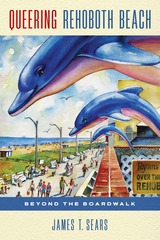 Queering Rehoboth Beach: Beyond the Boardwalk
James T. Sears
Temple University Press, 2024 “Create a More Positive Rehoboth” was a decades-long goal for progress and inclusiveness in a charming beach town in southern Delaware. Rehoboth, which was established in the 19th century as a Methodist Church meeting camp, has, over time, become a thriving mecca for the LGBTQ+ community. In Queering Rehoboth Beach, historian and educator James Sears charts this significant evolution.
Sears draws upon extensive oral history accounts, archival material, and personal narratives to chronicle “the Battle for Rehoboth,” which unfolded in the late 20th century, as conservative town leaders and homeowners opposed progressive entrepreneurs and gay activists. He recounts not just the emergence of the gay and lesbian bars, dance clubs, and organizations that drew the queer community to the region, but also the efforts of local politicians and homeowners, among other groups who fought to develop and protect the traditional identity of this beach town. Moreover, issues of race, class, and gender and sexuality informed opinions as residents and visitors struggled with the AIDS crisis and the legacy of Jim Crow.
Queering Rehoboth Beach is more than just an inspiring story about a community’s resilience and determination to establish a safe space for itself in the wake of the era of Don’t Ask, Don’t Tell. It is also a terrific beach read.
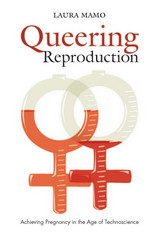 Queering Reproduction: Achieving Pregnancy in the Age of Technoscience
Laura Mamo
Duke University Press, 2007 Originally developed to help heterosexual couples, fertility treatments such as in vitro fertilization and sperm donation have provided lesbians with new methods for achieving pregnancy during the past two decades. Queering Reproduction is an important sociological analysis of lesbians’ use of these medical fertility treatments. Drawing on in-depth interviews with lesbians who have been or are seeking to become pregnant, Laura Mamo describes how reproduction has become an intensely medicalized process for lesbians, who are transformed into fertility patients not (or not only) because of their physical conditions but because of their sexual identities. Mamo argues that this medicalization of reproduction has begun to shape queer subjectivities in both productive and troubling ways, destabilizing the assumed link between heterosexuality and parenthood while also reinforcing traditional, heteronormative ideals about motherhood and the imperative to reproduce. Mamo provides an overview of a shift within some lesbian communities from low-tech methods of self-insemination to a reliance on outside medical intervention and fertility treatments. Reflecting on the issues facing lesbians who become parents through assisted reproductive technologies, Mamo explores questions about the legal rights of co-parents, concerns about the genetic risks of choosing an anonymous sperm donor, and the ways decisions to become parents affect sexual and political identities. In doing so, she investigates how lesbians navigate the medical system with its requisite range of fertility treatments, diagnostic categories, and treatment trajectories. Combining moving narratives and insightful analysis, Queering Reproduction reveals how medical technology reconfigures social formations, individual subjectivity, and notions of kinship.
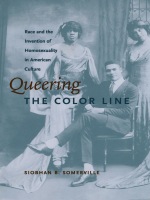 Queering the Color Line: Race and the Invention of Homosexuality in American Culture
Siobhan B. Somerville
Duke University Press, 2000 Queering the Color Line transforms previous understandings of how homosexuality was “invented” as a category of identity in the United States beginning in the late nineteenth century. Analyzing a range of sources, including sexology texts, early cinema, and African American literature, Siobhan B. Somerville argues that the emerging understanding of homosexuality depended on the context of the black/white “color line,” the dominant system of racial distinction during this period. This book thus critiques and revises tendencies to treat race and sexuality as unrelated categories of analysis, showing instead that race has historically been central to the cultural production of homosexuality.
At about the same time that the 1896 Supreme Court Plessy v. Ferguson decision hardened the racialized boundary between black and white, prominent trials were drawing the public’s attention to emerging categories of sexual identity. Somerville argues that these concurrent developments were not merely parallel but in fact inextricably interrelated and that the discourses of racial and sexual “deviance” were used to reinforce each other’s terms. She provides original readings of such texts as Havelock Ellis’s late nineteenth-century work on “sexual inversion,” the 1914 film A Florida Enchantment, the novels of Pauline E. Hopkins, James Weldon Johnson’s Autobiography of an Ex-Coloured Man, and Jean Toomer’s fiction and autobiographical writings, including Cane. Through her analyses of these texts and her archival research, Somerville contributes to the growing body of scholarship that focuses on discovering the intersections of gender, race, and sexuality.
Queering the Color Line will have broad appeal across disciplines including African American studies, gay and lesbian studies, literary criticism, cultural studies, cinema studies, and gender studies.
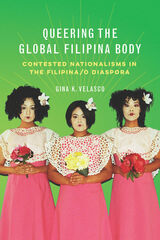 Queering the Global Filipina Body: Contested Nationalisms in the Filipina/o Diaspora
Gina K. Velasco
University of Illinois Press, 2020 Contemporary popular culture stereotypes Filipina women as sex workers, domestic laborers, mail order brides, and caregivers. These figures embody the gendered and sexual politics of representing the Philippine nation in the Filipina/o diaspora. Gina K. Velasco explores the tensions within Filipina/o American cultural production between feminist and queer critiques of the nation and popular nationalism as a form of resistance to neoimperialism and globalization.
Using a queer diasporic analysis, Velasco examines the politics of nationalism within Filipina/o American cultural production to consider an essential question: can a queer and feminist imagining of the diaspora reconcile with gendered tropes of the Philippine nation? Integrating a transnational feminist analysis of globalized gendered labor with a consideration of queer cultural politics, Velasco envisions forms of feminist and queer diasporic belonging, while simultaneously foregrounding nationalist movements as vital instruments of struggle.
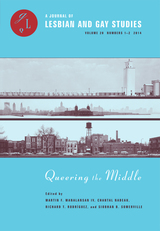 Queering the Middle: Race, Region, and a Queer Midwest, Volume 20
Martin Manalansan, Chantal Nadeau, Richard T. Rodríguez, and Siobhan B. Somerville
Duke University Press When imagined in relation to other regions of the United States, the Midwest is often positioned as the norm, the uncontested site of white American middle-class heteronormativity. This characterization has often prevailed in scholarship on sexual identity, practice, and culture, but a growing body of recent queer work on rural sexualities, transnational migration, regional identities, and working-class culture suggests the need to understand the Midwest otherwise. This special issue offers an opportunity to think with, through, and against the idea of region. Rather than reinforce the idea of the Midwest as a core that naturalizes American cultural and ideological formations, these essays instead open up possibilities for unraveling the idea of the heartland. The introduction provides a discussion of the theoretical and critical motivations for understanding the middle as a queer vantage, while the six articles focus on social movements, queer community networks, Midwest-based expressive cultures, and local and diasporic rearticulations of racial, gender, and sexual politics. At the University of Illinois at Urbana-Champaign, Martin Manalansanis Associate Professor in the Department of Anthropology, Chantal Nadeau is Professor and Chair of Gender and Women’s Studies, and Richard T. Rodríguez and Siobhan B. Somerville are Associate Professors in the Department of English.
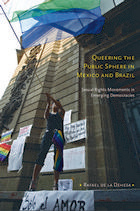 Queering the Public Sphere in Mexico and Brazil: Sexual Rights Movements in Emerging Democracies
Rafael de la Dehesa
Duke University Press, 2010 Queering the Public Sphere in Mexico and Brazil is a groundbreaking comparative analysis of the historical development and contemporary dynamics of LGBT activism in Latin America’s two largest democracies. Rafael de la Dehesa focuses on the ways that LGBT activists have engaged with the state, particularly in alliance with political parties and through government health agencies in the wake of the AIDS crisis. He examines this engagement against the backdrop of the broader political transitions to democracy, the neoliberal transformation of state–civil society relations, and the gradual consolidation of sexual rights at the international level. His comparison highlights similarities between sexual rights movements in Mexico and Brazil, including a convergence on legislative priorities such as antidiscrimination laws and the legal recognition of same-sex couples. At the same time, de la Dehesa points to notable differences in the tactics deployed by activists and the coalitions brought to bear on the state. De la Dehesa studied the archives of activists, social-movement organizations, political parties, religious institutions, legislatures, and state agencies, and he interviewed hundreds of individuals, not only LGBT activists, but also feminists, AIDS and human-rights activists, party militants, journalists, academics, and state officials. He marshals his prodigious research to reveal the interplay between evolving representative institutions and LGBT activists’ entry into the political public sphere in Latin America, offering a critical analysis of the possibilities opened by emerging democratic arrangements, as well as their limitations. At the same time, exploring activists’ engagement with the international arena, he offers new insights into the diffusion and expression of transnational norms inscribing sexual rights within a broader project of liberal modernity. Queering the Public Sphere in Mexico and Brazil is a landmark examination of LGBT political mobilization.
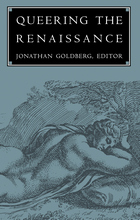 Queering the Renaissance
Jonathan Goldberg, ed.
Duke University Press, 1994 Queering the Renaissance offers a major reassessment of the field of Renaissance studies. Gathering essays by sixteen critics working within the perspective of gay and lesbian studies, this collection redraws the map of sexuality and gender studies in the Renaissance. Taken together, these essays move beyond limiting notions of identity politics by locating historically forms of same-sex desire that are not organized in terms of modern definitions of homosexual and heterosexual. The presence of contemporary history can be felt throughout the volume, beginning with an investigation of the uses of Renaissance precedents in the 1986 U.S. Supreme Court decision Bowers v. Hardwick, to a piece on the foundations of 'our' national imaginary, and an afterword that addresses how identity politics has shaped the work of early modern historians. The volume examines canonical and noncanonical texts, including highly coded poems of the fifteenth-century Italian poet Burchiello, a tale from Marguerite de Navarre's Heptameron, and Erasmus's letters to a young male acolyte. English texts provide a central focus, including works by Spenser, Shakespeare, Bacon, Donne, Beaumont and Fletcher, Crashaw, and Dryden. Broad suveys of the complex terrains of friendship and sodomy are explored in one essay, while another offers a cross-cultural reading of the discursive sites of lesbian desire. Contributors. Alan Bray, Marcie Frank, Carla Freccero, Jonathan Goldberg, Janet Halley, Graham Hammill, Margaret Hunt, Donald N. Mager, Jeff Masten, Elizabeth Pittenger, Richard Rambuss, Alan K. Smith, Dorothy Stephens, Forrest Tyler Stevens, Valerie Traub, Michael Warner
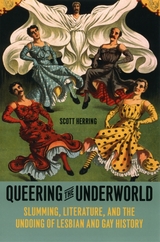 Queering the Underworld: Slumming, Literature, and the Undoing of Lesbian and Gay History
Scott Herring
University of Chicago Press, 2007 At the start of the twentieth century, tales of “how the other half lives” experienced a surge in popularity. People looking to go slumming without leaving home turned to these narratives for spectacular revelations of the underworld and sordid details about the deviants who populated it.
In this major rethinking of American literature and culture, Scott Herring explores how a key group of authors manipulated this genre to paradoxically evade the confines of sexual identification. Queering the Underworld examines a range of writers, from Jane Addams and Willa Cather to Carl Van Vechten and Djuna Barnes, revealing how they fulfilled the conventions of slumming literature but undermined its goals, and in the process, queered the genre itself. Their work frustrated the reader’s desire for sexual knowledge, restored the inscrutability of sexual identity, and cast doubt on the value of a homosexual subculture made visible and therefore subject to official control.
Herring is persuasive and polemical in connecting these writers to ongoing debates about lesbian and gay history and politics, and Queering the Underworld will be widely read by students and scholars of literature, history, and sexuality.
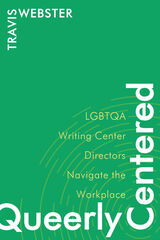 Queerly Centered: LGBTQA Writing Center Directors Navigate the Workplace
Travis Webster
Utah State University Press, 2021 Queerly Centered explores writing center administration and queer identity, showcasing LGBTQA labor undertaken but not previously acknowledged or documented in the field’s research. Drawing from interviews with twenty queer writing center directors, Travis Webster examines the lived experiences of queer people leading writing centers, the promise and occasional peril of this work, and the disciplinary implications of such work for writing center administration, research, and praxis. Focused on directors’ queer histories, administrative activisms, and on-the-job tensions, this study connects and departs from oft-referenced lenses, such as emotional and invisible labor, for understanding work in higher education. The first book-length project that exclusively bridges writing centers and LGBTQA studies, Queerly Centered is for researchers, administrators, educators, and practitioners of all orientations and backgrounds in writing center and writing program administration, rhetoric and composition, and higher education administration.
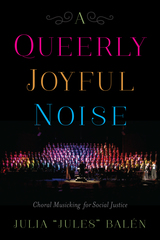 A Queerly Joyful Noise: Choral Musicking for Social Justice
Julia "Jules" Balén
Rutgers University Press, 2017 2018 Choice Outstanding Academic Title
Honorable Mention, 2019 Herndon Book Prize - (SEM-GST)
A Queerly Joyful Noise examines how choral singing can be both personally transformative and politically impactful. As they blend their different voices to create something beautiful, LGBTIQ singers stand together and make themselves heard. Comparing queer choral performances to the uses of group singing within the civil rights and labor movements, Julia “Jules” Balén maps the relationship between different forms of oppression and strategic musical forms of resistance. She also explores the potential this queer communal space creates for mobilizing progressive social action.
A proud member of numerous queer choruses, Balén draws from years of firsthand observations, archival research, and extensive interviews to reveal how queer chorus members feel shared vulnerability, collective strength, and even moments of ecstasy when performing. A Queerly Joyful Noise serves as a testament to the power of music, intimately depicting how participation in a queer chorus is more than a pastime, but a meaningful form of protest through celebration.
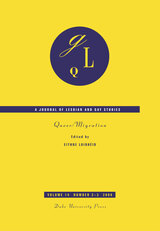 Queer/Migration, Volume 14
Eithne Luibhéid ,spec issue ed
Duke University Press This special double issue of GLQ explores the interface between queerness and migration, challenging heterosexist and heteronormative assumptions that often underpin traditional migration scholarship. Refusing to treat queer migrants as a homogeneous group, the issue insists that sexuality scholarship must rethink the role of migration in constructing heterogeneous sexual identities, communities, politics, and practices. Considering queer migration to the United States, from the Philippines, and between Australia and Asia, Russia and Israel, and France and the Dominican Republic, contributors critically examine how sexuality shapes all migration processes and experiences. The issue, featuring essays by both established and emerging scholars, situates queer migration within global processes of colonization, globalization, capitalism, nationalism, and slavery. One contributor argues that a queer Atlantic history emerged during the Middle Passage experience of slavery, connecting this history to the contemporary movement of Haitian refugees and Dominican migrant laborers. Another contributor considers how the policing of queer migrant bodies and of “unnatural offenses” by colonial administrations in the Nicobar and Andaman islands ultimately reconfigured the ecology of the entire Indian Ocean archipelago. Still another contributor theorizes how gay couples composed of young Asian émigrés and considerably older white citizens negotiate Australian immigration policy to subvert dominant forms of nationalism and citizenship embedded in long histories of inequality between Australia and Asia. Other essays explore how transgender histories and theories transform queer migration scholarship; how “queer complicities” with contemporary neoliberal migration politics uphold regimes of violence and inequality; and how migration regimes and settlement policies in various parts of the world identify individuals as “queer,” “deviant,” or “abnormal” within racial, gender, class, cultural, and geopolitical hierarchies. Contributors. Bobby Benedicto, Carlos Ulises Decena, Kale Bantigue Fajardo, Maja Horn, Adi Kuntsman, Eithne Luibhéid, Clare Sears, Omise’eke Natasha Tinsley, Kath Weston, Audrey Yue
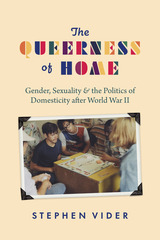 The Queerness of Home: Gender, Sexuality, and the Politics of Domesticity after World War II
Stephen Vider
University of Chicago Press, 2021 Vider uncovers how LGBTQ people reshaped domestic life in the postwar United States.
From the Stonewall riots to the protests of ACT UP, histories of queer and trans politics have almost exclusively centered on public activism. In The Queerness of Home, Stephen Vider turns the focus inward, showing that the intimacy of domestic space has been equally crucial to the history of postwar LGBTQ life.
Beginning in the 1940s, LGBTQ activists looked increasingly to the home as a site of connection, care, and cultural inclusion. They struggled against the conventions of marriage, challenged the gendered codes of everyday labor, reimagined domestic architecture, and contested the racial and class boundaries of kinship and belonging. Retelling LGBTQ history from the inside out, Vider reveals the surprising ways that the home became, and remains, a charged space in battles for social and economic justice, making it clear that LGBTQ people not only realized new forms of community and culture for themselves—they remade the possibilities of home life for everyone.
 Queers Read This!: LGBTQ Literature Now
Ramzi Fawaz and Shante Pradigm Smalls, special issue editors
Duke University Press, 2018 This special issue asks how LGBTQ literary production has evolved in response to the dramatic transformations in queer life that have taken place since the early 1990s. Taking inspiration from “QUEERS READ THIS!”—a leaflet distributed at the 1990 New York Pride March by activist group Queer Nation—the contributors to this issue theorize what such an impassioned command would look like today: in light of our current social and political realities, what should queers read now and how are they reading and writing texts? The contributors offer innovative and timely approaches to the place, function, and political possibilities of LGBTQ literature in the wake of AIDS, gay marriage, the rise of institutional queer theory, the ascendancy of transgender rights, the #BlackLivesMatter movement, and the 2016 election. The authors reconsider camp aesthetics in the Trump era, uncover long-ignored histories of lesbian literary labor, reconceptualize contemporary black queer literary responses to institutional violence and racism, and query the methods by which we might forge a queer-of-color literary canon. This issue frames LGBTQ literature as not only a growing list of texts, but as a vast range of reading attitudes, affects, contexts, and archives that support queer ways of life.
Contributors: Aliyyah Abdur-Rahman, Cynthia Barounis, Tyler Bradway, Ramzi Fawaz, Jennifer James, Martin Joseph Ponce, Natalie Prizel, Shanté Paradigm Smalls, Samuel Solomon.
 Queer/Tongzhi China: New Perspectives on Research, Activism and Media Cultures
Edited by Elisabeth L. Engebretsen and William F. Schroeder
National University of Singapore Press, 2015 This book brings together some of the most exciting, original and cutting-edge work being conducted on contemporary queer China. The volume includes original essays by some of the most prolific and central queer activists and artists in the PRC, placing their writing alongside work by emergent and established scholars from a variety of disciplines and backgrounds. The book offers unique perspectives by presenting primary accounts of the creative and multi-faceted strategies that activists and community organizers have developed in their various activities. The volume also presents rich, empirical evidence of every-day queer lives across China, offering a unique record not only of cosmopolitan community and activist perspectives but also of voices and experiences from a broad range of locations and identifications. As a whole it offers invaluable insights into sexual and gender diversity in China today. Queer/Tongzhi China thus breathes as it speaks, providing through its diverse approaches a different understanding of queer China than standard mono-ethnographies or social-scientific documentaries.
Querida: Poems
Nathan Xavier Osorio
University of Pittsburgh Press, 2024 Querida offers a place-based lyrical meditation on the poet’s immigrant parents, collective memory, language, and family in the San Fernando region of Los Angeles, California. Through a constellation of interweaving persona poems, confessional reflections, imagistic portraits of people and places, and decolonial poetic rituals—braided with a crown of sonnets—a choir of speakers navigate the fraught inheritance of memory frayed by the generational trauma of migration, coloniality, and the exploitative labor of late-stage capitalism. Swaying between maximalist and carnivalesque textual decadence and sparse, brutalist, bilingual inquiries into language as yet another exploitative and extractive tool for control, these poems honor familial and community wisdom as the only way to survive the steadily destabilizing Capitalocene.
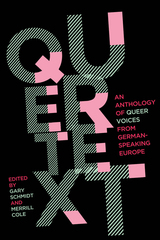 Quertext: An Anthology of Queer Voices from German-Speaking Europe
Edited by Gary Schmidt and Merrill Cole
University of Wisconsin Press, 2021 Knowing that queer voices have been making themselves heard in Germany, Switzerland, and Austria decades before Stonewall, editors Gary Schmidt and Merrill Cole curated thrilling snapshots of prose fiction from more than twenty contemporary writers whose work defies stereotypes, disciplines, and expectations. These authors produce fiction for adults and young people that celebrates the multiplicity of the present, casts a queer eye on the past, and interrogates LGBTQ+ futures.
These outstanding texts exemplify the glittering variety of styles, themes, settings, and subjects addressed by openly queer authors who write in German today. They explore identity, sexuality, history, fantasy, loss, and discovery. Their authors, narrators, and characters explore gender nonconformity and living queer everywhere from city centers to rural communities. They are gay, lesbian, bisexual, trans, and nonbinary. They are exiles, immigrants, and travelers through time and space.
Witty, titillating, and a delight to read, Quertext opens up new worlds of experience for readers interested in queer life beyond the Anglophone world.
Featuring work by Jürgen Bauer • Ella Blix • Claudia Breitsprecher • Lovis Cassaris • Gunther Geltinger • Joachim Helfer • Odile Kennel • Friedrich Kröhnke • Anja Kümmel • Marko Martin • Hans Pleschinski • Christoph Poschenrieder • Peter Rehberg • Michael Roes • Sasha Marianna Salzmann • Angela Steidele • Antje Rávik Strubel • Alain Claude Sulzer • Antje Wagner • J. Walther • Tania Witte • Yusuf Yeşilöz
Querying Consent: Beyond Permission and Refusal
Jordana Greenblatt, Keja Valens
Rutgers University Press, 2018 Querying Consent examines the ways in which the concept of consent is used to map and regulate sexual desire, gender relationships, global positions, technological interfaces, relationships of production and consumption, and literary and artistic interactions. From philosophy to literature, psychoanalysis to the art world, the contributors to Querying Consent address the most uncomfortable questions about consent today. Grounded in theoretical explorations of the entanglement of consent and subjectivity across a range of textual, visual, multi- and digital media, Querying Consent considers the relationships between consent and agency before moving on to trace the concept’s outcomes through a range of investigations of the mutual implication of personhood and self-ownership.
Quest for a Christian America, 1800–1865: A Social History of the Disciples of Christ, Volume 1
David Edwin Harrell Jr.
University of Alabama Press, 2003 The definitive social history of the Disciples of Christ in the 19th century
The Disciples of Christ, led by reformers such as Alexander Campbell and Barton W. Stone, was one of a number of early-19th-century primitivist religious movements seeking to “restore the ancient order of things.” The Disciples movement was little more than a loose collection of independent congregations until the middle of the 19th century, but by 1900 three clear groupings of churches had appeared. Today, more than 5 million Americans—members of the modern-day Disciples of Christ (Christian Church), Independent Christian Churches, and Churches of Christ, among others—trace their religious heritage to this “Restoration Movement.”
 Quest for a Suitable Past: Myth and Memory in Central and Eastern Europe
Lucian Boia
Central European University Press, 2017 The past may be approached from a variety of directions. A myth provides a sense of direction: it reunites people around certain values and projects and pushes them in one direction or another. The present volume brings together a range of case studies of myth making and myth breaking in east Europe from the nineteenth century to the present day. In particular, it focuses on the complex process through which memories are transformed into myths. This problematic interplay between memory and myth-making is analyzed in conjunction with the role of myths in the political and social life of the region. The essays include cases of forging myths about national pre-history, about the endorsement of nation building by means of historiography, and above all, about communist and post-communist mythologies. The studies shed new light on the creation of local and national identities, as well as the legitimization of ideologies through myth-making. Together, the individual contributions show that myths were often instrumental in the vast projects of social and political mobilization during a period which has witnessed, among others, two world wars and the harsh oppression of the communist regimes.
 The Quest for Authority and Honor in the American Professions, 1750-1900
Samuel Haber
University of Chicago Press, 1991 With the decline in the size of our industrial work force and the rise of the service occupations, the professions today are prominent models for a singular kind of social position. The professions and "professionalism" seem to offer an escape from vexing supervision at work as well as from some of the depersonalization and uncertainty of markets and bureaucracies. In taking account of our hunger for professional status and privileges, Samuel Haber presents the first synthetic history of major professions in America. His account emphasizes the substance of each profession's work experience, told from the vantage point of the doctors, lawyers, ministers, and their emulators whose work gave them a high sense of purpose and a durable sense of community.
Contrary to those who regard the professions as exemplary and up-to-date specimens of social modernization or economic monopoly, Haber argues that they bring both preindustrial and predemocratic ideals and standards into our modern world. He proposes that the values embedded in the professions—authority and honor, fused with duty and responsibility—have their origins in the class position and occupational prescriptions of eighteenth-century English gentlemen. Such an argument has implications for the understanding of American society; it underscores the cumulative and variegated nature of our culture and suggests the drawbacks of trying to describe society as a system. It also accords with Haber's endeavor to write a history that rescues for description and analysis mixed motives, composite conditions, and persons and parties acting upon contradictory explanatory schemes.
Haber traces the cultural evolution of the professions through three stages—establishment (1750-1830), disestablishment (1830-1880), and reestablishment (1880-1900). He shows that when the gentlemanly class declined in the United States, the professions maintained status even in somewhat hostile settings. The professions thus came to be seen as a middle way between the pursuits of laborers and those of capitalists. Massive in scale and ambition, this book will have a formidable impact among scholars newly attuned to the history of American middle-class culture.
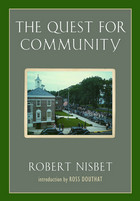 The Quest for Community: A Study in the Ethics of Order and Freedom
Robert Nisbet
Intercollegiate Studies Institute, 2010
One of the leading thinkers to emerge in the postwar conservative intellectual revival was the sociologist Robert Nisbet. His book The Quest for Community, published in 1953, stands as one of the most persuasive accounts of the dilemmas confronting modern society.
Nearly a half century before Robert Putnam documented the atomization of society in Bowling Alone, Nisbet argued that the rise of the powerful modern state had eroded the sources of community—the family, the neighborhood, the church, the guild. Alienation and loneliness inevitably resulted. But as the traditional ties that bind fell away, the human impulse toward community led people to turn even more to the government itself, allowing statism—even totalitarianism—to flourish.
ISI Books is proud to present this new edition of Nisbet’s magnum opus, featuring a brilliant introduction by New York Times columnist Ross Douthat and three critical essays. Published at a time when our communal life has only grown weaker and when many Americans display cultish enthusiasm for a charismatic president, this new edition of The Quest for Community shows that Nisbet’s insights are as relevant today as ever.
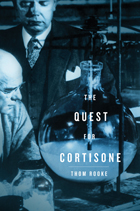 The Quest for Cortisone
Thom Rooke
Michigan State University Press, 2012 In 1948, when “Mrs. G.,” hospitalized with debilitating rheumatoid arthritis, became the first person to receive a mysterious new compound—cortisone—her physicians were awestruck by her transformation from enervated to energized. After eighteen years of biochemical research, the most intensively hunted biological agent of all time had finally been isolated, identified, synthesized, and put to the test. And it worked. But the discovery of a long-sought “magic bullet” came at an unanticipated cost in the form of strange side effects. This fascinating history recounts the discovery of cortisone and pulls the curtain back on the peculiar cast of characters responsible for its advent, including two enigmatic scientists, Edward Kendall and Philip Hench, who went on to receive the Nobel Prize. The book also explores the key role the Mayo Clinic played in fostering cortisone’s development, and looks at drugs that owe their heritage to the so-called “King of Steroids.”
 The Quest for Democracy in Iran: A Century of Struggle against Authoritarian Rule
Fakhreddin Azimi
Harvard University Press, 2010 The Constitutional Revolution of 1906 launched Iran as a pioneer in a broad-based movement to establish democratic rule in the non-Western world. In a book that provides essential context for understanding modern Iran, Fakhreddin Azimi traces a century of struggle for the establishment of representative government.
The promise of constitutional rule was cut short in the 1920s with the rise of the Pahlavi dynasty. Reza Shah, whose despotic rule Azimi deftly captures, maintained the façade of a constitutional monarch but greeted any challenge with an iron fist: “I will eliminate you,” he routinely barked at his officials. In 1941, fearful of losing control of the oil-rich region, the Allies forced Reza Shah to abdicate but allowed Mohammad Reza to succeed his father. Though promising to abide by the constitution, the new Shah missed no opportunity to undermine it.
The Anglo-American–backed coup of 1953, which ousted reformist premier Mohammed Mosaddeq, dealt a blow to the constitutionalists. The Shah’s repressive policies and subservience to the United States radicalized both secular and religious opponents, leading to the revolution of 1979. Azimi argues that we have fundamentally misunderstood this event by characterizing it as an “Islamic” revolution when it was in reality the expression of a long-repressed desire for popular sovereignty. This explains why the clerical rulers have failed to counter the growing public conviction that the Islamic Republic, too, is impervious to political reform—and why the democratic impulse that began with the Constitutional Revolution continues to be a potent and resilient force.
 Quest for Equality: The Failed Promise of Black-Brown Solidarity
Neil Foley
Harvard University Press, 2010 As the United States championed principles of freedom and equality during World War II, it denied fundamental rights to many non-white citizens. In the wake of President Franklin Roosevelt’s “Good Neighbor” policy with Latin America, African American and Mexican American civil rights leaders sought ways to make that policy of respect and mutual obligations apply at home as well as abroad. They argued that a whites-only democracy not only denied constitutional protection to every citizen but also threatened the war effort and FDR’s aims.
Neil Foley examines the complex interplay among regional, national, and international politics that plagued the efforts of Mexican Americans and African Americans to find common ground in ending employment discrimination in the defense industries and school segregation in the war years and beyond. Underlying differences in organizational strength, political affiliation, class position, and level of assimilation complicated efforts by Mexican and black Americans to forge strategic alliances in their fight for economic and educational equality. The prospect of interracial cooperation foundered as Mexican American civil rights leaders saw little to gain and much to lose in joining hands with African Americans.
Over a half century later, African American and Latino civil rights organizations continue to seek solutions to relevant issues, including the persistence of de facto segregation in our public schools and the widening gap in wealth and income in America. Yet they continue to grapple with the difficulty of forging solidarity across lines of cultural, class, and racial-ethnic difference, a struggle that remains central to contemporary American life.
The Quest for God and the Good Life
Mark T. Miller
Catholic University of America Press, 2013 Throughout this introductory text, progress, decline, and redemption constitute a systematic framework for examining the central terms of Catholic theology, as well as key notions in Lonergan's theology. The book provides a firm foundation for students of Lonergan as well as anyone interested in understanding Catholic theology and applying it to ministry, education, and other fields.
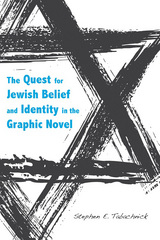 The Quest for Jewish Belief and Identity in the Graphic Novel
Stephen E. Tabachnick
University of Alabama Press, 2014 Many Jewish artists and writers contributed to the creation of popular comics and graphic novels, and in The Quest for Jewish Belief and Identity in the Graphic Novel, Stephen E. Tabachnick takes readers on an engaging tour of graphic novels that explore themes of Jewish identity and belief.
The creators of Superman (Jerry Siegel and Joe Shuster), Batman (Bob Kane and Bill Finger), and the Marvel superheroes (Stan Lee and Jack Kirby), were Jewish, as was the founding editor of Mad magazine (Harvey Kurtzman). They often adapted Jewish folktales (like the Golem) or religious stories (such as the origin of Moses) for their comics, depicting characters wrestling with supernatural people and events. Likewise, some of the most significant graphic novels by Jews or about Jewish subject matter deal with questions of religious belief and Jewish identity. Their characters wrestle with belief—or nonbelief—in God, as well as with their own relationship to the Jews, the historical role of the Jewish people, the politics of Israel, and other issues related to Jewish identity.
In The Quest for Jewish Belief and Identity in the Graphic Novel, Stephen E. Tabachnick delves into the vivid kaleidoscope of Jewish beliefs and identities, ranging from Orthodox belief to complete atheism, and a spectrum of feelings about identification with other Jews. He explores graphic novels at the highest echelon of the genre by more than thirty artists and writers, among them Harvey Pekar (American Splendor), Will Eisner (A Contract with God), Joann Sfar (The Rabbi’s Cat), Miriam Katin (We Are On Our Own), Art Spiegelman (Maus), J. T. Waldman (Megillat Esther), Aline Kominsky Crumb (Need More Love), James Sturm (The Golem’s Mighty Swing), Leela Corman (Unterzakhn), Ari Folman and David Polonsky (Waltz with Bashir), David Mairowitz and Robert Crumb’s biography of Kafka, and many more. He also examines the work of a select few non-Jewish artists, such as Robert Crumb and Basil Wolverton, both of whom have created graphic adaptations of parts of the Hebrew Bible.
Among the topics he discusses are graphic novel adaptations of the Bible; the Holocaust graphic novel; graphic novels about the Jews in Eastern and Western Europe and Africa, and the American Jewish immigrant experience; graphic novels about the lives of Jewish women; the Israel-centered graphic novel; and the Orthodox graphic novel. The book concludes with an extensive bibliography.
No study of Jewish literature and art today can be complete without a survey of the graphic novel, and scholars, students, and graphic novel fans alike will delight in Tabachnick’s guide to this world of thought, sensibility, and artfulness.
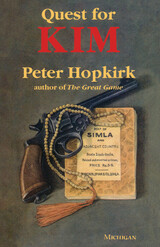 Quest for Kim: In Search of Kipling's Great Game
Peter Hopkirk
University of Michigan Press, 1999 This book is for all those who love Kim, the masterpiece of Indian life in which Kipling immortalized the Great Game, the centuries-old power struggle between Russia and Great Britain in the depths of Central Asia. Fascinated since childhood by this strange tale of an orphan boy's recruitment into the Indian secret service, Peter Hopkirk here explores the many mysteries surrounding Kipling's great novel.
"This is a fascinating, brilliantly written book, as interesting in its description of the author's journeys as it is in its investigation of the reality that lies behind 'the finest novel in the English language with an Indian theme,'" as Kim has been described by Nirad Chaudhuri." --T. J. Binyon, Times Literary Supplement
"In an original combination of autobiography, travel writing, and literary detective work, Hopkirk manages accessibly to tell the story of Kim and his own obsession with it. Hopkirk illustrates how creatively and thoroughly the reading of a work of fiction can shape a whole life's experience." -- John R. Bradley, Independent on Sunday
". . . a reminder of just how absorbing was the world Kipling knew, and how fabulous was his transformation of it into literature." --Richard Bernstein, New York Times
Peter Hopkirk has traveled widely over many years in the regions where his books are set--Central Asia, Russia, China, India, Pakistan, and the Middle East. His nearly twenty years with The Times included work as an Asian affairs specialist. His previous books include The Great Game, Foreign Devils on the Silk Road, Trespassers on the Roof of the World, Setting the East Ablaze, and Our Secret Service East of Constantinople. His works have been translated into twelve languages.
The Quest for Moral Foundations: An Introduction to Ethics
Montague Brown
Georgetown University Press A concise, yet engaging introduction to the field of ethics, this volume offers a systematic study of the foundations of moral responsibility. Montague Brown guides the reader on an examination of a wide range of ethical positions, including relativism, emotivism, egoism, utilitarianism, Kantian formalism, and natural law. Brown explains not only the history behind the development of each position, but also the roles science, democracy, and religion play in moral thinking today. Students and teachers of philosophy, ethics, and religion, as well as the general reader, will find that this book tackles the serious issues and offers an insightful, accessible introduction to major ethical positions and the great moral philosophers.
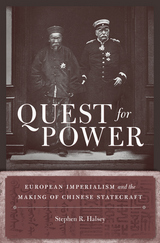 Quest for Power: European Imperialism and the Making of Chinese Statecraft
Stephen R. Halsey
Harvard University Press, 2015 China’s history in the nineteenth and early twentieth centuries has often been framed as a long coda of imperial decline, played out during its last dynasty, the Qing. Quest for Power presents a sweeping reappraisal of this narrative. Stephen Halsey traces the origins of China’s great-power status in the twentieth century to this era of supposed decadence and decay. Threats from European and Japanese imperialism and the growing prospect of war triggered China’s most innovative state-building efforts since the Qing dynasty’s founding in the mid-1600s.
Through a combination of imitation and experimentation, a new form of political organization took root in China between 1850 and 1949 that shared features with modern European governments. Like them, China created a military-fiscal state to ensure security in a hostile international arena. The Qing Empire extended its administrative reach by expanding the bureaucracy and creating a modern police force. It poured funds into the military, commissioning ironclad warships, reorganizing the army, and promoting the development of an armaments industry. State-built telegraph and steamship networks transformed China’s communication and transportation infrastructure. Increasingly, Qing officials described their reformist policies through a new vocabulary of sovereignty—a Western concept that has been a cornerstone of Chinese statecraft ever since. As Halsey shows, the success of the Chinese military-fiscal state after 1850 enabled China to avoid wholesale colonization at the hands of Europe and Japan and laid the foundation for its emergence as a global power in the twentieth century.
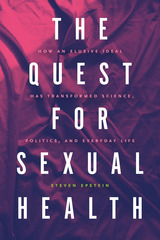 The Quest for Sexual Health: How an Elusive Ideal Has Transformed Science, Politics, and Everyday Life
Steven Epstein
University of Chicago Press, 2022 Offering an entryway into the distinctive worlds of sexual health and a window onto their spillover effects, sociologist Steven Epstein traces the development of the concept and parses the debates that swirl around it.
Since the 1970s, health professionals, researchers, governments, advocacy groups, and commercial interests have invested in the pursuit of something called "sexual health." Under this expansive banner, a wide array of programs have been launched, organizations founded, initiatives funded, products sold—and yet, no book before this one asks: What does it mean to be sexually healthy? When did people conceive of a form of health called sexual health? And how did it become the gateway to addressing a host of social harms and the reimagining of private desires and public dreams?
Conjoining "sexual" with "health" changes both terms: it alters how we conceive of sexuality and transforms what it means to be healthy, prompting new expectations of what medicine can provide. Yet the ideal of achieving sexual health remains elusive and open-ended, and the benefits and costs of promoting it are unevenly distributed across genders, races, and sexual identities. Rather than a thing apart, sexual health is intertwined with nearly every conceivable topical debate—from sexual dysfunction to sexual violence, from reproductive freedom to the practicalities of sexual contact in a pandemic. In this book Steven Epstein analyzes the rise, proliferation, uptake, and sprawling consequences of sexual health activities, offering critical tools to assess those consequences, expand capacities for collective decision making, and identify pathways that promote social justice.
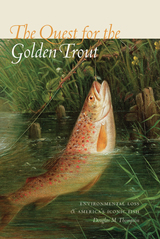 The Quest for the Golden Trout: Environmental Loss and America’s Iconic Fish
Douglas M. Thompson
University Press of New England, 2013 The angler’s dream of fishing pristine waters in unspoiled country for sleek, healthy trout has turned fishing into a form of theater. It is a manufactured experience—much to the detriment of our rivers and streams. Americans’ love of trout has reached a level of fervor that borders on the religious. Federal and state agencies, as well as nongovernmental lobbying groups, invest billions of dollars on river restoration projects and fish-stocking programs. Yet, their decisions are based on faulty logic and risk destroying species they are tasked with protecting. River ecosystems are modified with engineered structures to improve fishing, native species that compete with trout are eradicated, and nonnative invasive game fish are indiscriminately introduced, genetically modified, and selectively bred to produce more appealing targets for anglers—including the freakishly contrived “golden trout.” The Quest for the Golden Trout is about looking at our nation’s rivers with a more critical eye—and asking more questions about both historic and current practices in fisheries management.
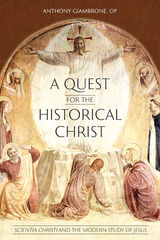 A Quest for the Historical Christ: Scientia Christi and the Modern Study of Jesus
Anthony Giambrone, OP
Catholic University of America Press, 2021 A Catholic Quest for the Historical Christ brings together a collection of interrelated essays on the historical Jesus and primitive Christology. Sensitive to the diverse, but traditionally Protestant assumptions and perspectives of the "Quest" as well as to the widely lamented disconnect between New Testament exegesis and classical dogmatic theology, an alternative approach is proposed in these pages. Ecumenical and conciliar reference points, along with non-confessional historical methods (e.g. archeology) shape the basic project, which nevertheless assumes some distinctive and important Catholic contours. This particular synthesis injects the voice of a missing interlocutor into an established conversation that has not infrequently been both historically confused and dogmatically (and philosophically) numb.
The book is divided into three sections: Historical Foundations, Theological Perspectives, and Jesus and the Scriptures. While the individual chapters represent independent probes, the cumulative argument and arc of the study drives in clear and concerted directions. After a first approach to the Gospel data, attentive at once to historiographical and historical questions, a series of interventions reorienting the present scholarly discussion are suggested. These various, foundational essays lead, finally, to a sustained mediation on the mind of Christ, considered as a unique reader of the Scriptures: a meditation having its proper reflex and reflection in the way Christians themselves, as readers of the Gospels, participate in the Lord's own encounter with the living Word.
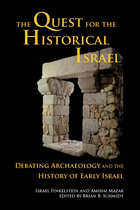 The Quest for the Historical Israel: Debating Archaeology and the History of Early Israel
Israel Finkelstein
SBL Press, 2007 Three decades of dialogue, discussion, and debate within the interrelated disciplines of Syro-Palestinian archaeology, ancient Israelite history, and Hebrew Bible over the question of the relevance of the biblical account for reconstructing early Israel’s history have created the need for a balanced articulation of the issues and their prospective resolutions. This book brings together for the first time and under one cover, a currently emerging “centrist” paradigm as articulated by two leading figures in the fields of early Israelite archaeology and history. Although Finkelstein and Mazar advocate distinct views of early Israel’s history, they nevertheless share the position that the material cultural data, the biblical traditions, and the ancient Near Eastern written sources are all significantly relevant to the historical quest for Iron Age Israel. The results of their research are featured in accessible, parallel syntheses of the historical reconstruction of early Israel that facilitate comparison and contrast of their respective interpretations. The historical essays presented here are based on invited lectures delivered in October of 2005 at the Sixth Biennial Colloquium of the International Institute for Secular Humanistic Judaism in Detroit, Michigan.
The Quest: History and Meaning in Religion
Mircea Eliade
University of Chicago Press, 1969 In The Quest Mircea Eliade stresses the cultural function that a study of the history of religions can play in a secularized society. He writes for the intelligent general reader in the hope that what he calls a new humanism "will be engendered by a confrontation of modern Western man with unknown or less familiar worlds of meaning."
"Each of these essays contains insights which will be fruitful and challenging for professional students of religion, but at the same time they all retain the kind of cultural relevance and clarity of style which makes them accessible to anyone seriously concerned with man and his religious possibilities."—Joseph M. Kitagawa, Religious Education
 The Quest of the Absolute: Birth and Decline of European Romanticism
Louis Dupre
University of Notre Dame Press, 2013 This eagerly awaited study brings to completion Louis Dupré's planned trilogy on European culture during the modern epoch. Demonstrating remarkable erudition and sweeping breadth, The Quest of the Absolute analyzes Romanticism as a unique cultural phenomenon and a spiritual revolution. Dupré philosophically reflects on its attempts to recapture the past and transform the present in a movement that is partly a return to premodern culture and partly a violent protest against it.
Following an introduction on the historical origins of the Romantic Movement, Dupré examines the principal Romantic poets of England (Wordsworth, Coleridge, Shelley, Keats), Germany (Goethe, Schiller, Novalis, Hölderlin), and France (Lamartine, de Vigny, Hugo), all of whom, from different perspectives, pursued an absolute ideal. In the chapters of the second part, he concentrates on the critical principles of Romantic aesthetics, the Romantic image of the person as reflected in the novel, and Romantic ethical and political theories. In the chapters of the third, more speculative, part, he investigates the comprehensive syntheses of romantic thought in history, philosophy, and theology.
The Quest of the Absolute is an important work both as the culmination of Dupré's ongoing project and as a classic in its own right. The book will meet the expectations of the specialist as well as appeal to more general readers with philosophical, cultural, and religious interests.
"The Quest of the Absolute is the third volume in Louis Dupré's trilogy dealing with the origins and development of modernity and the major cultural currents defining its history. It follows Passage to Modernity (1993) and The Enlightenment and the Intellectual Foundations of Modern Culture (2004). This third volume deals with the Romantic movement. Dupré's impressive account is concerned to restore something of the full dimensionalities to Romanticism as a whole, to acknowledge something of the immense intellectual, political, and spiritual ambitions at work in it, without reneging on a reflective critical relation to it." —William Desmond, author of The Intimate Strangeness of Being: Metaphysics after Dialect
“Louis Dupré’s fascinating portrayal of the Romantic soul urges us to look afresh at this crucial ‘third wave’ of modernity. His thorough insight, astonishing erudition, mild judgment, and unparalleled perspicacity bring to life the works and ideas of many whimsical personalities. He convincingly demonstrates that their restless search for existential depth and authenticity reveals layers of truth and meaning that can function as a mirror for our times.” —Joris Geldhof, Catholic University of Leuven, Belgium
"In this extraordinarily comprehensive and penetrating study, the capstone to a great scholarly career, Louis Dupré undertakes nothing less than a grand synthesis of Romantic thought; yet the book is beautifully written and a joy to read. Discussions of English, French, and German poetry and fiction are seamlessly linked to systematic analyses of Romantic aesthetics, psychology, and ethics, as well as such other aspects of Romantic thought as the new religious and historical conceptions that emerge in the period. The Quest of the Absolute is a brilliant, indeed indispensable, book, one that demonstrates, more clearly than any previous study, why Romanticism is still relevant to the struggles that confront us in the twenty-first century." —Henry Weinfield, University of Notre Dame
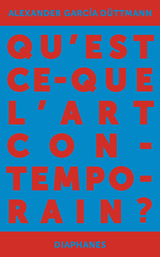 Qu’est-ce que l’art contemporain ?
Alexander García Düttmann
Diaphanes, 2019 Il est difficile de concevoir un art qui soit aussi étroitement lié à son présent que ne l’est l’art contemporain. En effet, l’art contemporain est issu d’une rupture inouïe avec les pratiques artistiques du passé. Il semble prendre son point de départ dans une profonde amnésie par rapport à ce qui le précède. Les distinctions esthétiques traditionnelles, entre forme et contenu, autonomie et hétéronomie, ou oeuvre et critique, ne sont plus pertinentes quand il s’agit de cet art. Mais qu’est-ce qu’alors que l’art contemporain? Cette question a pu être posée par l’historien, le théoricien, voire le sociologue de l’art. Mais elle n’a pas encore été soulevée comme question philosophique – comme question qui cherche à établir l’essence de l’art contemporain. La réponse donnée, dans ce livre, à ladite question est double. D’une part, elle est positive: dans son essence, l’art contemporain est la fiction d’un pur faire. D’autre part, elle est négative: l’art contemporain est le site où se révèle comme nulle part ailleurs l’idéologie politique du capitalisme néolibéral.
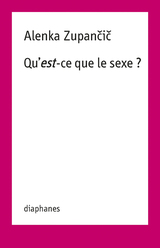 Qu’est-ce que le sexe ?
Alenka Zupancic
Diaphanes, 2019 La satisfaction de parler contient en soi une clé de la satisfaction sexuelle (et non l‘inverse) – une clé de la sexualité et de ses propres contradictions. Alenka Zupančič aborde la question de la sexualité comme un problème proprement philosophique de la psychanalyse – celle de Freud et de Lacan – et non celle des praticiens cliniciens tels que décrits par Lacan « orthopédistes de l‘inconscient ». Que se passe-t-il, comme l’affirme Lacan, si nous pouvons obtenir exactement la même satisfaction que le sexe par la parole, l’écriture, la peinture, la prière ou autres activités) ? Il ne s’agit pas d‘expliquer la satisfaction que procure la parole en indiquant son origine sexuelle, mais bien de souligner que la satisfaction de parler est elle-même sexuelle.
Alenka Zupančič soutient que la sexualité est à la limite d’un « circuit court » entre ontologie et épistémologie. La sexualité et le savoir sont structurés autour d‘une négativité fondamentale qui les unit au point de l’inconscient. L’inconscient (en tant que lien avec la sexualité) est le concept d‘un lien inhérent entre l’être et la connaissance dans leur négativité même.
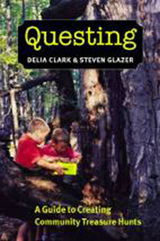 Questing: A Guide to Creating Community Treasure Hunts
Delia Clark and Steven Glazer
University Press of New England, 2006 Inspired by the British pastime of "letterboxing," questing has become one of the fastest growing recreational-educational activities on this side of the Atlantic. In scores of communities, people from toddlers and teens, parents and grandparents follow maps, clues, and rhyming riddles seeking treasure boxes hidden in natural and cultural locations. In this book, two experts in community education explain how individuals and organizations can create and organize permanent quests to foster place-based education, stewardship, adventure, and fun. In the process of undertaking quests participants "celebrate and strengthen community life" by forging "lifelong connections to the distinct landscapes and cultural features of their home ground." This book is intended to offer inspiration and practical advice for parents, teachers, community group leaders, and others interested in learning about where they live and building community ties through questing. Questing draws upon the well-established success of a program in New England in which individuals, students, and organizations create clues and maps highlighting the special places and stories of their community. The book presents a rationale for place-based education and quest program goals and objectives that can easily be implemented in any community.
 Questing Fictions: Latin America’s Family Romance
Djelal KadirForeword by Terry Cochran
University of Minnesota Press, 1986 Questing Fictions was first published in 1986. Minnesota Archive Editions uses digital technology to make long-unavailable books once again accessible, and are published unaltered from the original University of Minnesota Press editions. Questing Fictions analyzes twentieth-century Latin American fiction in the light of contemporary literary theory. Djelal Kadir examines key works by several writers—including Jorges Luis Borges, Octavio Paz, Lezama Lima, Alejo Carpentier, Juan Rulfo, and Carlos Fuentes—and demonstrates how these writers are obliged to invent their own reality and how their successors inevitably must continue that inventive tradition. In a larger sense, Kadir describes how works of literature originate and, in turn, generate other literary works. Aiming at the specific nature of discourse written from the perspective of non-European cultures, Questing Fictions identifies and focuses on the predicament of writers caught between the cultural domination of Europe and the need to strive for cultural autonomy. Kadir explains that this predicament is shared by all Latin American authors and may well characterize all recently emergent literatures. He traces the problems of continuity and rupture within the Latin American tradition and addresses, as well, deeper questions of narrative and narration. In the process, Kadir reveals the interrelatedness of the continent's principal fables and shows their relationship to the larger Western tradition. Finally, Questing Fictions posits that Latin American narratives cannot escape the the quest for an identity that they can never fully attain.
The Question of Animal Culture
Kevin N. Laland
Harvard University Press, 2009 Fifty years ago, a troop of Japanese macaques was observed washing sandy sweet potatoes in a stream, sending ripples through the fields of ethology, comparative psychology, and cultural anthropology. The issue of animal culture has been hotly debated ever since. Now Kevin Laland and Bennett Galef have gathered key voices in the often rancorous debate to summarize the views along the continuum from “Culture? Of course!” to “Culture? Of course not!” The result is essential reading for anyone interested in the validity of animal culture, and what it might say about our own.
 A Question of Balance: How France and the United States Created Cold War Europe
Michael Creswell
Harvard University Press, 2006 Challenging standard interpretations of American dominance and French weakness in postwar Western Europe, Michael Creswell argues that France played a key role in shaping the cold war order. In the decade after the war, the U.S. government's primary objective was to rearm the Federal Republic of Germany within the framework of a European defense force--the European Defense Community. American and French officials differed, however, over the composition of the EDC and the rules governing its organization and use.
Although U.S. pressure played a part, more decisive factors--in both internal French politics and international French concerns--ultimately led France to sanction the plan to rearm West Germany. Creswell sketches the successful French challenge to the United States, tracing the genuine, sometimes heated, debate between the two nations that ultimately resulted in security arrangements preferred by the French but acceptable to the Americans.
Impressively researched and vigorously argued, A Question of Balance advances significantly our understanding of power politics and the rise of the cold war system in Western Europe.
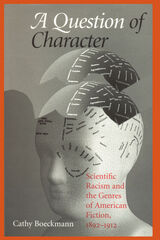 A Question of Character: Scientific Racism and the Genres of American Fiction, 1892-1912
Catherine Ann Boeckmann
University of Alabama Press, 2005 Boeckmann links character, literary genre, and science, revealing how major literary works both contributed to and disrupted the construction of race in turn-of-the-century America.
In A Question of Character, Cathy Boeckmann establishes a strong link between racial questions and the development of literary traditions at the end of the 19th century in America. This period saw the rise of "scientific racism," which claimed that the races were distinguished not solely by exterior appearance but also by a set of inherited character traits. As Boeckmann explains, this emphasis on character meant that race was not only a thematic concern in the literature of the period but also a generic or formal one as well.
Boeckmann explores the intersections between race and literary history by tracing the language of character through both scientific and literary writing. Nineteenth-century pseudo-sciences such as phrenology and physiognomy had a vocabulary for discussing racial character that overlapped conceptually with the conventions for portraying race in literature. Through close readings of novels by Thomas Dixon, Mark Twain, William Dean Howells, Charles Chesnutt, and James Weldon Johnson—each of which deals with a black character "passing" as white—Boeckmann shows how this emphasis on character relates to the shift from romantic and sentimental fiction to realism. Because each of these genres had very specific conventions regarding the representation of character, genres often dictated how races could be depicted.
A Question of Class: The Redneck Stereotype in Southern Fiction
Duane Carr
University of Wisconsin Press, 1997 “Rednecks” have long been subjects of scorn and ridicule, especially in the South. Carr probes the historical and sociological reasons for the descent of this social class into poverty, their inability to rise above it, and their continuing subjugation to a stereotype developed by others—and all too often accepted by themselves. Carr also records the progress in Southern fiction of this negative stereotype, from antebellum writers who saw rednecks as threats to the social order, to post-Civil War writers who lamented the lost potential of these people and urged sympathy and understanding, to contemporary writers who favor acceptance. Ultimately, this work is an evaluation of individual Southern fiction writers in their capacity to rise above stereotyping.
The Question of Embodiment, Volume 15
Elizabeth Weed and Ellen Rooney, eds.
Duke University Press This special issue of differences addresses the realization that "nature" and "nurture" are now seen to be inseparably and dynamically related in the determination of human cultural expression, rather than divided as previously thought. Contributors delve into this dynamic relationship, approaching it particularly from a feminist perspective. Contributors. Anne Fausto-Sterling, Petra Kuppers, Jennifer Reardon, Gayle Salamon, Elizabeth A. Wilson
The Question of God in Heidegger's Phenomenology
George Kovacs
Northwestern University Press, 1990 Several philosophers have developed theological perspectives out of Heidegger's ontology. Yet the question of God in Heidegger's thought itself has never received full elucidation. In this revealing new study, George Kovacs poses the problem of analyzing the idea of God as a process of questioning and thus subjects Heidegger's phenomenological existentialism to a process of exposition Heidegger himself employed.
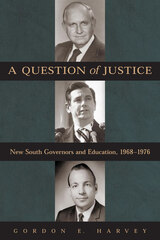 A Question of Justice: New South Governors and Education, 1968-1976
Gordon E. Harvey
University of Alabama Press, 2005 Three trailblazers for education reform in the Sunbelt South. In southern politics, 1970 marked a watershed. A group of southern governors entered office that year and changed both the way the nation looked at the South and the way the constituents of those states viewed themselves. Reubin Askew in Florida, John West in South Carolina, Jimmy Carter in Georgia, and Albert Brewer in Alabama all represented a new breed of progressive moderate politician that helped demolish Jim Crow segregation and the dual economies, societies, and educational systems notorious to the Sunbelt South. Historian Gordon Harvey explores the political lives and legacies of three of these governors, examining the conditions that led to such a radical change in political leadership, the effects their legislative agendas had on the identity of their states, and the aftermath of their terms in elected office. A common thread in each governor's agenda was educational reform. Albert Brewer's short term as Alabama governor resulted in a sweeping education package that still stands as the most progressive the state has seen. Reubin Askew, far more outspoken than Brewer, won the Florida gubernatorial election through a campaign that openly promoted desegregation, busing, and tax reform as a means of equal school funding. John West's commitment to a policy of inclusion helped allay fears of both black and white parents and made South Carolina's one of the smoothest transitions to integrated schools. As members of the first generation of New South governors, Brewer, Askew, and West played the role of trailblazers. Their successful assaults on economic and racial injustice in their states were certainly aided by such landmark events as Brown v. Board of Education, the civil rights movement, and the expansion of voting rights-all of which sounded the death knell for the traditional one-party segregated South. But in this critical detailing of their work for justice, we learn how these reform-minded men made education central to their gubernatorial terms and, in doing so, helped redefine the very character of the place they called home.
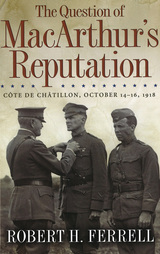 The Question of MacArthur's Reputation: Côte De Châtillon, October 14-16, 1918
Robert H. Ferrell
University of Missouri Press, 2008 Perhaps the best known of all American five-star generals, Douglas MacArthur established his military reputation at the hill of Châtillon during the great battle of the Meuse-Argonne in World War I. The thirty-eight-year-old brigadier general in command of the Eighty-fourth Infantry Brigade boasted to a fellow general that he had inspired his troops by example, taking the hill and breaking the main German line in northern France. Ever since, historical accounts and biographies have celebrated his leadership and bravery. That MacArthur’s forces prevailed is beyond question, as military historians have shown. Yet in all the annals of the Great War there is no detailed description of what happened at Châtillon, nor of what MacArthur had to do with it. Robert Ferrell examines those events and comes to a startling conclusion—one that will revise how we view this archetypal American hero. After sifting through the inexact accounts of the battle found in regimental and divisional histories—and through the many biographies of MacArthur that assert his leadership at Châtillon but do not describe it—Ferrell has gone into Army records to determine if what MacArthur claimed was true. In a moment-by-moment account of the battle, he reconstructs the movements of troops and the decisions of officers to show in detail how MacArthur’s subordinates were the true heroes. Ferrell describes how the taking of Côte de Châtillon could have been a disaster had the Eighty-fourth Brigade followed MacArthur's original plan, a bayonet charge at night. Wiser heads prevailed, and the attack of the Iowa and Alabama regiments was a great success. Ferrell has completed a chapter in the history of World War I that has stood unfinished for years, showing in masterly fashion how MacArthur exaggerated his reputation at Châtillon. The Question of MacArthur’s Reputation will reward historians seeking to fill gaps in the record, engage readers who enjoy descriptions of battle, and startle all who take their heroes for granted.
A Question of Quality: Popularity and Value in Modern Creative Writing
Edited by Louis Filler
University of Wisconsin Press, 1976 The subjects treated in this symposium have one major characteristic in common, that they have recently, or relatively recently, enjoyed high popularity among readers. Also, they have received from substantial to torrents of comment.
A Question of Seeing: Poems
Donald Finkel
University of Arkansas Press, 1998 In lines electrified with lyricism and wit, Donald Finkel carves a clearing out of the backyard brush and the intellectual brambles of existence. Whether he writes a short lyric or a long experimental series, Finkel relies on concrete images—a breeze through grass, a cigarette in a piano player’s hand—to ground his central questions about the clash of order and chaos in our everyday lives. He delights in naming weeds and towering trees, cars and streets. Yet, in each poem, there is a constant tension between the actual wind and the words we must use to convey the wind’s force. Working fluently in formal lines and in free verse, he can write with equal authority of butchers or great painters, aged bookkeepers or schizophrenics, Greek gods or house cats. In this new collection, Finkel has given us the priceless keepsakes, the best gifts from the clearing his words have won.
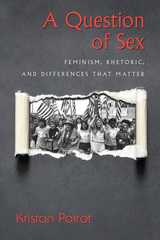 A Question of Sex: Feminism, Rhetoric, and Differences That Matter
Kristan Poirot
University of Massachusetts Press, 2014 By the mid-1990s feminist theorists and critics began to challenge conventional thinking about sex difference and its relationship to gender and sexuality. Scholars such as Anne Fausto-Sterling and Judith Butler troubled the sex-gender/nature-nurture divide. Some have asserted that these questions about sex are much too abstract to contribute to a valuable understanding of the material politics faced by feminist movements. In A Question of Sex, Kristan Poirot challenges this assumption and demonstrates that contemporary theories about sex, gender, identity, and difference compel a rethinking of the history of feminist movements and their rhetorical practices.
Poirot focuses on five case studies—the circulation of Sojourner Truth's "Ain't I a Woman?" in early and contemporary feminist contexts; the visual rhetorics of the feminist self-help health movement; the public discourse of Elizabeth Cady Stanton and early nineteenth-century ideas about suffrage, sex, and race; the conflicts over lesbian sexuality in the 1960s and 1970s; and the discourse that surrounds twenty-first-century SlutWalks. In the process, Poirot rethinks the terms through which we understand U.S. feminist movements to explore the ways feminism has questioned sexed distinctions and practices over time. She emphasizes the importance of reading feminist engagements with sex as rhetorical endeavors—practices that are shaped by the instrumental demands of movements, the exigent situations that call for feminists to respond, and the enduring philosophical traditions that circulate in U.S. political contexts., reviewing a previous edition or volume
The Question of the Commons: The Culture and Ecology of Communal Resources
Edited by Bonnie J. McCay and James M. Acheson
University of Arizona Press, 1987 This collection of eighteen original essays evaluates the use and misuse of common-property resources, taking as its starting point ecologist Garret Hardin's assertion in "The Tragedy of the Commons" that common property is doomed to overexploitation in any society. This book represents the first cross-cultural test of Hardin's argument and argues that, while tragedies of the commons do occur under some circumstances, local institutions have proven resilient and responsive to the problems of communal resource use.
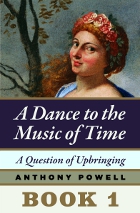 A Question of Upbringing: Book 1 of A Dance to the Music of Time
Anthony Powell
University of Chicago Press, 1995 Anthony Powell’s universally acclaimed epic A Dance to the Music of Time offers a matchless panorama of twentieth-century London. Now, for the first time in decades, readers in the United States can read the books of Dance as they were originally published—as twelve individual novels—but with a twenty-first-century twist: they’re available only as e-books.
A Question of Upbringing (1951) introduces us to the young Nick Jenkins and his housemates at boarding school in the years just after World War I. Boyhood pranks and visits from relatives bring to life the amusements and longueurs of schooldays even as they reveal characters and traits that will follow Jenkins and his friends through adolescence and beyond: Peter Templer, a rich, passionate womanizer; Charles Stringham, aristocratic and louche; and Kenneth Widmerpool, awkward and unhappy, yet strikingly ambitious. By the end of the novel, Jenkins has finished university and is setting out on a life in London; old ties are fraying, new ones are forming, and the first steps of the dance are well underway. "Anthony Powell is the best living English novelist by far. His admirers are addicts, let us face it, held in thrall by a magician."—Chicago Tribune
"A book which creates a world and explores it in depth, which ponders changing relationships and values, which creates brilliantly living and diverse characters and then watches them grow and change in their milieu. . . . Powell's world is as large and as complex as Proust's."—Elizabeth Janeway, New York Times
"One of the most important works of fiction since the Second World War. . . . The novel looked, as it began, something like a comedy of manners; then, for a while, like a tragedy of manners; now like a vastly entertaining, deeply melancholy, yet somehow courageous statement about human experience."—Naomi Bliven, New Yorker “The most brilliant and penetrating novelist we have.”—Kingsley Amis
“There is no other work in the annals of European fiction that attempts meticulously to recreate half a century of history, decade by decade, with anything like the emotional precision or details of Powell’s twelve volumes. Neither Balzac’s panorama of the Restoration, nor Zola’s chronicles of the Second Empire, nor Proust’s reveries in the Belle Epoque can match a comparable span of time, an attention to variations within it, or a compositional intricacy capable of uniting them into a single narrative. . . . The elegance of this artifice was only compatible with comedy.”—Perry Anderson
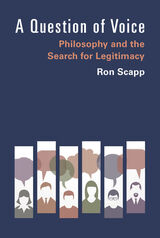 A Question of Voice: Philosophy and the Search for Legitimacy
Ron Scapp
University of Michigan Press, 2020 A Question of Voice: Philosophy and the Search for Legitimacy offers an explicit and comprehensive consideration of voice as a complex of rethinking aspects of the history of philosophy through issues of power, as well as contemporary issues that include and involve the desire for and the dynamics of legitimacy, for individuals and communities. By identifying voice as a significant theme and means by which and through which we might better engage some important philosophical questions, Ron Scapp hopes to expand traditional philosophical discussion and discourse regarding questions about validity, legitimacy, empathy, and solidarity. He offers an innovative perspective that is informed and guided by multiculturalism, ethnic studies, queer studies, feminism, and thinkers and critics such as bell hooks, Barbara Christian, Angela Davis, Jacques Derrida, Michel Foucault, among others. A Question of Voice is an American investigation, but also suggests questions that emanate from contemporary continental thought as well as issues that arise from transnational perspectives—an approach that is motived by doing philosophy in an age of multiculturalism.
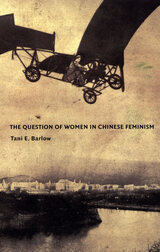 The Question of Women in Chinese Feminism
Tani E. Barlow
Duke University Press, 2004 The Question of Women in Chinese Feminism is a history of thinking about the subject of women in twentieth-century China. Tani E. Barlow illustrates the theories and conceptual categories that Enlightenment Chinese intellectuals have developed to describe the collectivity of women. Demonstrating how generations of these theorists have engaged with international debates over eugenics, gender, sexuality, and the psyche, Barlow argues that as an Enlightenment project, feminist debate in China is at once Chinese and international. She reads social theory, psychoanalytic thought, literary criticism, ethics, and revolutionary political ideologies to illustrate the range and scope of Chinese feminist theory’s preoccupation with the problem of gender inequality. She reveals how, throughout the cataclysms of colonial modernity, revolutionary modernization, and market socialism, prominent Chinese feminists have gathered up the remainders of the past and formed them into social and ethical arguments, categories, and political positions, ceaselessly reshaping progressive Enlightenment sexual liberation theory.
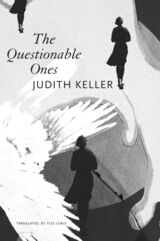 The Questionable Ones
Judith Keller
Seagull Books, 2023 A brilliant collection of micro-fiction, reflecting our fragmented times.
With quirky humor and wry insight, Swiss author Judith Keller’s micro-fictions unravel the fabric of daily life. She delves into the aporia of language by taking idiomatic expressions literally, unpacking the multiple meanings of words, and confounding expectations. Seven Zurich tram stops provide the framework for these familiar yet absurd portraits of passers-by, fellow passengers on the tram, the unemployed and the overemployed, the innocent and the suspicious, young mothers and confused elderly. The reader is taken on a journey through the city and offered glimpses of people going more or less successfully about their lives. These deceptively banal glimpses, however, show us more than we expect—they turn the lens back on us, puncture our complacency and ask, "Who are you to judge?"
The characters are hapless and far-fetched, trying to find their footing on shifting ground and grateful for what happiness they can find. In just a sentence or two, Keller unlocks metaphysical trapdoors. The Questionable Ones offers a collection of snapshots that reveal the extraordinary lurking inside the ordinary and the ordinary at the core of the extraordinary.
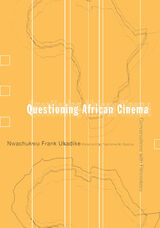 Questioning African Cinema: Conversations With Filmmakers
Nwachukwu Frank Ukadike
University of Minnesota Press, 2002 The most comprehensive account available of filmmaking in Africa today Diverse in their art, paradoxically more celebrated abroad than they are at home, African filmmakers eke out their visions against a backdrop of complex historical, social, economic, and political practices. The richness of their accomplishments emerges with compelling clarity in this book, in which African filmmakers speak candidly about their work. Featuring interviews with key personalities from twelve nations, Questioning African Cinema provides the most extensive, comprehensive account ever given of the origins, practice, and implications of filmmaking in Africa. Speaking with pioneers Med Hondo, Souleymane Cissé, and Kwaw Ansah; renowned feature filmmakers Djibril Mambéty, Haile Gerima, and Safi Faye; and award-winning younger filmmakers Idrissa Ouedraogo, Cheick Oumar Sissoko, and Jean-Pierre Bekolo, N. Frank Ukadike identifies trends and individual practices even as he surveys the evolution of African cinema and addresses the politics and problems of seeing Africa through an African lens. Situating the unique achievement of each filmmaker within the geographic, historical, social, and political context of African cinema, he also explores questions about acting, distribution and exhibition, history, theory and criticism, video-based television production, and television’s relationship to independent film.
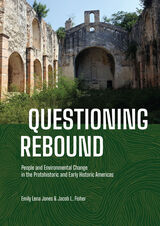 Questioning Rebound: People and Environmental Change in the Protohistoric and Early Historic Americas
Emily Lena Jones and Jacob L. Fisher
University of Utah Press, 2022 The extent of human impact on world environments is undeniable. At scales ranging from local to global, investigations continue to demonstrate that the ecosystems to which we currently belong are structured by human behavior. Catastrophic events such as war, disaster, disease, or economic decay have, at various times throughout history, led to the human abandonment of particular environments. What happens to a human-structured environment when the manner in which people use it abruptly changes? In Questioning Rebound, authors Emily Lena Jones and Jacob L. Fisher explore the archaeological record of the Americas during the period immediately following European contact, a time when the human footprint on the land abruptly shifted. During this era of disease-driven mortality, genocide, incarceration, and forced labor of Indigenous peoples, American landscapes changed in fundamental ways, producing short-lived ecosystems that later became the basis of myths regarding the natural state of environments across the Americas.
Questioning Rebound explores the record and the causes of environmental change during the period following European contact, featuring case studies throughout the Americas. While both the record for and the apparent causes of the changes in the human footprint vary, the record of post- contact environmental change consistently reflects the impacts of past social upheaval.
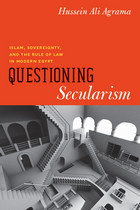 Questioning Secularism: Islam, Sovereignty, and the Rule of Law in Modern Egypt
Hussein Ali Agrama
University of Chicago Press, 2012 The central question of the Arab Spring—what democracies should look like in the deeply religious countries of the Middle East—has developed into a vigorous debate over these nations’ secular identities. But what, exactly, is secularism? What has the West’s long familiarity with it inevitably obscured? In Questioning Secularism, Hussein Ali Agrama tackles these questions. Focusing on the fatwa councils and family law courts of Egypt just prior to the revolution, he delves deeply into the meaning of secularism itself and the ambiguities that lie at its heart. Drawing on a precedent-setting case arising from the family law courts —the last courts in Egypt to use Shari‘a law—Agrama shows that secularism is a historical phenomenon that works through a series of paradoxes that it creates. Digging beneath the perceived differences between the West and Middle East, he highlights secularism’s dependence on the law and the problems that arise from it: the necessary involvement of state sovereign power in managing the private spiritual lives of citizens and the irreducible set of legal ambiguities such a relationship creates. Navigating a complex landscape between private and public domains, Questioning Secularism lays important groundwork for understanding the real meaning of secularism as it affects the real freedoms of a citizenry, an understanding of the utmost importance for so many countries that are now urgently facing new political possibilities.
 Questioning the Super-Rich
Jennifer Smith Maguire and Paula Serafini, special issue editors
Duke University Press This special issue of Cultural Politics uses the super-rich as a lens for exploring the impact of wealth and power on class mentalities, identities, and cultures. Contributors from a range of disciplines including sociology, economic geography, and cultural studies examine topics such as the media representations and lived experiences of the super-rich, the spatial distribution and concentration of wealth, and the discourses of (de)legitimization surrounding wealth. Throughout these essays, contributors identify the infrastructures that perpetuate and exacerbate inequalities—from politics and policy to financial devices and systems—and analyze emerging tensions within and between the categories of on/off-shore wealth, new/old money, and public/private spheres of wealth. The collection will influence the sociocultural study of elites and the study of the cultural and global repercussions of financialized capitalism.
Contributors. Jonathan Beaverstock, Roger Burrows, Aeron Davis, Sarah Hall, Caroline Knowles, Jo Littler, Joanne Roberts, Elisabeth Schimpföss, Paula Serafini, Jennifer Smith Maguire
Questioning Traumatic Heritage: Spaces of Memory in Europe and South America
Ihab Saloul
Amsterdam University Press, 2024 This book takes as its object of investigation an array of traumatic heritage sites and spaces of memory, including museums, former detention camps, and sites of commemoration, in Europe, Argentina, and Colombia, to investigate how various traumatic pasts can be preserved and transmitted through space, and which kind of actions might be taken both to improve knowledge of the past and to serve as an opening to a discussion of current social issues.
 Questions About Angels
Billy Collins
University of Pittsburgh Press, 1999 Billy Collins has emerged as the most beloved American poet since Robert Frost, garnering critical acclaim and broad popular appeal. Annie Proulx admits, "I have never before felt possessive about a poet, but I am fiercely glad that Billy Collins is ours."
This special, limited edition celebrates Billy Collins's years as U.S. Poet Laureate. Questions About Angels--one of the books that helped establish and secure his reputation and popularity during the 1990s--is remarkable for its wry, inquisitive voice and its sheer imaginative range. Edward Hirsch selected this classic book for the National Poetry Series, and each of Collins's poems-from his meditation on forgetfulness to his musings on the behavior of angels-is an exploration of imaginative possibilities. Whether reading him for the first time or the fiftieth, this collector's edition is a must-have for anyone interested in the poet the New York Times calls simply "the real thing."
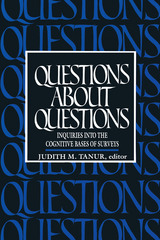 Questions About Questions: Inquiries into the Cognitive Bases of Surveys
Judith M. Tanur
Russell Sage Foundation, 1992 The social survey has become an essential tool in modern society, providing crucial measurements of social change, describing social life, and guiding government policy. But the validity of surveys is fragile and depends ultimately upon the accuracy of answers to survey questions. As our dependence on surveys grows, so too have questions about the accuracy of survey responses. Authored by a group of experts in cognitive psychology, linguistics, and survey research, Questions About Questions provides a broad review of the survey response problem. Examining the cognitive and social processes that influence the answers to questions, the book first takes up the problem of meaning and demonstrates that a respondent must share the survey researcher's intended meaning of a question if the response is to be revealing and informative. The book then turns to an examination of memory. It provides a framework for understanding the processes that can introduce errors into retrospective reports, useful guidance on when those reports are more or less trustworthy, and investigates techniques for the improvement of such reports. Questions about the rigid standardization imposed on the survey interview receive a thorough airing as the authors show how traditional survey formats violate the usual norms of conversational behavior and potentially endanger the validity of the data collected. Synthesizing the work of the Social Science Research Council's Committee on Cognition and Survey Research, Questions About Questions emphasizes the reciprocal gains to be achieved when insights and techniques from the cognitive sciences and survey research are exchanged. "these chapters provide a good sense of the range of survey problems investigated by the cognitive movement, the methods and ideas it draws upon, and the results it has yielded." —American Journal of Sociology
Questions and Their Retinue: Selected Poems of Hatif Janabi
Hatif Janabi
University of Arkansas Press, 1996 Hatif Janabi’s poems are passionate, jolting, apocalyptic, and painful. They deal with war and death, perception and truth, drawing from his family life, his exile in Poland, the Gulf War, violence in Iraq, and his experience in the United States. The speaker in many of Janabi’s poems moves from a confrontational stance to one of resigned desperation, and from coyness to deep longing, where, occasionally, hope surfaces. The associative processes and the often bizarre surreal imagery he employs are very effective in expressing his profound sense of political and spiritual alienation. Janabi is among a generation of Arab poets who, because of censorship, can speak only obliquely about the harsh reality of their lives. In these poems he has created symbolic landscapes that attempt to reveal the political, social, and psychological stresses with which suffering people live.
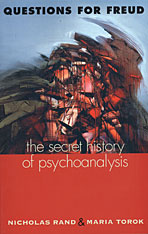 Questions for Freud: The Secret History of Psychoanalysis
Nicholas Rand and Mária Török
Harvard University Press, 2000 With all the intrigue and twists of a mystery, Questions for Freud uncovers the paradoxes that riddle psychoanalysis today and traces them to Freud's vacillation at key points in his work--and from there to a traumatic event in Freud's life.
What role did censored family history play in shaping Freud's psychological inquiries, promoting and impeding them by turns? With this question in mind, Nicholas Rand and Maria Torok develop a new biographical and conceptual approach to psychoanalysis, one that outlines Freud's contradictory theories of mental functioning against the backdrop of his permanent lack of insight into crucial and traumatic aspects of his immediate family's life. Taking us through previously unpublished documents and Freud's dreams, his clinical work and institutional organization, the authors show how a shameful event in 1865 that shook Freud and his family can help explain the internal clashes that later beset his work--on the origins of neurosis, reality, trauma, fantasy, sexual repression, the psychoanalytic study of literature, and dream interpretation.
Steeped in the history, theory, and practice of psychoanalysis, this book offers a guide to the wary, a way of understanding the flaws and contradictions of Freud's thought without losing sight of its significance. This book will alter the terms of the current debate about the standing of psychoanalysis and Freud.
Questions in the Vestibule: Poems
Rachel Hadas
Northwestern University Press, 2016 Rachel Hadas reaches the peak of her poetic prowess in Questions in the Vestibule. A deeply personal and meditative collection in three sections, Questions moves through the liminal space of solitude and the coded landscape of dreams toward the startling power of a life-changing love. Hadas’s voice and her formal elegance, as distinctive and distinguished as ever, endow this new work with a precise and thoughtful beauty. Questions in the Vestibule takes readers into a new territory of unapologetic bliss.
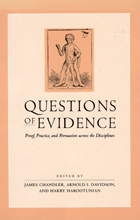 Questions of Evidence: Proof, Practice, and Persuasion across the Disciplines
Edited by James Chandler, Arnold I. Davidson, and Harry D. Harootunian
University of Chicago Press, 1994 Biologists, historians, lawyers, art historians, and literary critics all voice arguments in the critical dialogue about what constitutes evidence in research and scholarship. They examine not only the constitution and "blurring" of disciplinary boundaries, but also the configuration of the fact-evidence distinctions made in different disciplines and historical moments; the relative function of such concepts as "self-evidence," "experience," "test," "testimony," and "textuality" in varied academic discourses; and the way "rules of evidence" are themselves products of historical developments.
The essays and rejoinders are by Terry Castle, Lorraine Daston, Carlo Ginzburg, Ian Hacking, Mark Kelman, R. C. Lewontin, Pierre Vidal-Naquet, Mary Poovey, Donald Preziosi, Simon Schaffer, Joan W. Scott, Eve Kosofsky Sedgwick, and Barbara Herrnstein Smith.
The critical responses are by Lauren Berlant, James Chandler, Jean Comaroff, Arnold I. Davidson, Harry D. harootunian, Elizabeth Helsinger, Thomas C. Holt, Francoise Meltzer, Robert J. Richards, Lawrence Rothfield, Joel Snyder, Cass R. Sunstein, and William Wimsatt.
 Questions of Form: Logic and Analytic Proposition from Kant to Carnap
Joelle ProustTranslated by Anastasios Albert Brenner
University of Minnesota Press, 1989 Questions of Form was first published in 1989. Minnesota Archive Editions uses digital technology to make long-unavailable books once again accessible, and are published unaltered from the original University of Minnesota Press editions. In Questions on Form, Joelle Proust traces the concept of the analytic proposition from Kant's development of the notion down to its place in the work of Rudolf Carnap, a founder of logical empiricism and a key figure in contemporary analytic philosophy. Using a method known in France as topique comparative,she provides a rigorous exposition of analyticity, situating it within four major philosophical systems—those of Kant, Bolzano, Frege, and Carnap—and clearly delineating its development from one system to the next. Proust takes as her point of departure Kant's distinction between analytic and synthetic judgments. Though she makes clear that Kant drew on Locke, Hume, and Leibniz, she argues that his notion of analyticity was innovative, not simply an elaboration of something already found in their work. She shows that the analytic proposition unexpectedly (given its modest status in Kant) came to play an important part in efforts to convert problems considered "transcendental" into questions of belonging to formal logic. Ultimately, her comparison of their systems reveals that the concept of the analytic, however specific its rile in each, remains linked to a foundationalist strategy—in effect, to the transcendentalist questions Kant used when he reinterpreted the findings of his empiricist predecessors. Hence, this book's provocative claim: today's so-called logical empiricism owes much more to Kant's notion of science than to Hume's.
 The Questions of Milinda
Maria Heim
Harvard University Press, 2025 A Greek king and a Buddhist monk engage in a transformational philosophical dialogue.
The legendary conversation between the Greek King Milinda, traditionally identified as Menander, and the Buddhist monk Nagasena is believed to have taken place after Alexander’s campaign in India. The earliest versions of this dialogue originate from the northwestern region of the Indian subcontinent, known as Greater Gandhara, where Buddhism had taken root as early as the reign of Emperor Ashoka in the third century BCE. While the historical authenticity of this exchange remains uncertain, the dialogue—known in Pali as Milindapañha—has endured for over two millennia and is regarded as one of the most revered texts in Theravada Buddhism.
Throughout their conversation, Milinda and Nagasena explore fundamental questions about the nature of the world, kingship, and the sources of knowledge. Milinda’s probing inquiries drive the dialogue, while Nagasena offers insights grounded in Buddhist teachings, gradually transforming the Greek king from a curious skeptic into a committed Buddhist.
This edition features a modern English translation of one of the most renowned works of ancient Buddhist philosophy, alongside the original Pali text.
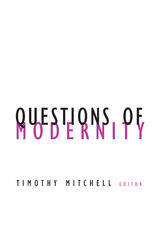 Questions Of Modernity
Timothy Mitchell
University of Minnesota Press, 2000 Well-known contributors offer an illuminating look at how modernity develops in non-Western contexts. Modernity has always laid claim to universal certainty—which meant assigning a different and lesser significance to anything deemed purely local, non-Western, or lacking a universal expression. This book makes those very non-Western, non-universal elements the tools for fashioning a more complex, rigorous, and multifaceted understanding of how the modern comes about. Focusing on the making of modernity outside the West, eight leading anthropologists, historians, and political theorists explore the production of new forms of politics, sensibility, temporality, and selfhood in locations ranging from nineteenth-century Bengal to contemporary Morocco. Topics include the therapeutics of colonial medical practice, the multiple registers of popular film, television serials and their audiences, psychiatrists and their patients, the iconic figure of the young widow, and the emergence of new political forms beyond the grasp of civil society. Contributors: Lila Abu-Lughod, Columbia U; Dipesh Chakrabarty, U of Chicago; Partha Chatterjee, Centre for Studies in Social Sciences, Calcutta; Veena Das, U of Delhi; Nicholas B. Dirks, Columbia U; Stefania Pandolfo, UC Berkeley; and Gyan Prakash, Princeton U.
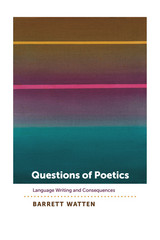 Questions of Poetics: Language Writing and Consequences
Barrett Watten
University of Iowa Press, 2016 Questions of Poetics is Barrett Watten’s major reassessment of the political history, social formation, and literary genealogy of Language writing. A key participant in the emergent bicoastal poetic avant-garde as poet, editor, and publisher, Watten has developed, over three decades of writing in poetics, a sustained account of its theory and practice. The present volume represents the core of Watten’s critical writing and public lecturing since the millennium, taking up the historical origins and continuity of Language writing, from its beginnings to the present.
Each chapter is a theoretical inquiry into an aspect of poetics in an expanded sense—from the relation of experimental poetry to cultural logics of liberation and political economy, to questions of community and the politics of the avant-garde, to the cultural contexts where it is produced and intervenes. Each serves as a kind of thought experiment that theorizes and assesses the consequences of Language writing in expanded fields of meaning that include history, political theory, art history, and narrative theory. While all are grounded in a series of baseline questions of poetics, they also polemically address the currently turbulent debates on the politics of the avant-garde, especially Language writing, among emerging communities of poets.
In manifold ways, Watten masterfully demonstrates the aesthetic and political aims of Language writing, its influence on emerging literary schools, and its present aesthetic, critical, and political horizons. Questions of Poetics will be a major point of reference in continuing debates on poetry and literary history, a critical reexamination for already familiar readers and a clearly presented introduction for new ones.
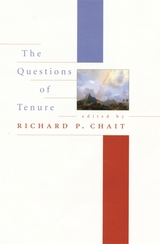 The Questions of Tenure
Richard P. Chait
Harvard University Press, 2004 Tenure is the abortion issue of the academy, igniting arguments and inflaming near-religious passions. To some, tenure is essential to academic freedom and a magnet to recruit and retain top-flight faculty. To others, it is an impediment to professorial accountability and a constraint on institutional flexibility and finances. But beyond anecdote and opinion, what do we really know about how tenure works?
In this unique book, Richard Chait and his colleagues offer the results of their research on key empirical questions. Are there circumstances under which faculty might voluntarily relinquish tenure? When might new faculty actually prefer non-tenure track positions? Does the absence of tenure mean the absence of shared governance? Why have some colleges abandoned tenure while others have adopted it? Answers to these and other questions come from careful studies of institutions that mirror the American academy: research universities and liberal arts colleges, including both highly selective and less prestigious schools.
Lucid and straightforward, The Questions of Tenure offers vivid pictures of academic subcultures. Chait and his colleagues conclude that context counts so much that no single tenure system exists. Still, since no academic reward carries the cachet of tenure, few institutions will initiate significant changes without either powerful external pressures or persistent demands from new or disgruntled faculty.
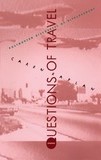 Questions of Travel: Postmodern Discourses of Displacement
Caren Kaplan
Duke University Press, 1996 Contemporary theory is replete with metaphors of travel—displacement, diaspora, borders, exile, migration, nomadism, homelessness, and tourism to name a few. In Questions of Travel, Caren Kaplan explores the various metaphoric uses of travel and displacement in literary and feminist theory, traces the political implications of this “traveling theory,” and shows how various discourses of displacement link, rather than separate, modernism and postmodernism.
Addressing a wide range of writers, including Paul Fussell, Edward Said, James Clifford, Gilles Deleuze, Jean Baudrillard, Gayatri Spivak, Edward Soja, Doreen Massey, Chandra Mohanty, and Adrienne Rich, Kaplan demonstrates that symbols and metaphors of travel are used in ways that obscure key differences of power between nationalities, classes, races, and genders. Neither rejecting nor dismissing the powerful testimony of individual experiences of modern exile or displacement, Kaplan asks how mystified metaphors of travel might be avoided. With a focus on theory’s colonial discourses, she reveals how these metaphors continue to operate in the seemingly liberatory critical zones of poststructuralism and feminist theory. The book concludes with a critique of the politics of location as a form of essentialist identity politics and calls for new feminist geographies of place and displacement.
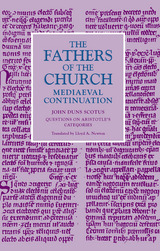 Questions on Aristotle's Categories
John Duns Scotus
Catholic University of America Press, 2014 This work is the first English translation of Scotus's commentary on Aristotle's Quaestiones super Praedicamenta. Although there are numerous Latin commentaries on Aristotle's Categories, Scotus's Questions is one of the few commentaries on the Categories written in the thirteenth century covering all of Aristotle's text, including the often neglected post-praedicamenta, and the only complete Latin commentary available in English. Moreover, unlike many of the commentaries, Scotus's text is one of the last commentaries to be written before the nominalist reduction of the categories to substance and quality. The question format allows Scotus a great deal of liberty to discuss the categories in detail, as well as matters that are only remotely raised by the text. Altogether, the forty-four questions cover the following subjects: questions 1-4 are prolegomena to the work itself and raise the question of its subject matter as well as whether there can be a science of the categories; questions 5-8 deal with equivocals, univocals, and denominatives; questions 9-11 discuss Aristotle's two rules regarding predication and the sufficiency of the categories; questions 12-36 discuss the four main categories treated by Aristotle, namely, substance, quantity, relation, and quality; and the remaining eight questions discuss the post-praedicamenta.
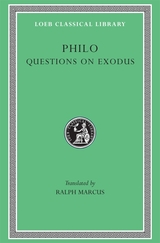 Questions on Exodus
Philo
Harvard University Press Syncretistic exegesis.
The philosopher Philo was born about 20 BC to a prominent Jewish family in Alexandria, the chief home of the Jewish Diaspora as well as the chief center of Hellenistic culture; he was trained in Greek as well as Jewish learning. In attempting to reconcile biblical teachings with Greek philosophy he developed ideas that had wide influence on Christian and Jewish religious thought.
The Loeb Classical Library edition of the works of Philo is in ten volumes and two supplements, distributed as follows. Volume I: Creation; Interpretation of Genesis II and III. II: On the Cherubim; The Sacrifices of Abel and Cain; The Worse Attacks the Better; The Posterity and Exile of Cain; On the Giants. III: The Unchangeableness of God; On Husbandry; Noah's Work as a Planter; On Drunkenness; On Sobriety. IV: The Confusion of Tongues; The Migration of Abraham; The Heir of Divine Things; On the Preliminary Studies. V: On Flight and Finding; Change of Names; On Dreams. VI: Abraham; Joseph; Moses. VII: The Decalogue; On Special Laws Books I–III. VIII: On Special Laws Book IV; On the Virtues; Rewards and Punishments. IX: Every Good Man Is Free; The Contemplative Life; The Eternity of the World; Against Flaccus; Apology for the Jews; On Providence. X: On the Embassy to Gaius; indexes. Supplement I: Questions on Genesis. II: Questions on Exodus; index to supplements.
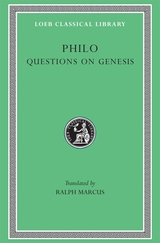 Questions on Genesis
Philo
Harvard University Press Syncretistic exegesis.
The philosopher Philo was born about 20 BC to a prominent Jewish family in Alexandria, the chief home of the Jewish Diaspora as well as the chief center of Hellenistic culture; he was trained in Greek as well as Jewish learning. In attempting to reconcile biblical teachings with Greek philosophy he developed ideas that had wide influence on Christian and Jewish religious thought.
The Loeb Classical Library edition of the works of Philo is in ten volumes and two supplements, distributed as follows. Volume I: Creation; Interpretation of Genesis II and III. II: On the Cherubim; The Sacrifices of Abel and Cain; The Worse Attacks the Better; The Posterity and Exile of Cain; On the Giants. III: The Unchangeableness of God; On Husbandry; Noah's Work as a Planter; On Drunkenness; On Sobriety. IV: The Confusion of Tongues; The Migration of Abraham; The Heir of Divine Things; On the Preliminary Studies. V: On Flight and Finding; Change of Names; On Dreams. VI: Abraham; Joseph; Moses. VII: The Decalogue; On Special Laws Books I–III. VIII: On Special Laws Book IV; On the Virtues; Rewards and Punishments. IX: Every Good Man Is Free; The Contemplative Life; The Eternity of the World; Against Flaccus; Apology for the Jews; On Providence. X: On the Embassy to Gaius; indexes. Supplement I: Questions on Genesis. II: Questions on Exodus; index to supplements.
Quetzalcoatl and Guadalupe: The Formation of Mexican National Consciousness, 1531-1813
Jacques Lafaye
University of Chicago Press, 1987 "In this study of complex beliefs in which Aztec religion and Spanish Catholicism blend, Lafaye demonstrates the importance of religious beliefs in the formation of the Mexican nation. Far from being of only parochial interest, this volume is of great value to any historian of religions concerned with problems of nativism and syncretism."—Franke J. Neumann, Religious Studies Review
Quetzalcoatl and the Irony of Empire: Myths and Prophecies in the Aztec Tradition
David Carrasco
University of Chicago Press, 1992 Davíd Carrasco draws from the perspectives of the history of religions, anthropology, and urban ecology to explore the nature of the complex symbolic form of Quetzalcoatl in the organization, legitimation, and subversion of a large segment of the Mexican urban tradition. His new Preface addresses this tradition in the light of the Columbian quincentennial.
"This book, rich in ideas, constituting a novel approach . . . represents a stimulating and provocative contribution to Mesoamerican studies. . . . Recommended to all serious students of the New World's most advanced indigenous civilization."—H. B. Nicholson, Man
Quetzalcoatl and the Irony of Empire: Myths and Prophecies in the Aztec Tradition, Revised Edition
Davíd Carrasco
University Press of Colorado, 2000 "Like J. Eric Thompson, Carrasco has applied an informed imagination to identify some of the ways that ideas could lie behind material form." - American Anthropologist "A must for both professional and serious non-professional students in Mesoamerica. Those who are interested in complex society and urbanism in general, as well as students of comparative religion, will find it stimulating. Most importantly, for anyone interested in the history of ideas, the book illuminates the tremendously powerful impact and role of a complex deity/mythico-historical figure in shaping one of the world's great pristine civilizations."
- Queen's Quarterly
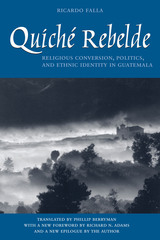 Quiché Rebelde: Religious Conversion, Politics, and Ethnic Identity in Guatemala
By Ricardo Falla
University of Texas Press, 2001 Since the arrival of the Spanish in the sixteenth century, the Maya population of Guatemala has been forced to adapt to extraordinary challenges. Under colonial rule, the Indians had to adapt enough to satisfy the Spanish while resisting those changes not necessary for survival, applying their understanding of the world to the realities they confronted daily. Despite the major changes wrought in their way of life by centuries of submission, the Maya have managed to regenerate, and thus maintain, their self-identity. Among the major challenges they have faced has been the imposition of outside religions. Quiché Rebelde examines what happened when Acción Católica came into the Guatemalan municipio of San Antonio Ilotenango, Quiché, to convert its inhabitants. Ricardo Falla, a Guatemalan Jesuit priest and anthropologist, analyzes the movement's origins and why some people became part of it while others resisted. He shows how religion was used as another tool to readapt to the changing environment—natural, economic, political, and social. His work is the first major empirical study of how change occurred in a Maya community with no serious loss of Maya identity—and how the process of conversion is related to more general processes of cultural change that actually strengthen ethnic identity.
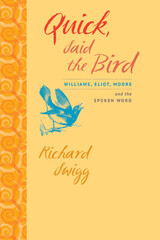 Quick, Said the Bird: Williams, Eliot, Moore, and the Spoken Word
Richard Swigg
University of Iowa Press, 2012 When William Carlos Williams said, “It’s all in / the sound,” when T. S. Eliot hailed the invigorating force of the “auditory imagination,” or when Marianne Moore applauded “the clatter and true sound” of Williams’s verse, each poet invoked the dimension that bound them together. In Quick, Said the Bird, Richard Swigg makes the case for acoustics as the basis of the linkages, kinships, and inter-illuminations of a major twentieth-century literary relationship. Outsiders in their home terrain who nevertheless continued to reach back to their own American vocal identities, Williams, Eliot, and Moore embody a unique lineage that can be traced from their first significant works (1909–1918) to the 1960s.
In reconstructing the auditory dimension in the work of the three poets, Quick, Said the Bird does not neglect the visual text. Whether in the form of Moore’s quirky patternings, Eliot’s expandable verse-frames, or Williams’s springy stanzas, the printed shape on the page is here brought together with the spoken word in vital interplay: the eye-read text cut against by sequential utterance in a restoration of the poetry’s full effect. By seeing and hearing the verse at the same moment—together with reading side-by-side discussions of the quarrels, friendships, mutual borrowings, and shared energies of Williams, Eliot, and Moore—the reader gains a remarkable new understanding of their individual achievements.By sound and sight, Quick, Said the Bird takes the reader straight into the physical textures of the finest works by three outstanding figures of twentieth-century American poetry.
Quick: Stories
T. M. McNally
University of Michigan Press, 2004 From the author of Until Your Heart Stops and Almost Home, Quick is T. M. McNally's collection of powerful and starkly honest stories of American life.
The stories in Quick are complex, sometimes harsh, yet always unafraid of the dark truths many of the characters are forced to confront. Dense and layered, these miniature and compact sagas endow their often damaged characters with uncommon brilliance. Themes of love, loss, addiction, and courage roam freely throughout, and the author sets an unforgettable and palpable tone that is exceedingly spare yet faceted with views of the richness beneath the surface of everyday life.
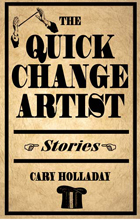 The Quick-Change Artist: Stories
Cary Holladay
Ohio University Press, 2006 In these stories of magic and memory, clustered around a resort hotel in a small Virginia community, Cary Holladay takes the reader on an excursion through the changes wrought by time on the community and its visitors. From the quiet of a rural forest to the rhythms of rock and roll, The Quick-Change Artist is at once whimsical and hard-edged, dizzying in its matter-of-fact delivery of the fantastic. Romance, a sense of place and belonging, and the supernatural—especially in the lives of children coming of age—offer windows into worlds beyond the ordinary throughout The Quick-Change Artist. In the title story, a young chambermaid is in love with a foreign magician who performs at the hotel where she works. In “Heaven,” set during the 1918 flu epidemic, a struggling mother and son rely on the support of their fortune-telling plow horse. The narrator of “Jane’s Hat” recalls a childhood enlivened by an unusual school principal and a friend who starts finding beauty everywhere. Horses and the people who love them, wanderers and those who feed them, creatures that disappear and those who search for them: these are stories with a constant heart.
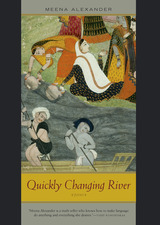 Quickly Changing River: Poems
Meena Alexander
Northwestern University Press, 2008 Recipient, 2008 Guggenheim Fellowship
With her strong voice and precise language, Meena Alexander has crafted this visceral, worldly collection of poems. The experience she brings to the reader is sensual in many senses of the word, as she invokes bright colors, sounds, smells, and feelings. Her use of vivid imagery from the natural world—birds, lilies, horses—up against that from the world of humans—oppression, slavery, and violence—ties her work to the earth even as she works a few mystical poetic transformations. In Alexander’s world, the songs of a bird can become the voice of a girl in a café and the red juice of mulberries can be as shocking as blood. When she focuses her attention on the cloth of a girl’s sari, the material of a woman’s life, or the blood in her veins, she speaks to the particular experience of women in the world. The women are vividly present—sometimes they are hidden or veiled, juxtaposed with open gardens in full bloom. It is difficult not to come away from Quickly Changing River without a new sense of the power and frailty of being alive. Aletheia (Girl in River Water) First I saw your face, The your whole body lying still Hands jutting, eyelids shut Twin nostrils flare, sheer Efflorescebce when memory cannot speak- a horde of body parts glistening.
Quicksand
Emmanuel Bove
Northwestern University Press, 1991 After the fall of France, colorless Joseph Bridet determines to go to Vichy and ingratiate himself with the regime there as a first step towards escaping to England, only to discover that he agrees with the suspicious and pitiless world of the Petainists.
Quicksand and Cactus
Juanita Brooks
Utah State University Press, 1992 Juanita Brooks became one of the best-known historians of Mormon and Utah history. Her autobiography is a valuable source of information on early southern Utah and Mormon history.
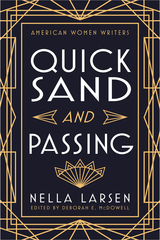 Quicksand and Passing
Larsen, Nella
Rutgers University Press, 1986 "Quicksand and Passing are novels I will never forget. They open up a whole world of experience and struggle that seemed to me, when I first read them years ago, absolutely absorbing, fascinating, and indispensable." —Alice Walker "A tantalizing mix of moral fable and sensuous colorful narrative, exploring female sexuality and racial solidarity."—Women's Studies International Forum Rutgers' all-time bestselling book, Nella Larsen's novels Quicksand (1928) and Passing (1929) document the historical realities of Harlem in the 1920s and shed a bright light on the social world of the black bourgeoisie. The novels' greatest appeal and achievement, however, is not sociological, but psychological. As noted in the editor's comprehensive introduction, Larsen takes the theme of psychic dualism, so popular in Harlem Renaissance fiction, to a higher and more complex level, displaying a sophisticated understanding and penetrating analysis of black female psychology. Passing is now a major motion picture written, produced, and directed by Rebecca Hall. It premiered at Sundance in 2021 and is available on Netflix.
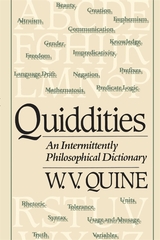 Quiddities: An Intermittently Philosophical Dictionary
W. V. Quine
Harvard University Press, 1987 The appellation “polymath” is often lightly bestowed, but it can be applied with confidence to the celebrated philosopher Willard Van Orman Quine. Quine’s areas of interest are panoramic, as this lively book amply demonstrates.
Moving from A (alphabet) to Z (zero), Quiddities roams through more than eighty topics, each providing a full measure of piquant thought, wordplay, and wisdom, couched in easy and elegant prose—“Quine at his unbuttoned best,” in Donald Davidson’s words. Philosophy, language, and mathematics are the subjects most fully represented; tides of entries include belief, communication, free will, idiotisms, longitude and latitude, marks, prizes, Latin pronunciation, tolerance, trinity. Even the more technical entries are larded with homely lore, anecdote, and whimsical humor.
Quiddities will be a treat for admirers of Quine and for others who like to think, who care about language, and who enjoy the free play of intellect on topics large and small. For this select audience, it is an ideal book for browsing.
 Quiet Armor: Poems
Stevie Edwards
Northwestern University Press, 2023 New poetry from Stevie Edwards, author of Sadness Workshop
Quiet Armor, the third full-length collection from poet Stevie Edwards, examines how capitalism and patriarchy impact romantic relationships and, more broadly, intimacy. Edwards considers the ways in which confessional performances of vulnerability can be coercive, whether popular culture encourages men to seek validation through sexual excess and aggression, and how we encourage women to be complicit in figurative and literal violence against other women.
Drawing on historical and mythological figures—including Medusa, Persephone, Shakespeare’s Lavinia, Saint Agatha, and Saint Christina—Edwards builds a fierce investigation into how rape culture has shaped the literary canon, academia, and the world at large. She brings readers into the quiet and intimate spaces we create despite trauma—or perhaps even because of it. Ultimately, Quiet Armor seeks to reclaim positive intimacy, showing us not only the desperate battles but also the healing embraces. All the while, these poems ask us: What does the end of rape culture look like? How do we get there?
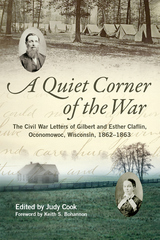 A Quiet Corner of the War: The Civil War Letters of Gilbert and Esther Claflin, Oconomowoc, Wisconsin, 1862–1863
Gilbert Claflin and Esther Claflin; Edited by Judy Cook; Foreword by Keith S. Bohannon
University of Wisconsin Press, 2013 In 2002, Judy Cook discovered a packet of letters written by her great-great-grandparents, Gilbert and Esther Claflin, during the American Civil War. An unexpected bounty, these letters from 1862–63 offer visceral witness to the war, recounting the trials of a family separated. Gilbert, an articulate and cheerful forty-year-old farmer, was drafted into the Union Army and served in the Thirty-Fourth Wisconsin Infantry garrisoned in western Kentucky along the Mississippi. Esther had married Gilbert when she was fifteen; now a woman with two teenage sons, she ran the family farm near Oconomowoc, Wisconsin, in Gilbert’s absence. In his letters, Gilbert writes about food, hygiene, rampant desertions by drafted men, rebel guerrilla raids, and pastimes in the daily life of a soldier. His comments on interactions with Confederate prisoners and ex-slaves before and after the Emancipation Proclamation reveal his personal views on monumental events. Esther shares in her letters the challenges and joys of maintaining the farm, accounts of their boys Elton and Price, concerns about finances and health, and news of their local community and extended family. Esther’s experiences provide insight into family, farm, and village life in the wartime North, an often overlooked aspect of Civil War history. Judy Cook has made the letters accessible to a wider audience by providing historical context with notes and appendixes. The volume includes a foreword by Civil War historian Keith S. Bohannon.
 Quiet Dawn
Jean-Claude Fignolé. Translated and with an Introduction by Kaiama L. Glover and Laurent Dubois.
Duke University Press, 2025 Jean-Claude Fignolé’s Quiet Dawn tells an enthralling story of Haiti’s transition from French colony to independent Black republic. The swirling, multilayered novel provides intimate portraits of an eighteenth-century slaveholder, his wife, and their enslaved laborers set against the devastating backdrop of enslavement and revolution. Into this Gothic colonial tale Fignolé interweaves a series of tragic events involving a present-day French nun doing penance for the sins of her ancestors. One of the few contemporary Haitian novels to explicitly grapple with Haiti’s revolution, Quiet Dawn foregrounds issues of race, power, the continuing legacy of historical trauma, and the unresolved tensions between the past and present. Published in French in 1990 and appearing here in English for the first time, Quiet Dawn forcefully pushes against the silencing of Haiti’s past, belying its title to depict a clamorous Atlantic world that comprises Europe, Africa, and the vast expanse of the Americas.
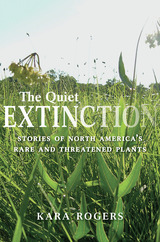 The Quiet Extinction: Stories of North America’s Rare and Threatened Plants
Kara Rogers
University of Arizona Press, 2015 In the United States and Canada, thousands of species of native plants are edging toward the brink of extinction, and they are doing so quietly. They are slipping away inconspicuously from settings as diverse as backyards and protected lands. The factors that have contributed to their disappearance are varied and complex, but the consequences of their loss are immeasurable.
With extensive histories of a cast of familiar and rare North American plants, The Quiet Extinction explores the reasons why many of our native plants are disappearing. Curious minds will find a desperate struggle for existence waged by these plants and discover the great environmental impacts that could come if the struggle continues.
Kara Rogers relates the stories of some of North America’s most inspiring rare and threatened plants. She explores, as never before, their significance to the continent’s natural heritage, capturing the excitement of their discovery, the tragedy that has come to define their existence, and the remarkable efforts underway to save them. Accompanied by illustrations created by the author and packed with absorbing detail, The Quiet Extinction offers a compelling and refreshing perspective of rare and threatened plants and their relationship with the land and its people.
A Quiet Foghorn: More Notes from a Deaf Gay Life
Raymond Luczak
Gallaudet University Press, 2022 In this collection of essays, Raymond Luczak once again offers readers powerful and deeply personal reflections on his experiences as a Deaf gay man. He begins his journey with the printed word where lipreading is not required, and discovers a family of sorts through the writings of Walt Whitman and others; he ventures deeper into the queer community with thoughts on ageism, disability, and radical faeries. Luczak explores the many nuances within the Deaf community and the audist attitudes of hearing people, particularly in the media, and takes a detour into ASL gloss poetry. He speculates on what the Deaf community will look like a century from now and ends with a long bike ride that celebrates the ongoing questions of being a Deaf gay man.
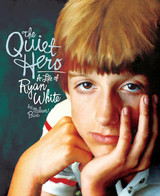 The Quiet Hero: A Life of Ryan White
Nelson Price
Indiana Historical Society Press, 2015 In 1985 the eyes of the world turned to the Hoosier State and the attempt by a thirteen-year-old Kokomo, Indiana, teenager to do what seemed to be a simple task—join his fellow classmates at Western Middle School in Russiaville, the school to which his Kokomo neighborhood was assigned. The teenager, Ryan White, however, had been diagnosed with Acquired Immune Deficiency Syndrome from contaminated blood-based products used to treat his hemophilia. “It was my decision,” White said, “to live a normal life, go to school, be with friends, and enjoying day to day activities. It was not going to be easy.”
White's words were an understatement, to say the least. His wish to return to school was met with panic by parents and some school officials. The controversy about White and the quiet courage he and his mother, Jeanne, displayed in their battle to have him join his classmates is explored in the eleventh volume in the Indiana Historical Society Press’s Youth Biography Series. The Quiet Hero is written by Nelson Price, who wrote about White’s odyssey during his days as a reporter and columnist for the Indianapolis News. Price goes behind the scenes and brings to light stories and individuals who might have been lost in the media spotlight.
After a nine-month court battle, White won the right to return to school, but with concessions. These were not enough for parents of twenty children, who responded by starting their own school. At school, White became the target of slurs and lies, and his locker was vandalized. Although the White family received support from citizens and celebrities around the world, particularly rock singer Elton John, the situation grew so controversial in Kokomo that they moved to Cicero, Indiana—a community that greeted them much differently.
In Price’s book, White, who succumbed to his disease in 1990, comes across as a normal teenager who met an impossible situation with uncommon grace, courage, and wisdom. “It was difficult at times, to handle; but I tried to ignore the injustice, because I knew the people were wrong,” White said. “My family and I held no hatred for those people because we realized they were victims of their own ignorance.”
 Quiet Magic
Sam Cook
University of Minnesota Press, 2002 A collection of essays dedicated to the awe and solitude that can only be found in nature-now in paperback! Step outside and marvel at the grand experience of the North-the power of a storm building on the greatest of the Great Lakes, the glory of Northern Lights in the shimmering night sky, the embracing, absolute silence of a snowhouse. Or stay inside with Quiet Magic and savor Sam Cook’s unique blend of sensitive portrayals and gentle humor. Starting with his discovery of one of nature’s wonders-the simplicity of a stand of reeds against a wide-open sunset-and ending with a deep appreciation for the never-ending surprises of the outdoors, Sam Cook weaves a tapestry of enchanting images of the North Woods and keeps you smiling and chuckling all the way.In this long-awaited paperback edition, Sam Cook invites you to look outward to discover the North Country, and look inward to discover yourself."A special book about a special place." Jim Brandenburg, National Geographic"An uncommonly compassionate writer, Cook is arguably Minnesota’s best-loved newspaper columnist." Minnesota Monthly"The word pictures in Sam Cook’s latest literary sketch pad are poignant reminders of the depth of wonder and enjoyment that can be drawn from every experience in nature’s world." Paul Schurke, North Pole explorer
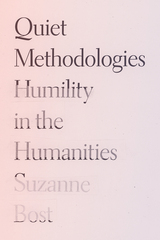 Quiet Methodologies: Humility in the Humanities
Suzanne Bost
University of Minnesota Press, 2025 Reimagining humanities scholarship with humility and inclusive attention How might foregrounding the writings of colonized peoples transform the ways we work in the humanities? In an era dominated by loud political rhetoric, Suzanne Bost advocates for quieter modes of scholarship: intellectual humility rather than ego, collaboration and conversation rather than singular argumentation, continual reflection and revision rather than defensiveness, and a willingness to believe in different ways of being and knowing rather than adhering to academic norms. With Quiet Methodologies, she demonstrates practical decolonial scholarship and proposes alternative approaches for fostering meaningful engagement. Turning to feminist, queer, and decolonial writings from Gloria Anzaldúa, Alexis Pauline Gumbs, Audre Lorde, and many others, Bost reflects on what we do when we work with literature, culture, and ideas. She weaves together multiple voices, methods of writing, and culturally diverse epistemologies and uses creative devices such as collage, her own original poetry, revision, lists, images, and conversation to disengage academic thought and writing from colonial theories and archives that have passed as neutral. Eschewing conventional monograph formats, her work embraces a reciprocal and heterogeneous learning process with profound ethical implications. Part of a movement of reimagining research and education through care, Quiet Methodologies is a powerful exploration of the possibilities of criticism during crises. It encourages readers to be visionary and pragmatic, challenging current conditions and offering alternative ideas for the future of the humanities. Retail e-book files for this title are screen-reader friendly with images accompanied by short alt text and/or extended descriptions.
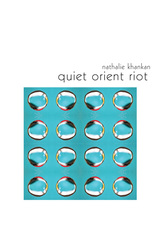 Quiet Orient Riot
Nathalie Khankan
Omnidawn, 2020 Quiet Orient Riot is an exploration of the tendons of motherhood, its mutinies and munificences. It is also a book of births and the politics of birth-regimes. Recounting a journey to bear a Palestinian child in the occupied Palestinian territory, the poems conjure up maternity as forecast, tally, weapon; its many filtrations through liturgical command and demographic anxiety. Maternity is made possible through contingent access to Israel’s sophisticated fertility treatment infrastructure, and it’s made impossible as it coincides with Israel’s 2009 assault on the Gaza Strip. What kind of language, then, can hold a body inside a body through emergency, diminishment, and into resistance and bloom? What kind of language might hold precarious humanhood?
Most significantly, Quiet Orient Riot asks of itself, without release or relief: can a text seek linguistic disorientation and reorientation both? Can a text walk the tightrope from detail to detail to envision a kind of awareness that is kin to worship? Quiet Orient Riot does not shy away from a word like “worship.” Nor does it shy away from how such worship might manifest in the words of a poem, bowing to a “chirpy printed sound” in Palestine and a forest of “little justices.”
She is the winner of the 2019 Omnidawn 1st/2nd Poetry Book Contest, chosen by Dawn Lundy Martin.
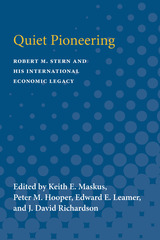 Quiet Pioneering: Robert M. Stern and His International Economic Legacy
Edited by Keith E. Maskus, Peter M. Hooper, Edward E. Leamer and J. David Richardson
University of Michigan Press, 1998 New scholarly research in important aspects of international economics is brought together in this volume. The unifying theme is that each chapter is devoted to a fresh analysis of a problem in international economics that had earlier received cogent and prescient attention by Professor Robert Stern of the University of Michigan, one of the major figures in international economic research in the second half of the twentieth century. Each chapter examines a significant issue in international trade or finance, including determinants of comparative advantage, the effects of trade restrictions and the importance of trade liberalization, aspects of international trade institutions, and monetary policy in integrated markets. Three broad areas of international economic analysis are explored. The first part of the volume is devoted to new and sophisticated empirical analyses of important policy questions, such as technical change in trade models, how nontariff barriers are established, and how patent protection affects trade flows. The second part analyzes key areas involving international trade negotiations, including the usefulness of binding tariff commitments, regionalism versus bilateralism in trade liberalization, and strategic competition among international firms in setting negotiating agendas. The final part considers important questions in labor costs, asset pricing, and monetary union in international markets. Professional international economists will find much worth reading in the volume. It also is relevant to those who study international relations and international organizations; political scientists; and government policy analysts. Keith E. Maskus is Professor of Economics, University of Colorado, Boulder. Peter M. Hooper is Assistant Director, Division of International Finance, Board of Governors of the Federal Reserve System. Edward E. Leamer is Professor of Economics and Management, University of California, Los Angeles. J. David Richardson is Professor of Economics, Syracuse University.
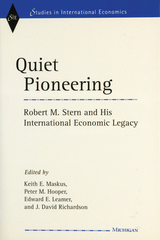 Quiet Pioneering: Robert M. Stern and His International Economic Legacy
Keith E. Maskus, Peter M. Hooper, Edward E. Leamer, and J. David Richardson, Editors
University of Michigan Press, 1997 New scholarly research in important aspects of international economics is brought together in this volume. The unifying theme is that each chapter is devoted to a fresh analysis of a problem in international economics that had earlier received cogent and prescient attention by Professor Robert Stern of the University of Michigan, one of the major figures in international economic research in the second half of the twentieth century. Each chapter examines a significant issue in international trade or finance, including determinants of comparative advantage, the effects of trade restrictions and the importance of trade liberalization, aspects of international trade institutions, and monetary policy in integrated markets. Three broad areas of international economic analysis are explored. The first part of the volume is devoted to new and sophisticated empirical analyses of important policy questions, such as technical change in trade models, how nontariff barriers are established, and how patent protection affects trade flows. The second part analyzes key areas involving international trade negotiations, including the usefulness of binding tariff commitments, regionalism versus bilateralism in trade liberalization, and strategic competition among international firms in setting negotiating agendas. The final part considers important questions in labor costs, asset pricing, and monetary union in international markets. Professional international economists will find much worth reading in the volume. It also is relevant to those who study international relations and international organizations; political scientists; and government policy analysts. Keith E. Maskus is Professor of Economics, University of Colorado, Boulder. Peter M. Hooper is Assistant Director, Division of International Finance, Board of Governors of the Federal Reserve System. Edward E. Leamer is Professor of Economics and Management, University of California, Los Angeles. J. David Richardson is Professor of Economics, Syracuse University.
|
|
